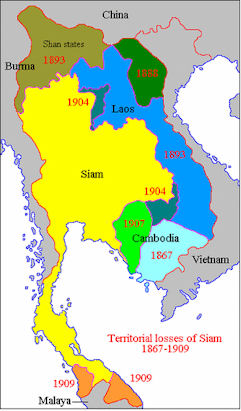

Zitierweise / cite as:
Payer, Alois <1944 - >: Chronik Thailands = กาลานุกรมสยามประเทศไทย. -- Chronik 2007 / B. E. 2550. -- 2. Januar bis Juni. -- Fassung vom 2017-03-21. -- URL: http://www.payer.de/thailandchronik/chronik2007b.htm
Erstmals publiziert: 2012-11-09
Überarbeitungen: 2017-03-21 [Ergänzungen] ; 2017-01-02 [Ergänzungen] ; 2016-11-10 [Ergänzungen] ; 2016-08-16 [Ergänzungen] ; 2016-03-17 [Ergänzungen] ; 2016-01-25 [Ergänzungen] ; 2015-04-17 [Ergänzungen] ; 2015-04-05 [Ergänzungen] ; 2015-01-20 [Ergänzungen] ; 2014-10-26 [Ergänzungen] ; 2013-10-01 [Ergänzungen] ; 2013-04-25 [Ergänzungen und Teilung des Jahrgangs]; 2013-04-21 [Ergänzungen]; 2013-04-09 [Ergänzungen]; 2013-04-03 [Ergänzungen]; 2013-03-27 [Ergänzungen]; 2013-03-17 [Ergänzungen]; 2013-03-09 [Ergänzungen]; 2013-02-27 [Ergänzungen]; 2013-02-22 [Ergänzungen]; 2013-02-17 [Ergänzungen]; 2013-02-16 [Ergänzungen]; 2013-02-05 [Ergänzungen]; 2013-01-26 [Ergänzungen]; 2013-01-13 [Ergänzungen]; 2012-11-13 [Verbesserungen]
©opyright: Dieser Text steht der Allgemeinheit zur Verfügung. Eine Verwertung in Publikationen, die über übliche Zitate hinausgeht, bedarf der ausdrücklichen Genehmigung des Herausgebers.
Dieser Text ist Teil der Abteilung
Thailand von
Tüpfli's Global Village Library
ช้างตายทั้งตัวเอาใบบัวปิดไม่มิด
|
Gewidmet meiner lieben Frau Margarete Payer die seit unserem ersten Besuch in Thailand 1974 mit mir die Liebe zu den und die Sorge um die Bewohner Thailands teilt. |
|
Bei thailändischen Statistiken muss man mit allen Fehlerquellen rechnen, die in folgendem Werk beschrieben sind:
Die Statistikdiagramme geben also meistens eher qualitative als korrekte quantitative Beziehungen wieder.
|
2007-01

Abkommen mit China: China befördert jährlich ca. 70.000 Tonnen raffiniertes Erdöl auf dem Mekong (แม่น้ำโขง / 澜沧江) von Thailand nach Yunnan ( 云南).
Abb.: Verlauf des Mekong
[Bildquelle: Michiel1972 / Wikipedia. -- GNU FDLicense]
Abb.: Yunnan Yunnan ( 云南)
[Bildquelle: CIA. -- Public domain]
2007-01-01 -
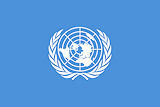
Der Koreaner Ban Ki-moon (반기문 / 潘基文, 1944 - ) ist Generalsekretär der Vereinten Nationen (UNO).
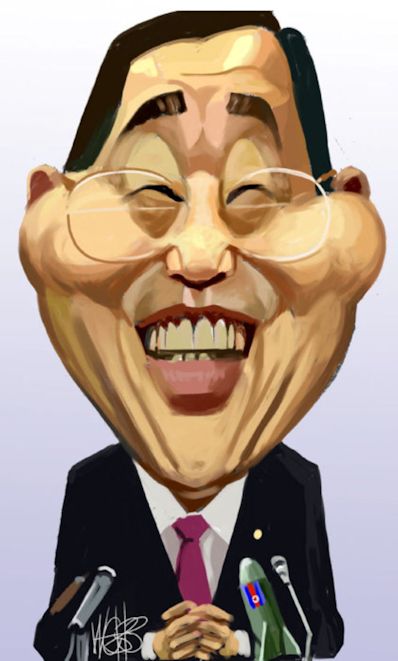
Abb.: Ban
Ki-moon (반기문
/ 潘基文)
/ von Murray Webb (1947 - ), 2006
[Bildquelle: Ban Ki-Moon. 11 October,
2006.. Webb, Murray, 1947- :[Digital caricatures published from 29 July 2005
onwards (2006, 2007, 2008). Includes a selection of digital caricatures
published from 2002 and up to July 2005.]. Ref: DCDL-0002449. Alexander Turnbull
Library, Wellington, New Zealand.
http://natlib.govt.nz/records/22856722 .
-- Zugriff am 2013-03-09. -- "You can copy this item for personal use, share it,
and post it on a blog or website. It cannot be used commercially without
permission"]
2007-01-01
In der Neujahrsnacht fünf Bombenanschläge in Bangkok und einer in Nonthaburi (นนทบุรี). 2 Tote, mindestens 15 Verletzte.
Abb.: Lage von Nonthaburi (นนทบุรี)
[Bildquelle: OpenStreetMap. -- Creative Commons Lizenz (Namensnennung, share alike)]
2007-01-09

San Francisco (USA): Vorstellung des ersten Apple iPhone. Es wird in Thailand zu einem Statussymbol.
Preise für iPhone 5 2013-10-01 GB Baht 16 24.550 32 28.250 64 31.950
2007-01-12 - 2007-02-04
2007 ASEAN Football Championship (อาเซียนฟุตบอลแชมเปียนชิพ 2007) in Singapur und Bangkok.
2007-01-17

Telegramm der US-Generalkonsulin in Chiang Mai (เชียงใหม่), Beatrice (Bea) Camp, an das US-Außenministerium:
Abb.: Lage der Provinzen Chiang Rai [เชียงราย] und Buriram [บุรีรัมย์]
[Bildquelle: CIA. -- Public domain]
1. (U) Summary: Chiang Rai's [เชียงราย] Thai Rak Thai [พรรคไทยรักไทย] connections make it the "second most suspect province" in the country, according to the provincial police chief, who claimed that vigilance has prevented the school fires and bombs that have plagued other parts of the country. Meanwhile, leaflets that appear to have originated in Chiang Rai and distributed in the northern region attack the Council for National Security [คณะมนตรีความมั่นคงแห่งชาติ] (CNS) for serving Muslim interests. End summary 2. (SBU) During a meeting with the Consul General in Chiang Rai Jan. 11, Provincial Police Commander Pol. Maj. Gen. Sutep Dechrugsa [พล.ต.ท
.สุเทพ เดชรักษา ] vigorously defended the coup, citing the corruptive effects of big money on democratic systems such as elections. Patting his back pocket he described how unnamed politicians used "capitalism" to buy elections, adding that "even the US, the best democratic system in the world, has problems; how can Thailand deal with this?"
Abb.: Sutep Dechrugsa [พล.ต.ท.สุเทพ เดชรักษา]
[Fair use]3. (SBU) Sutep said many coup supporters in Bangkok view Chiang Rai, Thailand's northernmost province, and Buriram [บุรีรัมย์] in the northeast as the top two "suspect provinces" where opposition to the CNS has the strongest hold. Chiang Rai apparently won its place in the top ranks thanks to Yongyut Tiyapairat [ยงยุทธ ติยะไพรัช, 1961 - ], who represented the district in parliament and served as one of former Prime Minister Thaksin Shinawatra's [ทักษิณ ชินวัตร, 1949 - ] key lieutenants. Coup supporters claim that Yongyut, as Minister of Natural Resources and Environment, was instrumental in countering PAD [People's Alliance for Democracy - พันธมิตรประชาชนเพื่อประชาธิปไตย] demonstrations by organizing forestry workers, allegedly undocumented migrant workers, to attack protest gatherings in Bangkok. Yongyut was detained for ten days following the Sept. 19 coup and his actions have been closely monitored since.
4. (SBU) Sutep credited police vigilance for sparing Chiang Rai from school burnings or bombs, actions that have elsewhere been seen as anti-coup protests or provocations. Calling an aide to set up a monitor, he showed visitors closed circuit TV coverage from nine spots in the city. The system cost hundreds of thousands of baht he conceded, adding that this is what is needed to stop bombings. (Although he implied that Chiang Rai was uniquely favored with the budget for this system, Chiang Mai [เชียงใหม่] has a similar set-up, installed as a traffic control measure about two years ago.)
5. (U) A TRT [Thai Rak Thai - พรรคไทยรักไทย] contact in Chiang Rai told the Consulate Jan. 16 that a series of anti-CNS leaflets have been sent to local police stations in the province claiming that the Sept. 19 coup was meant to serve Muslim interests. The leaflets and a CD, issued by the "Buddhists" and "Buddhist Monks", note that the CNS chairman and Interior Minister are Muslims and allege that the upcoming Constitution will be based on an Islamic model. According to "Manager On-Line" [ผู้จัดการออนไลน์] news service, the leaflets were first distributed Jan. 4 at a gathering in honor of revered Thai monk Khruba Boonchum [พระครูบาบุญชุ่ม] at a temple in Burma opposite Thailand's Chiang Saen/Mae Sai [เชียงแสน / แม่สาย] district. The leaflets have since been reported in Chiang Mai and Phitsanulok [พิษณุโลก] as well as in Chiang Rai.
6. (U) Bio note: Pol. Maj. Gen. Sutep Dechrugsa [พล.ต.ท.สุเทพ เดชรักษา] graduated in law from Chulalongkorn University in 1977 and earned an MPA from NIDA [National Institute of Development Administration - สถาบันบัณฑิตพัฒนบริหารศาสตร์] in the early 1980's. Since joining the Royal Thai Police in 1978 he has been posted in the Upper North, including Lampang [ลำปาง], Tak [ตาก], Lamphun [ลำพูน], Chiang Mai and Mae Hong Son [แม่ฮ่องสอน]. In Chiang Mai he served many years as chief of the Phuping [ภูพิง] Police Station, Investigation Chief for Provincial Police Region 5 Headquarters, and Deputy Provincial Police chief. He was promoted to Maj. Gen. in late 2005, becoming police chief of Mae Hong Son before being transferred to Chiang Rai the following year. Sutep is seen as a fast-rising star in Police Region 5, thanks both to his investigative skills and his close ties with the Crown Prince. Office of Narcotic Control Board contacts speak highly of him, especially his integrity and crime-busting efficiency. Sutep's wife, Kasama Dechrugsa [กษมาเดชรักษา], teaches in the Law Faculty at Chiang Mai's Payap University [มหาวิทยาลัยพายัพ].
CAMP"
[Quelle: https://wikileaks.org/plusd/cables/07CHIANGMAI9_a.html. -- Zugriff am 2015-04-05]
2007-01-18

NZZ: Tourismus: Südostasien - Abseits der touristischen Trampelpfade : Der Khao-Sok-Nationalpark (อุทยานแห่งชาติเขาสก) in Südthailand lockt mit überwältigender Natur und Abenteuern / von Heike Baldauf
Reise in eine andere Welt - Ländliche Idylle im Norden Thailands / von Andrea Spaldinger
Abb.: Lage des Khao-Sok-Nationalparks (อุทยานแห่งชาติเขาสก)
[Bildquelle: OpenStreetMap. -- Creative Commons Lizenz (Namensnennung, share alike)]
Abb.: Ratchaprapha-Stausee (เขื่อนรัชชประภา), Khao-Sok-Nationalpark (อุทยานแห่งชาติเขาสก), 2009
[Bildquelle: herr_S. -- http://www.flickr.com/photos/herr_s/4254723126/ . -- Zugriff am 2012-11-09. -- Creative Commons Lizenz (Namensnennung, keine kommerzielle Nutzung, share alike)]
2007-01-18
Premiere des ersten teils der Filmserie The Legend of King Naresuan (ตำนานสมเด็จพระนเรศวรมหาราช) von Prinz Chatrichalerm Yukol (หม่อมเจ้าชาตรีเฉลิม ยุคล, 1942 - )
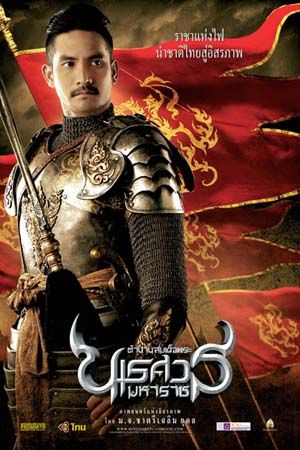
Abb.: Plakat
[Bildquelle: Wikipedia. -- Fair use]
|
"The Legend of King Naresuan (Thai: ตำนานสมเด็จพระนเรศวรมหาราช; RTGS: Tamnan Somdet Phra Naresuan Maha Rat) is a Thai biographical historical drama film about King Naresuan the Great (สมเด็จพระนเรศวรมหาราช), who ruled Siam from 1590 until his death in 1605. The films are directed by Chatrichalerm Yukol (หม่อมเจ้าชาตรีเฉลิม ยุคล, 1942 - ) and are a followup to his 2003 film, The Legend of Suriyothai (สุริโยไท) . Part I,
Hongsawadee's Hostage
(องค์ประกันหงสา)
,was
released on January 18, 2007. The films were released in the U.S. under the titles Kingdom of War. Part I deals with Naresuan's boyhood, when he was taken hostage by Burmese King Bayinnaung (ဘုရင့်နောင် ကျော်ထင်နော်ရထာ, 1516 - 1581) to keep the vassal Ayutthaya Kingdom (อาณาจักรอยุธยา) subservient. During this time, he was a novice Buddhist monk under the tutelage of a wise father-figure monk (Sorapong Chatree - สรพงษ์ ชาตรี, 1950 -). Part II depicts Naresuan as a young adult prince, already a formidable military strategist, as he leads his army on exploits against breakaway kingdoms for King Bayinnaung's successor, King Nanda Bayin (နန္ဒဘုရင်, 1581 - 1599), and eventually breaks away to declare sovereignty for Siam. Part III was to depict Naresuan's military and leadership skills and the expansion of the Siamese kingdom. In production for more than three years, the project has an estimated budget of 700 million baht, making it the most expensive Thai film made.[1][2][3] As King of Fire, part II was selected as Thailand's submission to the 80th Academy Awards for Best Foreign Language Film.[4][5] PlotPart I: Hongsawadee's Hostage (องค์ประกันหงสา) The film concerns the childhood of King Naresuan. Born in 1555, he was taken to Burma as a child hostage; there he became acquainted with sword fighting and became a threat to the Burmese empire The film begins in 1564, during the Burmese siege of Phitsanulok (พิษณุโลก), the center of the languishing Sukhothai kingdom (ราชอาณาจักรสุโขทัย). Naresuan's father, Maha Thammarachathirat (พระมหาธรรมราชาธิราช), admits defeat and follows Burmese orders that his two sons, Naresuan (nicknamed Ong Dam) and Ekathotsarot (สมเด็จพระเอกาทศรถ), be taken hostage and be raised in Pegu (ပဲခူးမြို့) (the center of the Hanthawadi (ဟံသာဝတု) kingdom) under the watchful eyes of Bayinnaung (ဘုရင့်နောင် ကျော်ထင်နော်ရထာ), the Burmese king. This creates a rift between Naresuan's father and his mother, Queen Wisutkasat, whose brother is the king of the neighboring Ayutthaya kingdom (อาณาจักรอยุธยา), as Phitsanulok is now a Burmese vassal state. Immediately after entering the Burmese palace, Naresuan sees the palace politics and rivalries between himself and Bayinnaung's grandson, Minchit . Naresuan is sent to be educated as a novice monk, by an ethnic Mon (မောန်) Buddhist monk named Khanchong (พระมหาเถรคันฉ่อง), at a Buddhist monastery outside the palace. There, while wandering the Thai village outside Pegu (made up of Thais displaced by Bayinnaung's expansionist campaigns and subsequent forced relocations to Hanthawadi), he befriends Bunthing, a Thai street child who is later allowed to work as a temple boy. He also befriends Maneechan, a temple girl at the monastery. The monk Khanchong, who had also trained Bayinnaung, teaches Naresuan the skills of war and ethics. Part II: Reclaiming Sovereignty (ประกาศอิสรภาพ)Bayinnaung dies in the beginning of the film from natural causes. Thammaracha (พระมหาธรรมราชาธิราช), the governor-king of Ayutthaya, believes it is important that he go and pay respect to the dead king out of fear that the new Burmese king Nanda (နန္ဒဘုရင်) would deem it as an insult and attack Ayutthaya. King Naresuan, however, having been raised in Pegu (the kingdom of Hanthawadi) and who regards Bayinnaung as a second father, convinces Thammaracha to let him go in his place. Upon arriving in Hanthawadi (Hongsawadi in Thai), Naresuan's childhood teacher, a Buddhist monk named Khan Chong, informs him about the dangers that king Nanda and many factions in Burma are plotting his assassination. At king Bayinnaung's funeral, all representatives from vassal kingdoms are present besides for one, the Krang kingdom (ลาวครั่ง). King Nanda sees it as a disrespect and seizes the opportunity to wage war and siege the mountain top city. Naresuan's Ayutthaya army is successful in taking the mountain top city and shows rival Burmese armies, namely of the Lord of Pyay (ပြည်မြို့) and of Minchit (the eldest son of Nandabayin), the capabilities of the Siamese force. Burmese rivals felt even more threatened by the strength and wits of Naresuan's army. During the battle, Naresuan's friend, Bunthing, falls for the princess of Krang, who becomes his companion. A plot is uncovered by Naresuan's childhood friends, two Mon rulers, that the Burmese are in fact planning the assassination of Naresuan. Upon finding out, Naresuan executes the plotters and ceremoniously declares Ayutthaya free and sovereign from Hanthawadi. King Nanda and his Burmese are furious and begin a military campaign to capture and kill king Naresuan before his forces and liberated Siamese subjects can reach the Sittoung River (စစ်တောင်းမြစ်). King Naresuan uses the strategy of a fighting retreat. His forces built a wooden bridge across the river and engage the pursuing Burmese army as they follow. Several battles took place during the crossing. However, as the Burmese forces catch up, the Siamese citizens and forces have already crossed to the other bank. The Burmese, determined to defeat the Siamese, try to pursue Naresuan's forces by crossing the river. The king is then approached by his revered Buddhist teacher, Mon monk Khanchong. Here, he is given a special musket, which is capable of firing across the river. According to history, the movie portrays king Naresuan firing the musket across the Sittaung River, and with one strike, killing the general of the Burmese army. With the general dead, Burmese forces retreated back to Hanthawadi. King Naresuan and his now independent Siamese forces head back to Ayutthaya and the king declares ; "It's not over yet, there is more work for us to do!" ยุทธนาวี)Part III was released on 31 March, 2011.[6] Part IV (ศึกนันทบุเรง)Part IV was released on 11 August, 2011.[7] Part V (ยุทธหัตถี)Part V will be released on 4. April, 2013.[8] Cast
[Quelle: http://en.wikipedia.org/wiki/King_Naresuan_%28film%29. -- Zugriff am 2013-03-25] |
2007-01-19
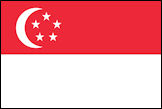
Information and Communications Technology Minister Sitthichai Pokai-udom (สิทธิชัย โภไคยอุดม, 1948 - ) beschuldigt Singapur, dass der Mobilfunkanbieter Advanced Info Service (AIS, แอดวานซ์ อินโฟร์ เซอร์วิส) und der Satellitenanbieter Shin Sat (jetzt: Thaicom - ดาวเทียมไทยคม) für Singapur Spionage betreiben. Beide Firmen gehörten teilweise Thaksin Shinawatra (ทักษิณ ชินวัตร, 1949 - ), der seine Anteile 2006 an die Singapurer Temasek Holdings verkauft hat. Der Vorwurf basiert auf der Behauptung von Putsch-General Sonthi Boonyaratglin (สนธิ บุณยรัตกลิน, 1946 - ), dass die Telefone der Militärs abgehört würden.
2007-01-26

Thailand erteilt - ohne Zustimmung des Herstellers - eine Zwangslizenz für die HIV/AIDS-Medikamente
- Kaletra® (Wirksstoff: Lopinavir) der US-Pharmafirma Abbott.
- Wirkstoff Efavirenz (Handelsnamen: Sustiva®, Stocrin®) der US-Phamfirma Bristol-Myers Squibb
Damit dürfen die Wirkstoffe Lopinavir und Efavirenz in Thailand kostengünstig hergestellt werden.
2007-02-01
Tod des Tänzers und Choreographen Seri Wangnaitham (เสรี หวังในธรรม, geb. 1937)
"Seri Wangnaitham (Thai: เสรี หวังในธรรม, January 3, 1937 - February 1, 2007, Bangkok, Thailand) was a Thai choreographer and performer of Thai traditional dance. Seri was considered a master khon (โขน) dancer, which is regarded as Thailand's highest performing art form. He was also an actor, playwright, director, songwriter, poet and television producer. He was named a National Artist (ศิลปินแห่งชาติ) in 1988.[1] Biography
Early life and career
Seri was born in Bangkok, the son of Leu and Sa-nga Wangnaitham. He was educated in the Thailand Fine Arts Department's College of Dramatic Arts (วิทยาลัยนาฏศิลป์), and in 1954 joined the department as a musical artist. He eventually became head of the music division. He received a scholarship to study fine arts at the University of Hawaii from 1962 to 1965.
In 1988, he was named a National Artist for performing arts.
Among Seri's works was the television variety show, Srisuk Nattakham, which ran for 13 years. He also produced the educational program, Singkhuanroo Kon Doo Khon (Things You Need to Know Before Viewing Khon) in 1972, which served as an introduction to khon for a new generation of Thais.
He was a regular performer at important cultural events, including a khon performance by 2,526 dancers in Sanam Luang (สนามหลวง) to celebrate the 200th anniversary of Rattanakosin island (รัตนโกสินทร์).[1]
Later worksAmong his later works was an adaptation of Thailand's national epic, the Ramayana, Ramayana Epic: the Incarnation of Rama, with 150 performers at the National Theater in 2005.[2]
In his later years, Seri suffered from heart disease, asthma and emphysema, prompting occasional hospital stays. He died at Mission Hospital after being admitted a day earlier while suffering from exhaustion following a trip to Rama II Park in Amphawa (อัมพวา), Samut Songkhram Province (สมุทรสงคราม).
Royal-sponsored funeral rites were held at Wat Tritossathep (วัดตรีทศเทพวรวิหาร) presided over by Princess Maha Chakri Sirindhorn (มหาจักรีสิรินธร, 1955 - )."
[Quelle: http://en.wikipedia.org/wiki/Seri_Wangnaitham . -- Zugriff am 2012-06-13]
2007-02-01
Premiere des Films Final Score (365 วันตามติดชีวิตเด็กเอ็นท์) von Soraya Nagasuwan (โสรยา นาคะสุวรรณ)
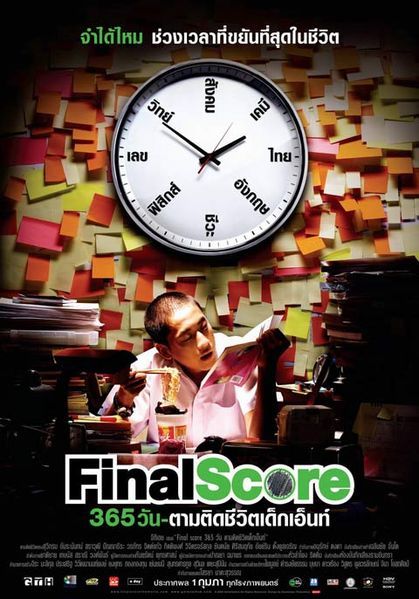
Abb.: Plakat
[Bildquelle: Wikipedia. -- Fair use]
|
"Final Score (Thai: 365 วันตามติดชีวิตเด็กเอ็นท์ or 365 Wan Tam Tid Cheewit Dek Ent) is a 2007 Thai documentary film directed by Soraya Nagasuwan (โสรยา นาคะสุวรรณ) and produced by Jira Maligool (จิระ มะลิกุล, 1961 - ). The film follows four Mattayom 6 (มัธยม 6) students for one year as they take their university entrance exams. SynopsisThe film focuses on Suwikrom "Per" Amaranon (สุวิกรม "เปอร์" อัมระนันทน์, 1988 - ), a middle class Thai student in his senior year at Suankularb Wittayalai School (โรงเรียนสวนกุหลาบวิทยาลัย)in Bangkok, and his three friends, Big Show (บิ๊กโชว์), Lung (ลุง) and Boat (โบ๊ท). They are depicted as average students, not especially studious but are still obedient of their parents and are hopeful of their prospects for getting into a university in Thailand. The film follows the boys through one year, from May 2005 to May 2006. Documentarian Soraya Nagasuwan is never heard asking the boys questions, simply letting her camera crew follow the boys through their days at school, at home with their families or enjoying time off school while on a visit to the beach and attending a rock music festival. In order to qualify for admission to a university faculty, students must take standardized tests. In Thailand these tests are the O-Net/A-Net exams. Minimum scores are needed in order to be admitted to certain universities and university faculties. Coincidentally, the February 2006 exams that the boys took were hit with a scandal after the results were incorrectly reported. Approximately 300,000 students were affected by error, with many puzzled over receiving test results when they had not even taken the tests. The boys weather the pressure of taking the exams and the erroneous reporting of the scores, however, and ultimately win their choice of disciplines and universities. Cast
[Quelle: http://en.wikipedia.org/wiki/Final_Score_%28film%29 . -- Zugriff amn 2013-03-25] |
2007-02-09
In Joh Kadee Village in Tambon Yaha (ยะหา), Yaha district (ยะหา) tauchen Flugblätter von Aufständischen auf, die Muslime davor warnen, von Buddhisten Land zu kaufen. Das Land sei Eigentum der Muslime und werde von den Aufständischen verteilt.
Abb.: Lage von Amphoe Yaha (ยะหา)
[Bildquelle: OpenStreetMap. -- Creative Commons Lizenz (Namensnennung, share alike)]
2007-02-10
Im lebua at State Tower Hotel in Bangkok treffen sich 40 Feinschmecker aus aller Welt um ein von sechs 3-Sterne-Köchen zubereitetes Dinner für 1 Mio. Baht pro Person zu verzehren.
Abb.: lebua Hotel Bangkok, 2006
[Bildquelle: Casper Moller. -- http://www.flickr.com/photos/caspermoller/3312816890/ . -- Zugriff am 2012-01-09. -- Creative Commons Lizenz (Namensnennung)]
Abb.: Lage des lebua Hotel
[Bildquelle: OpenStreetMap. -- Creative Commons Lizenz (Namensnennung, share alike)]
2007-02-17
Während der Subhanabhongsa Film Awards (รางวัลภาพยนตร์แห่งชาติ สุพรรณหงส์) erregt Chotiros "Amy" Suriyawong ("เอมี่" โชติรส สุริยะวงศ์) mit ihrer Kleidung Anstoß.
"Chotiros "Amy" Suriyawong (Thai:"เอมี่" โชติรส สุริยะวงศ์) is a Thai actress and university student. Awards Dress Controversy
During the 2007 Subhanahongsa Awards (รางวัลภาพยนตร์แห่งชาติ สุพรรณหงส์) on February 17, Chotiros wore a revealing black dress that attracted media attention, proved to be controversial and resulted in Chotiros being disciplined by her university. The ankle length dress had a 3-inch-wide (76 mm) front slit held together by seven thin strips of fabric that started at her left hip and curved upward to her cleavage, exposing a significant proportion of the Chotiros' cleavage and left half of her body.[1][2] Additionally, Chotiros told reporters that she wasn't wearing underwear under the dress.[3] However she later had to demonstrate to the university that the dress had in-sewn underwear.
A moral backlash against Chotiros and her dress arose in the days following the awards show. Somsak Techaratanaprasert (สมศักดิ์ เตชะรัตนประเสริฐ, 1970 - ), the owner of Sahamongkol Film International (บริษัท สหมงคลฟิล์ม จำกัด, Thailand's largest production house), ordered all footage of Chotiros to be deleted from his next film Suay Samurai (สวยซามูไร), saying "I don't want my actresses to dress that way. We are not a porn production house, and it goes against Thai culture." He also banned her from appearing in any of his future films. Culture Minister Khaisri Sri-aroon called her dress "very inappropriate." However, Amy was also supported by many, some of whom resented the junta's morality drive.[2] The University Rector Suraphol Nitikraipot (สุรพล นิติไกรพจน์) and Assistant Rector for Student Affairs Prinya Thewanaruemitkul (ปริญญา เทวานฤมิตรกุล) at Thammasat University (มหาวิทยาลัยธรรมศาสตร์), at which Chotiros was a senior at the Faculty of Liberal Arts, forced Chotiros to appear before a press conference with deans of the University, and made her apologize for her actions. As punishment, she was ordered to read books to blind children for 15 days, as well as perform other community services."
[Quelle: http://en.wikipedia.org/wiki/Chotiros_Suriyawong . -- Zugriff am 2006-06-07]
Der Assistant Rector for Student Affairs der Thammasat University (มหาวิทยาลัยธรรมศาสตร์), Prinya Thewanaruemitkul (ปริญญา เทวานฤมิตรกุล), ernennt "Cheer" Tikamporn Rita-apinan ("เชียร์" ฑิฆัมพร ฤทธิ์ธาอภินันท์, 1987 - ) zur Botschafterin der offiziellen Kampagne der Universität gegen Sexy-Kleidung der Studentinnen.
Abb.: Cover mit "Cheer" Tikamporn Rita-apinan ("เชียร์" ฑิฆัมพร ฤทธิ์ธาอภินันท์)
[Bildquelle: th.Wikipedia. -- Fair use]
2007-02-18/19
Bombenanschläge während des Chinesischen Neujahrsfests in Narathiwat (นราธิวาส), Pattani (ปัตตานี), Songkhla (สงขลา) und Yala (ยะลา). Sieben Tote.
Abb.: Lage von Narathiwat (นราธิวาส), Pattani (ปัตตานี), Songkhla (สงขลา) und Yala (ยะลา)
[Bildquelle: CIA. -- Public domain]
2007-02-19
Premiere des Films The Haunted Drum (เนื้อเรื่องย่อ) von Wisit Sasanatieng (วิศิษฏ์ ศาสนเที่ยง, 1963 - )
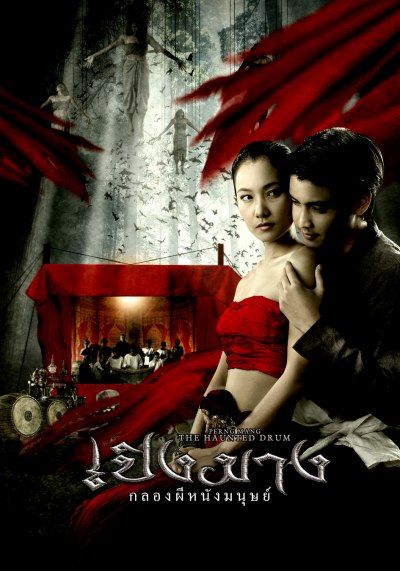
Abb.: Plakat
[Bildquelle: Wikipedia. -- Fair use]
|
"The Haunted Drum is a Thai 2007 horror drama film. PlotPing (พิง) wishes to become a musician. He becomes a student of Master Duang (ครูด้วง), a famous master musician. Master Duang owned the mysterious drum called Peung Mang, which is said to have been made by the skin of a beautiful woman named Thip (ทิพย์). Ping falls in love with a beautiful girl who teaches him how to master drum skills but she is in fact the ghost living inside the drum. Meanwhile, an arrogant musician called Muan (หมือน) tried to convince all the students to leave Master Duang. Some students died horribly. Even if Muan is defeated by Ping during a drum contest, things get worst and the drum becomes not only an instrument of music but also an instrument of death." [Cast Kett Thantup (เขตต์ ฐานทัพ, 1977 - ) as Ping (พิง) [Quelle: http://en.wikipedia.org/wiki/The_Haunted_Drum. -- Zugriff am 2013-03-25] |
2007-02-24
Beginn der Ausstrahlung der oppositionellen People's Television (PTV, บริษัท เพื่อนพ้องน้องพี่ จำกัด)
Abb.: ®Logo
"People's Television (PTV) was a Thai satellite television station. It was established by former executives of the Thai Rak Thai (พรรคไทยรักไทย) party after the 2006 Thailand military coup overthrew the Thai Rak Thai-led government. It launched despite warnings from the Council for National Security (คณะมนตรีความมั่นคงแห่งชาติ), the military junta that seized power. PTV executives insisted that if ASTV (a satellite television station run by anti-Thai Rak Thai activist and media tycoon Sondhi Limthongkul [สนธิ ลิ้มทองกุล / 林明達, 1947 -) could operate, then so could PTV.[1] PTV's inaugural broadcast on 1 March 2007 was stopped because of CAT Telecom's (บริษัท กสท โทรคมนาคม จำกัด) refusal to grant an internet link from Bangkok to a satellite up-link station in Hong Kong (香港). CAT Telecom claimed that it never received PTV's application for internet access. PTV executives claimed that CAT Chairman and junta leader Saprang Kalayanamitr (สพรั่ง กัลยาณมิตร, 1948 - ) was preventing it from broadcasting for political reasons.[2]
PTV executives led several public protests against the junta's censorship. In a demonstration on 23 March 2007 attended by 1,500-3,000 protestors, thousands of police in riot gear attempted to disperse the protest.[3][4][5] The protests caused the junta to request that the government declare emergency rule in Bangkok.
PTV was controversially shut down by Prime Minister Abhisit Vejjajiva (อภิสิทธิ์ เวชชาชีวะ, 1964 - ) in the early days of the 2010 Thailand political protests.
Leadership and visionThe new television station was led by former Thai Rak Thai Party executives Veera Musikapong (วีระกานต์ มุสิกพงศ์, 1948 - ), Jatuporn Prompan (จตุพร พรหมพันธุ์, 1965 - ), and Nattawut Saikua (ณัฐวุฒิ ใสยเกื้อ, 1975 - ), as well as former government spokesman Chakraphob Penkhair (จักรภพ เพ็ญแข, 1967 - ). Veera denied that any funding for the station came from former Thai Rak Thai party leader Thaksin Shinawatra. Thaksin lawyer, Noppadon Pattama (นพดล ปัทมะ,1961 - ) , likewise denied any involvement between Thaksin and PTV.[6]
Veera claimed that PTV aimed to serve the public by acting like "a small candle shedding the light of truth." He added that "In the past, the channels of communication that served the nation were limited, and we saw no hope for the future. If a station that helps people constructively exchange views exists, it will help the country maintain its democracy." After the 2006 Thailand coup, all other Thai television stations were censored and forbidden from reporting on the activities of Thaksin. Foreign broadcasts by BBC and CNN were also censored.
PTV is operated by Peuan Pong Nong Phi (Thai: เพื่อนพ้องน้องพี่) Co. Ltd. Peuan Pong Nong Phi was founded in 2002 by students from Ramkhamhaeng University (มหาวิทยาลัยรามคำแหง). It originally produced print media and was established with registered capital of 5 million baht. Prior to commencing broadcasting, its registered capital was increased to 50 million baht, most of the capital coming from the new management. Jatuporn Promphan claimed that further capital would be raised from the public.[7]
Legal status and controversiesBoth PTV and ASTV transmitted their programs via satellite from earth stations outside of Thailand to cable TV operators inside the kingdom. Both stations claimed that this practice allowed them to run on cable television without being subjected to the government's broadcast regulatory bodies.[8]
Minister to the Prime Minister's Office Thirapat Serirangsan (ธีรภัทร์ เสรี
รังสรรค์, 1955 - ) ordered the Director-General of the Public Relations Department to press legal charges against PTV. He insisted that no double standards were being applied. "If PTV insists on going on the air, the director-general of the Public Relations Department, as the officer in charge, will have to take legal action, just as ASTV has also been legally pursued since the last government," said Thirapat, referring to ASTV's pending court injunction. Thai Day Dot Com Co, the operator of ASTV, filed a criminal lawsuit against the Public Relations Department, alleging that it abused its powers when questioning ASTV's legal status. During the last days of the Thaksin government, the Administrative Court granted ASTV's request for an injunction to stop authorities from taking it off the air while the court is considering its petition.[6][9]Station executive Veera claimed that Article 3 of the junta's interim constitution (รัฐธรรมนูญแห่งราชอาณาจักรไทย (ฉบับชั่วคราว) พุทธศักราช 2549) guaranteed the right to engage in broadcasting all activities in accordance with the law.[1]
Former opposition and Democrat Party (พรรคประชาธิปัตย์) leader Abhisit Vejjajiva advised the junta to ensure equal treatment for both PTV and ASTV.[6]
PTV newsmen were refused press passes to Government House on grounds they had not yet accredited.[10]
Defence Minister Boonrawd Somtas claimed that the station received financial support from an "old power clique." PTV executives consistently denied they have direct links or received funding from ousted Prime Minister Thaksin Shinawatra or his Thai Rak Thai Party. PTV executives sued the Defence Minister for defamation. The executives also planned to file a civil case against General Boonrawd for 50 million baht.[11]
After a bomb was exploded outside of Chitrlada Palace (พระตำหนักจิตรลดารโหฐาน) in early May 2007, junta leader Sonthi Boonratkalin (สนธิ บุญยรัตกลิน, 1946 - ) claimed that the "old power group" was behind it, and told the press to ask PTV to learn more.[12]
ProtestsStation executives held several demonstrations in Sanam Luang (สนามหลวง)to protest the junta's ban against the station's broadcasts.[13] In one demonstration, 1,800 police in riot-gear surrounded approximately 1,500-3,000 protestors and attempted to dismantle PTV's protest stage. The operation was an implementation of security operation plan Pathaphi 149, which was designed to protect the army from public rallies.[5][14] However, the police backed off after the protesters threw plastic bottles and yelled at them. PTV executives asked the demonstrators not to attack the police.[3][4][5] Station executives vowed to stage weekly Friday rallies.[15] Junta chief Sonthi Boonyaratkalin vowed to prosecute any former Thai Rak Thai leaders if they provided financial support for the rallies.[16]
Junta chief Sonthi Boonyaratkalin requested Prime Minister Surayud Chulanont (สุรยุทธ์ จุลานนท์, 1943 - ) to declare emergency in Bangkok on 28 March 2007 in response to the protests. In an interview, he noted that the protests had so far been peaceful, but that he was afraid the movement could lead to "mutiny and chaos in the country."[17] CNS Spokesman Sansern Kaewkamnerd (สรรเสริญ แก้วกำเนิด, 1963 - ) asked, "What will we do if the numbers of protesters go beyond 100,000? It will greatly damage the country's image." Emergency powers allowed the government to ban public gatherings, impose curfews and censor local news reports.[18] Surayud did not comply with the request.
A PTV rally in Bangkok City Hall's (สภากรุงเทพมหานคร) Lan Khon Muang (ลานคนเมือง) grounds on 30 March 2007 was attended by 4,000 people. The rally proceeded under tight security.[19] The Bangkok city government positioned more than 10 municipal garbage trucks full of rotting refuse next to the protest area.[20]
Follow-on protests were planned for Sunday 7 April 2007. Defence Minister Boonrawd Somtas (พลเอกบุญรอด สมทัศน์, 1941 - ) warned that the military would not tolerate protests against the junta, and that "whoever tries to cause trouble in the country is nothing else but a traitor," adding that the PTV protesters intended to undermine harmony in the country.[21]
Junta leaders threatened a third time to declare a state of emergency due to PTV's planned protests on 27 April 2007.[22]
Protests organized by PTV and attended by PTV's executives escalated. In July 2007, Veera Musikapong led thousands of protestors in a demonstration outside the house of Privy Councilor Prem Tinsulanonda (เปรม ติณสูลานนท์, 1920 - ), claiming that he was behind the 2006 coup and the military junta. The government impeded the protests and cracked down on the protestors, wounding many. Several protestors were arrested, including Veera, an interim National Human Rights Commissioner, and a former Chief Justice of the Criminal Court.[23] Afterwards, junta chief Sonthi Boonyaratklin visited Prem to apologise for the protests on behalf of the government. One day later, Prime Minister Surayud Chulanont, along with 34 members of his Cabinet, went to Prem's house to apologize to Prem for "apologise for failing to take good care of him." Surayud accused the protestors of trying to "bring down the highest institution of the country."[24]
[Quelle: http://en.wikipedia.org/wiki/People%27s_Television. -- Zugriff am 2015-01-19]
2007-02-24
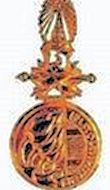
Zu National Artists (ศิลปินแห่งชาติ) werden ernannt:
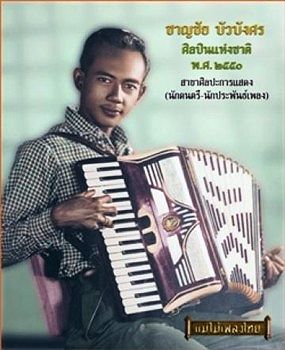
Abb.: CD-Titel von Charn Buabangsorn (ร.ท. ชาญ บัวบังศร
= ชาญชัย บัวบังศร)
[Fair
use]
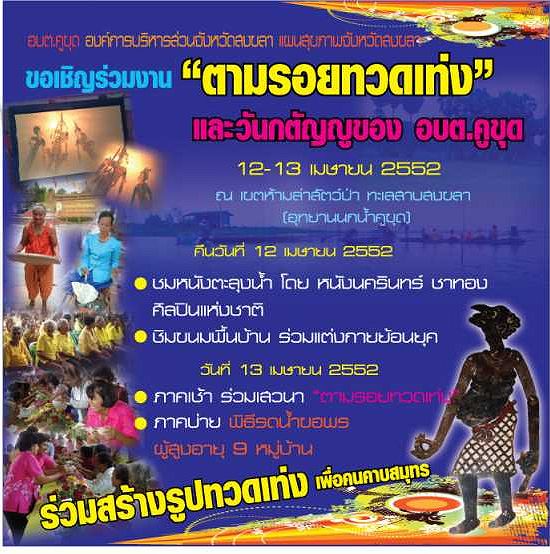
Abb.: Plaklat für eine Aufführung von Nakarin Chathong
(นายนครินทร์ ชาทอง)
[Fair use]
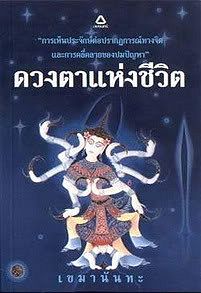
Abb.: Einbandtitel eines Buchs von Kovit Anakechai (นายโกวิท เอนกชัย
= เขมานันทะ = รุ่งอรุณ ณ.สนธยา = ฉับโผง
= สหัสนัยน์ = กาลวิง = มุนีนันทะ)
[Fair use]
2007-02-28
Vize-Ministerpräsident und Finanzminister MR Pridiyathorn Devakula (ปรีดิยาธร เทวกุล, 1947 - ) tritt unerwartet zurück.
Abb.: Pridiyathorn Devakula (ปรีดิยาธร เทวกุล), 2008
[Bildquelle: Looknarm / Wikipedia. -- GNU FDLicense]
"Mom Rajawongse Pridiyathorn Devakula (Thai: ปรีดิยาธร เทวกุล [prīːdìjāːtʰɔːn tʰēwâkūn]; born 15 July 1947) served as Minister of Finance in Thailand's interim civilian government. Before being named to the Cabinet of Prime Minister Surayud Chulanont (สุรยุทธ์ จุลานนท์), Pridiyathorn had served as Governor of the Bank of Thailand (ธนาคารแห่งประเทศไทย) since 2001. Following the September 2006 coup d'état, there was speculation that he would be appointed prime minister by the junta. Early life and education
Pridiyathorn was educated at Thammasat University (มหาวิทยาลัยธรรมศาสตร์), Bangkok, and at the Wharton Business School, University of Pennsylvania, where he gained an MBA. From 1971 to 1990 he worked for the Thai Farmers Bank, becoming Senior Executive Vice President. In 1990 he became official spokesman for Prime Minister Chatichai Choonhavan (ชาติชาย ชุณหะวัณ). In the governments of Anand Panyarachun (อานันท์ ปันยารชุน) and Suchinda Kraprayoon (สุจินดา คราประยูร, 1991–92) he was Deputy Minister of Commerce. He was appointed member of the Thai Senate (วุฒิสภาไทย) from 1992 to 1993. In 1993 he became president of the Export-Import Bank of Thailand, and in May 2001 he was appointed Governor of the Bank of Thailand (ธนาคารแห่งประเทศไทย), the nation's central bank. He is also a Director of the Civil Service Commission and of the Thammasat University Council.
Pridiyathorn holds the titles Knight Grand Cross (First Class) of the Most Noble Order of the White Elephant (เครื่องราชอิสริยาภรณ์อันเป็นที่เชิดชูยิ่งช้างเผือก) and Knight Grand Cross (First Class) of the Most Noble Order of the Crown of Thailand (เครื่องราชอิสริยาภรณ์อันมีเกียรติยศยิ่งมงกุฎไทย).
The KTB non-performing loan scandalIn 2004, the state-owned Krung Thai Bank (KTB, ธนาคารกรุงไทย) shocked Thailand's financial world by reclassifying approximately 40 billion baht as problem loans. Pridiyathorn threatened to fire KTB chief executive officer Viroj Nualkhair if he did not resign. Viroj was a former financial advisor to media proprietor Sondhi Limthongkul (สนธิ ลิ้มทองกุล / 林明達), having helped him make the initial public offering one of his first companies. As Krung Thai Bank head, Viroj had forgiven 1.6 billion baht of Sondhi's debts and arranged for further rounds of forgiveness. Using all his media outlets, Sondhi attacked Pridiyathorn and defended Viroj.
Viroj was eventually forced to leave Krung Thai Bank.
September 2006 Thailand coupTwo days after the coup which deposed Prime Minister Thaksin Shinawatra, the Bangkok newspaper The Nation reported:
- "Business leaders have called for the Council for Democratic Reform under Constitutional Monarchy to pick Bank of Thailand (BOT) Governor MR Pridiyathorn Devakula to serve as interim prime minister. Pridiyathorn has emerged as the front runner for the premiership, even though he said on Wednesday he had not been approached by the council. Council leader General Sonthi Boonyaratglin said a civilian would be picked within two weeks to become interim prime minister.
- "Bangkok Bank chairman Chatri Sophonpanich said yesterday he supported Pridiyathorn becoming the new premier. He said the new prime minister would be well received by Thais and foreigners alike if he or she had a background in economics, and that Pridiyathorn fit the criteria."
Surayud Chulanont was eventually named prime minister, but he in turn named Pridiyathorn to his Cabinet as Minister of Finance, a move that business leaders saw as positive. He was succeeded as governor of the Bank of Thailand by Tarisa Watanagase (ธาริษา วัฒนเกส), the first woman to head the BoT.
Deputy Prime Minister and Minister of FinancePridiyathorn's policies as Minister of Finance included,
- Fiscal deficits. A budget deficit of 147 billion Baht for fiscal year 2007. This was the first budget deficit since 2003 Fiscal deficits were also expected for 2008.
- Suvarnabhumi City. Pridiyathorn opposed the establishment of a new province, dubbed Suvarnabhumi City (นครสุวรรณภูมิ), around the newly constructed Suvarnabhumi Airport (ท่าอากาศยานสุวรรณภูมิ). The plan to establish a new province had been proposed by the deposed government of Thaksin Shinawatra (ทักษิณ ชินวัตร). "There are a lot of retention ponds in the area and water experts said they serve as waterways, allowing floods to flow to the sea. If there are buildings, they will obstruct water from flowing out, and cause the inner city to flood. If the Department of Town and Country Planning proposes to build a community in the area, I'll oppose it," said Pridiyathorn.
- Capital controls. Pridiyathorn instituted capital controls to attempt to reverse a strengthening of the baht, but reversed the measure after the Thai stock market crashed, destroying US$20 billion of market value in one day. Pridiyathorn later noted that “This was not a mistake. Measures always have side effects. Once we knew the side effects, we quickly fixed it.... Just one day of stocks falling is not considered much damage.” He came under harsh criticism. Bratin Sanyal, head of Asian equity investments at ING in Hong Kong noted, "The one thing worse than an incompetent central bank is an incompetent central bank that flip-flops." Catherine Tan, head of Asia Emerging Markets at Forecast in Singapore, noted, "They are proving themselves to be very unprofessional. Their actions are very irresponsible. They have totally lost credibility... I don't see foreigners returning to Thailand any time in the near future. Markets now have no confidence in the government." The Export-Import Bank of Thailand also criticized the capital controls.
- Limiting foreign companies investing in List I and II businesses (including media, telecoms, and aviation) from holding more than 50% of shares. List III businesses (including retailers and hotels) were exempted from the new restrictions. Investors holding more than 50% would be forced to lower their stakes within a year. Investors holding more than 50% of voting rights would be forced to lower their voting stakes within a year. Finance Minister Pridiyathorn noted, "If they (foreign investors) had seen the details (of the foreign investment law), I am sure that they would be happy." He later backtracked, and said that telecommunications firms would be exempt from the new regulations. He claimed that he had misspoken when he earlier included the telecommunications business into the categories to be affected by the law amendments.
- Corruption investigations into Thaksin Shinawatra. Pridiyathorn sparked controversity in his dealings with Jaruvan Maintaka (จารุวรรณ เมณฑกา) of the junta-appointed Assets Examination Committee. Jaruvan accused Thaksin's wife of inappropriately buying a plot of land from the Financial Institutions Development Fund (FIDF) while Pridiyathorn was FIDF Chairman. Pridiyathorn guaranteed that the purchase was legal and refused to file charges, claiming that the FIDF was not a damaged party. Jaruvan then claimed that Pridiyathorn violated the law by sitting on the boards of more than three state enterprises. Pridiyathorn countered by claiming that Jaruvan was trying to destroy his reputation.
- Monetary policy. Pridiyathorn took the unusual step of urging the Bank of Thailand to cut interest rates by half a percentage point, rather than 25 basis points as expected by most analysts. Bank of Thailand is independent of the Ministry of Finance, and did not heed Pridiyathorn's call. He resigned the next day.
Pridiyathorn resigned on 28 February 2007. He cited reasons for resignation included,
Premier Surayud's decision to appoint Pridiyathorn's rival, former Thaksin-government Finance Minister Somkid Jatusripitak (สมคิด จาตุศรีพิทักษ์), as a self-sufficiency economy special envoy. Somkid resigned from his position after less than a week.
Prime Minister's Office Minister Thirapat Serirangsan's alleged preference to certain private media interests. Several analysts speculated that he was referring to the preferential treatment the junta gave to leading anti-Thaksin critic Sondhi Limthongkul (สนธิ ลิ้มทองกุล / 林明達), who was also a long-time critic of Pridiyathorn.
His resignation shocked the political world as well as the business community. "The reasons he gave were quite strange," noted Pornsilp Patcharinpanakul, deputy secretary-general of Board of Trade. In turn, Pridiyathorn was replaced by Chalongphob Sussangkarn (ฉลองภพ สุสังกร์กาญจน์).
Junta leader General Saprang Kalayanamitr (พลเอก สพรั่ง กัลยาณมิตร) was also implicated in Pridiyathorn's resignation. The Bangkok Post reported that Pridiyathorn resigned in protest after a CNS member lobbied him to sell shares of IRPC (formerly known as Thai Petrochemical Industry) back to a former shareholder. Saprang's brother, Chienchuan, was a key financial advisor to Prachai Liaophairat (ประชัย เลี่ยวไพรัตน์), the estranged founder of TPI.
WealthDespite working in the civil service for over 25 years, Pridiyathorn is tremendously wealthy. Disclosures to the National Counter Corruption Commission revealed that 30 days after leaving his Cabinet position in March 2007, Pridiyathorn had 730 million baht in assets, a slight drop from 754 million baht when he took office in October 2006. His wife Praphaphan has a net worth of 283 million baht, while his daughter Pudjeep has 7 million baht."
[Quelle: http://en.wikipedia.org/wiki/Pridiyathorn_Devakula . -- Zugriff am 2012-01-09]
2007-03
"Rotten Tomatoes" wählt den Film von 2002 Ballistic: Ecks vs. Sever von Wych Kaosayananda (วิชช์ เกาไศยนันท์, 1974 - ) zum schlechtesten Film (no. 1. von "The Worst of the Worst")
Abb.: Filmplakat
[Bildquelle: Wikipedia. -- Fair use]
2007-03
Debut der Pop-Band K-Otic (เค-โอติค).

Abb.: K-Otic
(เค-โอติค), 2008
[Bildquelel: Sry85 / Wikipedia. --
Creative Commons
Lizenz (Namensnennung)]
|
"K-Otic,(เค-โอติค) is a Thai pop boy band consisting of five members; two of which are Thai-Japanese mixed and one who is Korean. The band debuted with the single, "Ya Wai Chai" (อย่าไว้ใจ) in March 2007, releasing the premier album later in October. Members
[Quelle: http://en.wikipedia.org/wiki/K-Otic. -- Zugriff am 2013-04-09] |
2007-03-01
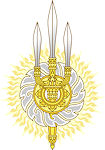
Putsch-General Sonthi Boonyaratglin (สนธิ บุญยรัตกลิน, 1946 - ) in einem Interview mit dem amerikanischen Time Magazin:
"There are many cases in which the previous government was impolite to the Royal Family and to the King himself. The Thai people cannot and will not tolerate anybody who shows even slight disrespect to the King or his family." "There was interference with many organisations, especially the independent organisations established to oversee and scrutinise the government's actions. The previous government wanted to control the whole system.
That [led to] large-scale corruption [and] vote-buying during local and general elections. The people knew about these things, and they could not accept it. As far as the army staging a coup, we could not just do it on our own. We needed the consent of the people to help us preserve democracy,"
[Zitiert in: http://www.nationmultimedia.com/2007/03/04/politics/politics_30028449.php. -- Zugriff am 2015-01-20. -- Fair use]
2007-03-03
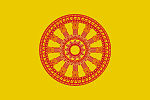
Makha Bucha (วันมาฆบูชา). Da dieses Jahr der 80. Geburtstag des Königs ist, wird auf dem Sanam Luang (สนามหลวง) in Bangkok sieben Tage und Nächte lang von Mönchen und Laien simultan das gesamte Tipiṭaka rezitiert.
Abb.: Lage des Sanam Luang (สนามหลวง)
[Bildquelle: OpenStreetMap. -- Creative Commons Lizenz (Namensnennung, share alike)]
2007-03-04

China erhöht seinen Militäretat um 17,8%.
2007-03-06

Sujin Boriharnwanaket (สุจินต์ บริหารวนเขตต์, 1927 - ) erhält den Outstanding Woman in Buddhism Award. Sie ist eine bekannte Lehrerin des orthodoxen Abhidhamma.
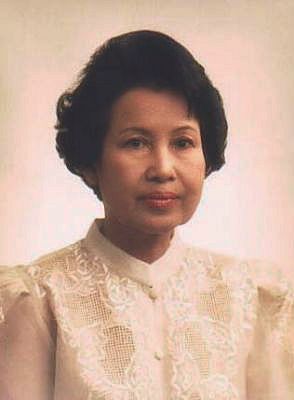
Abb.: Sujin Boriharnwanaket
(สุจินต์ บริหารวนเขตต์)
[Bildquelle:
http://www.dhammajak.net/board/viewtopic.php?t=16401.
-- Zugriff am 2013-03-27. -- Fair use]
2007-03-19
Tod von Boonchu Rojanastien (บุญชู โรจนเสถียร / 黃聞波, geb 1921).
Abb.: Boonchu Rojanastien (บุญชู โรจนเสถียร / 黃聞波), 1973
[Bildquelle: th.Wikipedia. -- Public domain]
"Boonchu Rojanastien (Thai: บุญชู โรจนเสถียร, Chinese: 黃聞波, Huang Wenbo[1] born January 20, 1921, Chon Buri Province (ชลบุรี), Thailand, died March 19, 2007, Bangkok)[2] was a Thai-Chinese banker. Touted as Thailand's first "economics tsar", he served in the government of Kukrit Pramoj (คึกฤทธิ์ ปราโมช, 1911 - 1995) in 1975 and 1976. During his tenure as finance minister, he initiated a policy of "ngern phan" (เงินผัน, money allocation), which distributed several billion baht of government funds to 5,000 tambon (ตำบล), or local government, councils.[3] His populist policies would later be embraced under the administration of Thaksin Shinawatra (ทักษิณ ชินวัตร, 1949 - ). Biography
Early life and business career
Boonchu was the eldest of five children born to a carpenter of Hainanese origin (海南人) in Chon Buri Province.[4] He married Renu Rojanastien, and had two children Krip Rojanastien and Ora Rojanastien. He excelled at school and entered Thammasat University (มหาวิทยาลัยธรรมศาสตร์), graduating with a degree in accounting. He then opened his own accounting firm, and shortly after that joined Bangkok Bank (ธนาคารกรุงเทพ). He eventually became president of the bank, from 1977 to 1980,[5] and led the institution through expansion and the establishment of branches across Thailand.[2][3]
PoliticsHe became involved in politics in 1973 under the administration of Prime Minister Sanya Dharmasakti (สัญญา ธรรมศักดิ์, 1907 - 2002). Boonchu was appointed a senator and he played a role in drafting the Constitution in 1974.
He joined Social Action Party (พรรคกิจสังคม) and was elected as an member of parliament from Prachin Buri Province (ปราจีนบุรี). This was during the short reign of Seni Pramoj (หม่อมราชวงศ์ เสนีย์ ปราโมช, 1905 - 1997), who was succeeded by his brother, Kukrit Pramoj (คึกฤทธิ์ ปราโมช, 1911 - 1995).
Under Kukrit, Boonchu served as deputy prime minister and finance minister, and he initiated his populist "ngern phan" (เงินผัน) program of doling out billions of baht to local governments.
He left politics in 1983 and returned to banking, serving as chairman of Siam City Bank, only to return to politics in 1986 as the head of the Kijprachakhom Party. The party later consolidated with other parties to form the Ekaphap Party, of which Boonchu served as deputy. He later led the Palang Dharma Party (พรรคพลังธรรม).
Boonchu eventually joined the Democrat Party (พรรคประชาธิปัตย์) and served as a cabinet member and then adviser to the first government of Chuan Leekpai (ชวน หลีกภัย, 1938 - ).
"The future of a political party hinges on its policies. Any inappropriate policies will just simply fade away," was Boonchu's famous motto.[3]
Boonchu left politics in 1998 after serving on the House Budget Committee.[6]
Later yearsBoonchu's family weathered the 1997 East Asian financial crisis. He then start the Chiva-Som International Resort and Spa in Hua Hin (หัวหิน), which at its peak, became one of the best Resort and Spa and was awarded the top resort and spa of the world.
He suffered from leukemia,[6] and was treated at Vichaiyudh Hospital in Bangkok, where he died on March 19, 2007.[3]"
[Quelle: http://en.wikipedia.org/wiki/Boonchu_Rojanastien . -- Zugriff am 2012-06-06]
2007-03-08
Premiere des Films The Bodyguard 2 (บอดี้การ์ดหน้าเหลี่ยม 2) von Petchtai Wongkamlao (เพ็ชรทาย วงษ์คำเหลา, 1965 - )
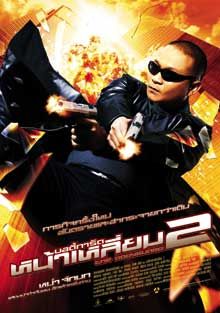
Abb.: Plakat
[Bildquelle: Wikipedia. -- Fair use]
|
"The Bodyguard 2 (Thai: บอดี้การ์ดหน้าเหลี่ยม 2) is a 2007 Thai action-comedy film written, directed by and starring Petchtai Wongkamlao (เพ็ชรทาย วงษ์คำเหลา, 1965 - ). A prequel to his 2004 film, The Bodyguard (บอดี้การ์ดหน้าเหลี่ยม), The Bodyguard 2 tells the origins of Petchtai's bodyguard character, and like the first film, it features a host of cameo appearances by Thai celebrities, including action star Tony Jaa (จา พนม, 1976 - ). With a budget of over 100,000,000 baht, the film was the most expensive in Thai cinema before Ong Bak 2 (องค์บาก 2) surpassed it in late 2008. PlotKhamlao (คำเหลา) is a secret agent for the country of Wongnaileum, which shares the common Isan dialect (ภาษาอีสาน) and culture with its neighboring country, Thailand (similar to Laos). He is dispatched to Bangkok on a secret mission to track down some terrorists. To do so, he goes undercover as a luk thung (ลูกทุ่ง) singer working for a record label that serves as a front company for dealers in weapons of mass destruction. As he probes deep inside the record company, he finds that the company's executive secretary is actually a CIA agent, assigned to the same mission. Meanwhile, Khamlao's wife, Keaw (เขียว), discovers that Khamlao had lied to her about his job in Thailand. The end of the film leaves where the first film starts. Cast
[Quelle: http://en.wikipedia.org/wiki/The_Bodyguard_2 . -- Zugriff am 2013-03-25] |
2007-03-08
Premiere des Films Haunting Me (หอแต๋วแตก) von Poj Arnon (พจน์ อานนท์)
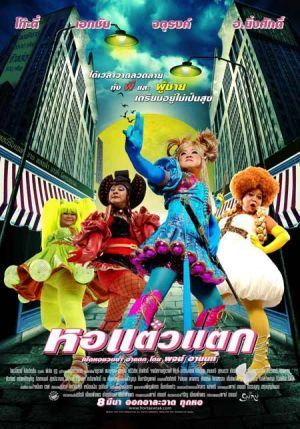
Abb.: Plakat
[Bildquelle: Wikipedia. -- Fair use]
|
"Haunting Me (Thai: หอแต๋วแตก, or Hor Taew Tak) is a 2007 Thai horror-comedy film directed by Poj Arnon (พจน์ อานนท์). SynopsisJay-Taew (เจ๊แต๋ว), Cartoon (เจ๊การ์ตูน), Mot-dum (มดดำ) and Songkram are four aging katoey (กะเทย, drag queens) who run a boarding house for boys in provincial Thailand. After helping to cover up the mysterious deaths of "Pancake" (แพนเค้ก) and Num-Ning (น้ำนิ่ง), two local teens, their spirits begin to haunt the dormitory, forcing the "girls" to try all sorts of crazy schemes to get rid of the ghosts. Eventually, they realize that the only way to do this is to help the ghosts to avenge their deaths. Cast
[Quelle: http://en.wikipedia.org/wiki/Haunting_Me . -- Zugriff am 2013-03-25] |
2007-03-20
Die Provinzen Chiang Rai (เชียงราย), Mae Hong Son (แม่ฮองสอน) und Chiang Mai (เชียงใหม่) werden zu Katastrophen-Gebieten erklärt: infolge anhaltender Waldbrände ist die Luft voller Feinstoffpartikel, die bei vielen Atemwegsbeschwerden auslösen.
Abb.: Lage der Provinzen Chiang Rai (เชียงราย), Mae Hong Son (แม่ฮองสอน) und Chiang Mai (เชียงใหม่)
[Bildquelle: CIA. -- Public domain]
Abb.: Smog, Provinz Chiang Rai (เชียงราย), 2007-04-07
[Bildquelle: David Yttervik Seetiangtham. -- http://www.flickr.com/photos/seekabul/454981431/ . -- Zugriff am 2012-04-26. -- Creative Commons Lizenz (Namensnennung, keine kommerzielle Nutzung, keine Bearbeitung)]
2007-03-22
Premiere des Films The Sperm (อสุจ๊าก) von Taweewat Wantha (ทวีวัฒน์ วันทา)
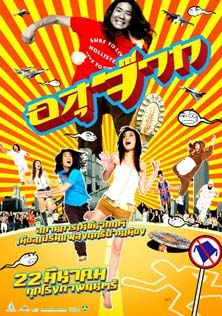
Abb.: Plakat
[Bildquelle: Wikipedia. -- Fair use]
|
"The Sperm (Thai: อสุจ๊าก, or Asujaak) is a 2007 Thai science fiction comedy film directed by Taweewat Wantha (ทวีวัฒน์ วันทา). PlotA young, struggling Bangkok rock musician, Sutin (สุทิน), constantly dreams about having almost sex with sexy model-actress La-mai (แลมมี่), but always wakes up before he can actually have sex. When he wins a chance to appear in a battle of the bands contest, and La-mai presents the prize, he is not sure he is dreaming, so he crudely propositions La-mai on live television. Embarrassed by what he's done, Sutin proceeds to go out to dinner with his bandmates and become very intoxicated. Later that night, he masturbates in front of a poster of La-mai, and then the next day thousands of women in the city become pregnant. The women then give birth to abnormal, fast-growing babies that all look like Sutin. Observing the proceedings is a scientist, Dr. Satifeung (ด็อกเตอร์สติเฟื่อง), and assisted by his daughter, he tries to come up with a way to stop the "look alike gang", but soon there are bigger problems. Cast
[Quelle: http://en.wikipedia.org/wiki/The_Sperm. -- Zugriff am 2013-03-26] |
2007-03-23

Bericht von US-Botschafter Ralph “Skip” Boyce (1952 - ) an das State Departement in Washington DC:
| "SUBJECT: THAILAND'S NEW SECURITY STRUCTURE: BETTER LIVING
THROUGH ISOC
[...] THE BEAST THAT WOULDN'T DIE2. (C) ISOC's [Internal Security Operations Command - กองอำนวยการรักษาความมั่นคงภายในราชอาณาจักร] roots lie in the Communist Suppression Operations Command (CSOC) of the 1960s. CSOC was established under the Anti-Communist Activity Act to provide Ministry of Defense (MOD) [กระทรวงกลาโหม] coordination for military, police and Ministry of Interior (MOI) [กระทรวงมหาดไทย´] operations against the communist movement in Thailand. A series of military governments in that era also used CSOC--in 1969 renamed ISOC--to facilitate their rule, including the bloody suppression of student-led protests in 1976. 3. (C) By the 1980s, with the dissolution of the communist threat and Thailand's move towards increased democratic governance, ISOC was an organization without a mission. While ostensibly having oversight over border areas that were still under martial law--in effect giving the Royal Thai Army (RTA) [กองทัพบกไทย], which dominated the ISOC structure, precedence in those areas--ISOC became a dumping ground for generals without portfolio. 4. (C) In 1999, then-PM Thaksin [ทักษิณ ชินวัตร, 1949 - ] dissolved the old ISOC and re-instituted it as a coordinating body formally charged with defending Thailand's borders and fighting illegal narcotics. Under this new formula, the PM served as head of ISOC, which was no longer subordinate to MOD. Thaksin's Deputy PM, Chawalit Yongchaiyudh [ชวลิต ยงใจยุทธ, 1932 - ] tried to push passage of a new internal security act, which would give ISOC personnel (Note: soldiers, police and civilians on rotation to ISOC. End Note.) broader domestic security powers, but the law inspired political opposition and died. ISOC briefly reappeared in the news in 2006, after several RTA officers serving in ISOC slots were implicated in the alleged car-bomb attempt on then-Prime Minister Thaksin. WE CAN REBUILD IT. STRONGER, FASTER... 5. (C) Following the September 19, 2006 coup, leaders on the Council on National Security (CNS) [คณะมนตรีความมั่นคงแห่งชาติ] began to publicly propose reinvigorating the old ISOC, ostensibly to better coordinate operations in the restive South and to deter public "undercurrents;" for example, school-burnings attributed to pro-Thaksin supporters in the countryside, which GEN Sonthi [Sonthi Boonyaratglin - สนธิ บุญยรัตกลิน, 1946 - ] has called "domestic terrorism." Given Sonthi and his allies' penchant for invoking the successes of the anti-Communist campaign, and the need to apply the lessons learned back then, this made sense. In an October 2006 order, interim PM Surayud Chulanont reorganized ISOC, placing RTA and CNS Chief Sonthi Boonyaratglin in charge. ...THE MONSTER IS ALIVE! 6. (C) Despite having existed on paper in this new incarnation for nearly five months, the exact nature and role of ISOC remains publicly unclear. Critics have publicly labeled ISOC a power grab by the Army, or an attempt to institutionalize military governance. One subset of this criticism alleges that the new ISOC will allow the CNS to maintain control even after a democratic government is elected later this year. Local media has also reported variations on the rumor that ISOC will have its own pool of personnel--separate from Army or civilian bodies on loan from other ministries--ranging from a few hundred to tens of thousands. Several press reports focused on an alleged proposal by GEN Sonthi to establish an ISOC "Special Operations Command," with as many as 60,000 personnel at its disposal. 7. (C) RTG leaders have not added much clarity to the debate over ISOC, with conflicting public statements over the new organization. Some have characterized ISOC as similar to the U.S. Department of Homeland Security (DHS) with others denying that the new organization will absorb other agencies as DHS did. "LIKE MOVING A MOUNTAIN"
9. (C) Surapong bemoaned the difficulty the RTG has in coordinating responses to these challenges--given the host of rival agencies and organizations with overlapping responsibilities and resources. In the Thai cultural context, effective coordination depends on face-to-face contact and personal relationships, which means that relevant agencies must be brought together in an institutionalized manner to produce results. Surapong added that fixing this problem is even harder, saying, "changing the government structure is like moving a mountain." Past attempts to rectify these shortcomings led to ad-hoc fixes that failed to produce effective coordination. For a given problem, a temporary working group was established. But that working group often focused on the interests of whichever ministry or department led the effort, leading to suboptimal results. Surapong admitted that the Army effectively dominates the current ISOC structure. HOW ISOC WORKS 10. (C) Surapong explained that the Thai National Security Council (NSC) [คณะมนตรีความมั่นคงแห่งชาติ] will continue to formulate policy, but "NSC is only 100 people." ISOC will serve as "the eyes and ears of NSC" in implementing that policy. He emphasized that the vast majority of people working for ISOC, were dual-hatted, i.e. serving in other staff positions in their parent career service, but responsible for attending ISOC coordinating meetings. Surapong dismissed press reports that anywhere from 60,000 to one million civil servants worked for ISOC, saying that this number reflected personnel serving in their career ministries, sitting in their "old jobs," but with new responsibilities under ISOC. When asked if Thai leaders, in comparing ISOC to the U.S. DHS [Department of Homeland Security], envisioned a similar merging of individual agencies under one new ministry, Surapong appeared somewhat surprised by this concept, and denied any such plan. 11. (C) In explaining ISOC's structure, Surapong emphasized that it is different from the "old" ISOC. The only full-time ISOC body is a coordinating center in Bangkok with representatives from 22 ministries and 10 independent agencies. This center serves as a clearing house for information and allows RTG [Royal Thai Government] leaders to coordinate policy implementation. The center is supplemented by separate, regular meetings of inter-agency officials on specific issues of concern. CNS [Council for National Security - คณะมนตรีความมั่นคงแห่งชาติ] and RTA [Royal Thai Army - กองทัพบกไทย] Chief Sonthi serves as ISOC commander, with RTA Chief of Staff Montri [Montri Sangkasub - มนตรี สังขทรัพย์, 1949 - ] as secretary-general. Eight deputy ISOC SIPDIS commanders--representing the Army, Air Force, Navy, Marines, Supreme Command, Police, Ministry of Interior and Ministry of Justice--serve under Sonthi. The four chiefs of each Army region concurrently serve as ISOC regional commanders, with Army subordinates in each province serving as provincial ISOC commanders. (Note: this appears to have had the most impact in the restive South, where ISOC is technically in charge of the reconstituted Southern Border Provinces Administration Center (SBPAC) [ศูนย์อำนวยการบริหารจังหวัดชายแดนภาคใต้] and the Civilian-Police-Military Task Force 43, although the SBPAC legally reports directly to the PM [Prime Minister]. Surapong was unable to explain this contradiction, which we understand has further muddled the already confused chain of command in the South. End Note.)
DEPUTY GOVERNORS? 12. (C) When asked about GEN Sonthi's proposal to place Army officers as deputy governors in each province--which has been publicly criticized as an Army power grab--Surapong was dismissive, saying that such critics don't "get the whole picture." He characterized the proposal as similar to placing U.S. National Guard liaison officers in each U.S. statehouse. As Surapong explained, the Army is traditionally responsible for a host of non-traditional security issues, particularly in border areas. For example, during seasonal flooding or forest fire outbreaks, the Army is responsible for mobilizing the government's response. Surapong cited his personal experience with the difficulty in coordinating the Army relief efforts--Governors (who are MOI [Ministry of Interior - กระทรวงมหาดไทย] careerists) often call Army headquarters in Bangkok asking "what do I do?" Surapong says that the new system will allow for swifter and smoother responses to these issues; "it may save lives." He added that the police and other ministry representatives serve in the governors' offices, "why not the military?" Besides, he continued, the officer filling the deputy governor slot would have no troops under his control "just a car and a driver." Surapong says that he understands that some local politicians are concerned that an ISOC deputy governor could serve "as a check on them," but added "if local politicians don't do anything wrong, this shouldn't be a problem." (Note: we have seen no actual progress in implementing this plan outside of the South--where ISOC deputy governors appear to be in place. Expanding this program throughout the country is likely to remain controversial. End Note.) SO, HOW'S IT WORKING? 13. (C) When asked what, if any issues, ISOC has achieved success on, Surapong admitted none, saying that ISOC was only in its "beginning stages." According to Surapong, initial ISOC meetings are improving the coordination of information flows--he also hopes to develop a central database for sharing reports--but has not led to much action. Surapong admitted that most of the RTG [Royal Thai Government] still depends on hard copy reports, and that sharing information--even at the ground level in the South--remains difficult. Alluding to the New Year's Eve bombings and subsequent threat rumint leaked to the press, PolCouns [political counselors] asked if ISOC was playing a role in vetting and circulating threat information. Surapong replied in the affirmative, but added that some senior officials "talked too much." Such information is "difficult to filter," according to Surapong. NEW SECURITY LAW 14. (C) Surapong confirmed that ISOC operates under a Prime Minister's order and that officials are currently discussing whether Thailand needs a law establishing ISOC and its authorities (see ref for PM Surayud's comment to the Ambassador that just such a law is in the works.) When pressed for hypothetical examples of these new authorities, Surapong described a scenario where military personnel discovered some illegal immigrants. The ISOC structure would facilitate coordination with the police and immigration authorities to ensure their arrest. Surapong emphasized that even under the new system, soldiers would not have powers of arrest. "That is not our job." Instead, Surapong repeatedly cited the need for adequate legal "protection" for military officers serving on the border. COMMENT 15. (C) Surapong certainly did his best in trying to portray ISOC as a much needed effort to improve RTG policy coordination and implementation. Everyone agrees that breaking down stovepiping, particularly in the South, is long overdue. Much of the more sinister rumint surrounding the new organization--secretive special operations groups and the like--appears to be false. But there is no doubt that the PM's order re-engineering ISOC gives the Army greater authority over internal security enforcement than it has had in the recent past, and that will be cause for concern for many Thai. How ISOC's expansion is codified in law, and whether these new powers are used in a responsible manner, will remain key issues for debate in the coming months. This, as in so many other initiatives undertaken by the interim government, may prove impossible to implement. BOYCE" [Quelle: http://wikileaks.org/cable/2007/03/07BANGKOK1754.html . -- Zugriff am 2013-02-21] |
2007-03-29
Premiere des Films Alone (แฝด) von Banjong Pisanthanakun (บรรจง ปิสัญธนะกูล) und Parkpoom Wongpoom (ภาคภูมิ วงศ์ภูมิ)
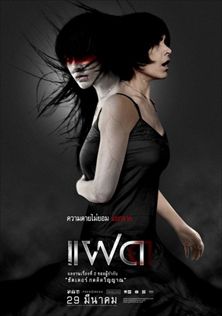
Abb.: Plakat
[Bildquelle: Wikipedia. -- Fair use]
|
"Alone (Thai: แฝด, or Fad, literally "twin") is a 2007 Thai horror film directed by Banjong Pisanthanakun (บรรจง ปิสัญธนะกูล) and Parkpoom Wongpoom (ภาคภูมิ วงศ์ภูมิ), a duo whose debut film, Shutter (ชัตเตอร์ กดติดวิญญาณ), 2004), was a box-office smash in Thailand and other Asian countries. Alone stars Thai-German pop singer Marsha Wattanapanich (มาช่า วัฒนพานิช, 1970 - ) in her first film role in 15 years.[3]' PlotPim (พิม) was born as a twin, conjoined at the stomach with her sister, Ploy (พลอย). Pim was very sweet and protective of Ploy. However, it was Ploy who threw rocks at a group of children who were taunting them. While they were staying in a hospital, Pim and Ploy met a boy named Wee (วี). Although both loved him, Wee only returned Pim's affections, which made Ploy angry and jealous. Finally Wee recovers from his illness and was able to leave. As he is getting into the car, Wee decided he wanted to see Pim one last time. Since the twins' room was on the second floor, he decides to call to her. As much as Pim wants to see Wee, Ploy would not get out of bed. Wee is upset and leaves. Angry and in tears, Pim demands that she and Ploy be separated. The twins had an operation to separate them, but Ploy did not survive. Several years later Pim, who is now living in South Korea and is dating Wee, receives a phone call from Thailand that her mother has had a stroke. When Pim and Wee return to Thailand, Ploy comes back to haunt her. Curious, Wee looks into Pim's family affairs. In a stroke of irony, Wee learns that Pim is actually Ploy. Revealed in a flashback, Ploy strangled Pim in a jealous rage after Pim demanded they be separated. In order to save Ploy's life, doctors had to amputate Pim's corpse from Ploy. Ploy assumed Pim's identity in order to be with Wee. Throughout the film, Pim's ghost was actually trying to tell Wee the truth. Ploy's mother knew of her actions as well, and tried to tell him but was unable to talk due to her weakened state. After confronting Pim, Ploy takes Wee hostage, but not before killing her mother. However, Wee escapes, and the ensuing fight with Ploy causes the house to catch on fire. Wee escapes, but a shelf falls on Ploy. Trapped underneath, Pim's ghost confronts and holds her down, taking Ploy with her as burning debris rain down around them. In the end, Wee visits the twins' grave, apologizes, and places a necklace on their tombstone. Box officeLike Pisanthanakun and Wongpoom's previous film Shutter, Alone opened at #1 at the Thai Box Office grossing $960,000 before falling to #2 grossing $411,043. In total the film grossed $2,040,003 in Thailand becoming the 21st highest grossing film of the year. The film fared even better internationally grossing $9,365,071 worldwide out grossing the directors' previous film Shutter.[2] Cast
The closing credits feature a song by Marsha Wattanapanich มาช่า วัฒนพานิช, 1970 - ) , "Suan Neung Khong Chan (ส่วนหนึ่งของฉัน - A Part of Me)". [...] Remakes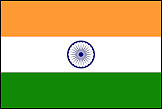 The Indian remake rights has been acquired by Global One Studios, Chennai (சென்னை) and it was shot in Kannada, titled Chaarulatha. The Kannada version of the movie was dubbed into Telugu and Tamil version into Malayalam. Name of the movie remains the same in all the four languages. It is also being planned in Hindi."
[Quelle: http://en.wikipedia.org/wiki/Alone_%282007_film%29 . -- Zugriff am 2013-03-25] |
2007-03-29

Tod des Thaiisten Henry Ginsburg (geb. 1940).
Abb.: Einbandtitel
"Henry Ginsburg (* 5. November 1940 in New York; † 29. März 2007 in London) war Kurator für südostasiatische Manuskripte an der British Library und der führende Experte für thailändische Literatur. Leben
Henry Ginsburg war das Kind der prominenten Kunsthändler Benjamin und Cora Ginsburg in New York, die russisch-jüdischer Abstammung waren. Schon in seiner Jugend war Henry ein versierter Pianist, der sogar mit dem Gedanken spielen konnte, dieses Fach professionell zu betreiben.
Nach dem Besuch der Tanytown High School in New York studierte Ginsburg Russisch an der Columbia-Universität und diente anschließend am American Peace Corps in Thailand. Hier lehrte er die englische Sprache in Chachoengsao, in der Nähe von Bangkok. Er verliebte sich in dieses Land und seine Kultur, was dazu führte, dass er der Musikerkarriere den Rücken kehrte und ein Doktoratsstudium der thailändischen Literatur an der School of Oriental and African Studies in London aufnahm.
1967 zog er nach Großbritannien und arbeitete am Britischen Museum als Assistent für die Sammlung thailändischer Literatur. Als die British Library 1973 eine unabhängige Einrichtung wurde, ernannte man Ginsburg zum Kurator der thailändischen und kambodschanischen Sammlungen. Sein Teilzeit-Vertrag ließ ihm dabei genügend Zeit zur Verfolgung eigener Forschung und - in geringerem Maße - zur Sammlung und zum Handel thailändischer und europäischer Manuskripte und Stoffe. In den Siebziger Jahren lehrte er auch an der University of California, Berkeley.
Im Juli 2006 wurde Ginsburg britischer Staatsbürger, ohne seinen US-amerikanischen Pass abzugeben[1].
WerkGinsburg verfasste das erste westliche Werk über die Malerei in der thailändischen Literatur (Thai Manuscript Painting, 1989), die vorher nur wenig untersucht worden war. Teile der Sammlung des Britischen Bibliothek wurden 1996 in Bangkok im Thailand Kulturzentrum ausgestellt und später von Ginsburg in seinem Werk Thai Art and Culture : historic manuscripts from Western collections (2000) beschrieben."
[Quelle: http://de.wikipedia.org/wiki/Henry_Ginsburg . -- Zugriff am 2012-06-18]
2007-04-03
Siriporn Thaweesuk (ศิริพร ทวีสุข = Samson Sor Siriporn - แซมซั่น ส. ศิริพร, 1983 - ) besiegt Ayaka Miyano und wird damit Damen-Boxweltmeisterin des World Boxing Councils im Leichtfliegengewicht. Siriporn ist noch inhaftiert. Sie war als 17jährige wegen Drogenhandels zu zehn Jahren Haft verurteilt worden und lernte im Gefängnis boxen. Am 2007-06-13 wird sie vorzeitig aus der Haft entlassen.
2007-04-03
Die Indie-Punk-Rockband Mhee Noi (หมีน้อย) veröffentlicht gesellschaftskritische Lieder auf myspace.com.
|
"Mhee Noi (Thai: หมีน้อย) are a Thai indie punk rock band from Bangkok, formed in 2004. They have released five singles on myspace and play live. Early careerBefore becoming one of the members of Mhee Noi, Ling decided to promote the songs he wrote and do something completely new and different. In 2004, he formed a band called Dek-Lek (เด็ก-เล็ก) project with other 4 members: Noob, Vivorn, Atom, Yingyod to participate in a music contest at their school. However the result was unsuccessful because such rude words in their songs were unacceptable. In 2005, Noob and Ling decided to change their style of music to Rock with two new members, Vee and Joe. They then decided to change the name of the band to Anti-All and participated in their school's Music contest again while Atom left to formed the new band with Petch, his friend called Geub Jazz. In 2006, Noob went to United States for study aboard. Due to his departure, the band split. Ling continued to accumulate musical knowledge and experience from his previous band, spending time improving his musical skills and his song-writing ability. That same year, Geub Jazz surprisingly by awarded first prize in their music school contest while Petch was treated in sanatorium for mental illness. Reunion, Formed Mhee NoiIn 2007, Noob returned to Thailand. He came up with the idea to write songs critiquing the Culture of Thailand and Thai society so he formed a new band consisting of Ling, Atom, Petch and himself. They wrote 'severe' songs full of sarcasm and irony reflecting the reality of Thai society. This band, therefore, is called Mhee Noi.[1] Controversies on songs and publicIn April 2007, Mhee Noi first released their songs in myspace.com.[2] The first song released was the song named "Diet Coke" the song is about the corruption in Thai Police Society, and then followed by a popular song named "Wat Pantip" (วัดพันธ์ทิพย์) which has been greatly criticized controversy because of its inappropriate meaning about the Bhikkhu in bad behaviour. "Vegetarian" (แดกหมู) is the song about the terrorism on Southeast Asia may refer to Islamic terrorism. The next single, "Land of Shit" (ควยประเทศเหี้ย) presented about vandalism, Poverty, Political corruption, The Riots from the P.A.D. and the NUFDA all happened in Thailand. all of those songs are so critical that Mhee Noi has undoubtedly been blamed for their unacceptable song and disgrace to mainstream. PresentWithout concerning with any critical comment on their songs, Mhee Noi has still been making mainstream friendly songs as well as severity like always in order to satisfy themselves and the listeners such songs as "Nerd", "Mirror". In November, In Fat Festival 7, Mhee Noi combined Wat Pantip into album named Mind The Gap, containing various songs from different independent artists and this album has been available on the internet for free downloads in a name, My Ass Hurts, But My Hua-Jai Loves It. Members
[Quelle: http://en.wikipedia.org/wiki/Mhee_Noi. -- Zugriff am 2013-04-09] |
2007-04-03

Unterzeichnung eines Freihandelsabkommens mit Japan. Es hatte Proteste gegeben, dass die Regierung damit ihre Kompetenzen, die sie gemäß der Interims-Verfassung hat, überschreitet.
Abb.: Japan
[Bildquelle: CIA. -- Public domain]
2007-04-04

Das Information and Communications Technology Ministry sperrt den Zugang zu YouTube wegen lèse-majesté (Majestätsbeleidigung). Zuvor hatte sich Google, der Eigner von YouTube, geweigert, Video-Clips zu entfernen, die den König angeblich beleidigen. Nach der Sperrung knickt YouTube ein und sagt Hilfe bei der Sperrung der inkriminierten Videos zu. Daraufhin wird die Sperrung von You Tube für Thailand am 30. August aufgehoben.
Abb.: ®Logo
[Bildquelle: Wikipedia]
2007-04-05
Premiere des Films Ma-Mha (มะหมา 4 ขาครับ) von Pantham Thongsang (พันธุ์ธัมม์ ทองสังข์) und Somkiet Vituranich (สมเกียรติ วิทุรานิช)
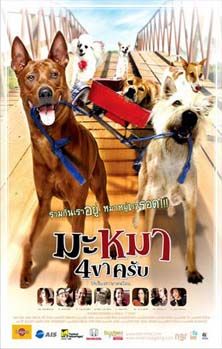
Abb.: Plakat
[Bildquelle: Wikipedia. -- Fair use]
|
Ma-Mha (Thai: มะหมา 4 ขาครับ, or Ma-Mha 4 Ka Krub, also Mid-Road Gang) is a 2007 Thai comedy-drama film directed by Pantham Thongsang (พันธุ์ธัมม์ ทองสังข์) and Somkiet Vituranich (สมเกียรติ วิทุรานิช) about a pack of stray dogs in suburban Bangkok who want to cross a busy highway in hopes of finding a better life on the other side of the road. It is the first Thai live-action feature film to feature main characters that are animals.[1] PlotMakham (มะขาม) is a Thai Ridgeback (ไทยหลังอาน) living with his middle-class owner and girlfriend and the girlfriend's white Persian cat. After the cat tricks Makham into chewing on her master's shoes, the girlfriend becomes furious and when her boyfriend is gone, sneaks the dog off to a suburban Bangkok Buddhist temple, and leaves the dog. Makham falls in a pack of five stray dogs who live in a burned out neighborhood. An illustrated sequence during the opening credits shows the lives of the strays and how their village came to be burned down. The five strays are led by an old mixed breed hound named Lung Kaffee (ลุงกาแฟ). The other dogs are mostly mixed breed as well, except for a poodle named Sexy (เซ็กซี่). The dogs are starving. They cannot forage for food in the nearby temple because of a rival pack of strays. A neighboring orchard is off limits because of some fierce guard dogs. And there is a gated, high-class housing estate, but the dogs are stopped from entering by a kindly young security guard. Makham manages to sneak his way into the estate anyway, and his eyes are captured by a female collie, Nam Kang (น้ำค้าง) . A rich neighbor is after Nam Kang's female owner, and brings in his own collie, Tommy (ทอมมี่) , as a potential companion for Nam Kang to woo Nam Kang's owner. The man is angry with Makham because Makham had earlier disrupted a lavish birthday party. The man reveals himself as a cruel person, wanting to poison the strays or shoot them with a pistol. Hope for the strays comes from Makham, who knows of a "Dogtopia", where all dogs are well fed and cared for. It is across a busy highway that no dog has survived the crossing. The older dog, Lung Kaffee, is injured in an initial attempt at crossing. So the strays pool their resources to try and cross the road. They find a wagon to pull Lung Kaffee in, and determine that on the full moon, there is a temple fair when traffic will be stopped and they can cross. Eventually they do cross and find Dogtopia, where indeed they are cared for. Makham is reunited with his owner, who is at the fair. And all the dogs live happily ever after. Cast
[Quelle: http://en.wikipedia.org/wiki/Ma_Mha. -- Zugriff am 2013-03-26] |
2007-04-05
Premiere des Films Ghost Station (โกยเถอะเกย์) von Yuthlert Sippapak (ยุทธเลิศ สิปปภาค, 1966 - )
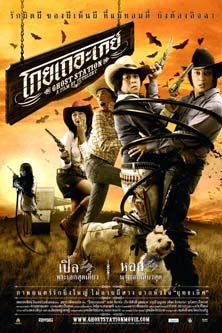
Abb.: Plakat
[Bildquelle: Wikipedia. -- Fair use]
|
"Ghost Station (Thai: โกยเถอะเกย์) is a 2007 Thai comedy-horror film directed by Yuthlert Sippapak (ยุทธเลิศ สิปปภาค, 1966 - ) as a spoof of Brokeback Mountain (2005). PlotUdd (อู๊ด) and Yai (ใหญ่) are a gay couple who love cowboy movies and move from the city to a rural area to have a more intimate, rustic setting for their relationship. They buy an abandoned filling station and look to settle down. Udd then finds that Yai is having an affair with Tangmo (แตงโม ), a local woman who has a lesbian lover, Jenny (เจนนี่ ). Neither Yai nor Tangmo are aware of either of their sexual histories, but Udd discovers the affair and plans to have anal sex with his grandfather out of revenge. However, none of them know that he is a zombie, and lives with some scary spirits. Cast
[Quelle: http://en.wikipedia.org/wiki/Ghost_Station_%28film%29 . -- Zugriff am 2013-03-25] |
2007-04-07

The Nation:
Subhatra Bhumiprabhas [สุภัตรา ภูมิประภาส]: Charter drafter pans 'evil' elections
Abb.: Wicha Mahakhun [วิชา มหาคุณ], 2013
[Bildquelle: Prachatai. -- https://www.flickr.com/photos/prachatai/8540332460/. -- Zugriff am 2015-01-20. -- Creative Commons Lizenz (Namensnennung, keine kommerzielle Nutzung, keine Bearbeitung)]
"Former judge turned charter drafter Wicha Mahakhun [วิชา มหาคุณ, 1946 - ] yesterday hit back at scepticism over the constitution giving judges the power to select members of the senate and independent organisations, saying the judges had won the trust of His Majesty the King.
"We all know elections are evil, but [why do] many people still want to see history repeated?" Wicha told a public hearing on the draft charter held by the National, Economic and Social Advisory Council (Nesac) [สำนักงานสภาที่ปรึกษาเศรษฐกิจและสังคมแห่งชาติ] yesterday.He said MPs had to be elected, because it was not possible to let 65 million citizens draft laws.
"People, especially academics who want to see the constitution lead to genuine democracy, are naive," he said. "Electing senators is a problem, as seen in the past, so why don't people want judges to help select senators?
"I would like to recall HM the King's speech here. On April 9, His Majesty told the judges to perform their duties firmly and without caring what others might say. His Majesty said if the courts did not support good people, society could not survive. His Majesty said it was most imperative [for judges] to ensure justice," he said.
"Even HM the King places trust in the judges; would you condemn them?" he asked, adding that most people the drafters had met during their fieldwork wanted to see senators appointed at a Supreme Court [ ศาลฎีกา] meeting.
"The country collapsed because politicians played politics without principle, but these people [who want elected senators] have never learned from the [country's] crisis," he said.
Constitution Drafting Committee (CDC) [คณะกรรมาธิการยกร่างรัฐธรรมนูญ, 1950 - ] deputy chairman Charan Pakdithanakul [จรัญ ภักดีธนากุล)] said the CDC had placed judges in many places in the draft because it wanted neutral organisations in politics, since elected senators could not be neutral. Charan is permanent secretary of the Justice Ministry and also a member of the National Legislative Assembly."
[Quelle: Subhatra Bhumiprabhas [สุภัตรา ภูมิประภาส]: Charter drafter pans 'evil' elections. --http://www.nationmultimedia.com/2007/04/27/politics/politics_30032854.php. -- Zugriff am 2015-01-20. -- Fair use]
2007-04-09
Eine Frau stirbt und Dutzende werden verletzt beim Ansturm einer Menge auf den Verkauf von Jatukham Rammathep (จตุคามรามเทพ) Amuletten im Mahathat Woromaha Vihan (วัดพระมหาธาตุวรมหาวิหาร) in Nakhon Si Thammarat (นครศรีธรรมราช). Über 10.000 Personen hatten die Nacht über auf den Verkauf gewartet.
Abb.: Lage von Nakhon Si Thammarat (นครศรีธรรมราช)
[Bildquelle: OpenStreetMap. -- Creative Commons Lizenz (Namensnennung, share alike)]
Abb.: Lage des Mahathat Woromaha Vihan (วัดพระมหาธาตุวรมหาวิหาร)
[Bildquelle: OpenStreetMap. -- Creative Commons Lizenz (Namensnennung, share alike)]
Abb.: Jatukham Rammathep (จตุคามรามเทพ), 2007
[Bildquelle: Isriya Paireepairit. -- http://www.flickr.com/photos/isriya/478021976/ . -- Zugriff am 2012-01-09. -- Creative Commons Lizenz (Namensnennung, keine kommerzielle Nutzung)]
"Jatukham Rammathep (จตุคามรามเทพ) is the name of an unusually popular amulet sold by some Buddhist temples in Thailand. The amulet is named for two princes of the Srivijaya kingdom of southern Thailand, and is believed to provide protection and good fortune to the bearer. Some legends hold that the name actually belongs to an incarnation of the Bodhisattva Avalokitesvara, whose worship was known in the south due to the presence of Mahayana Buddhism there during earlier eras. The original Jatukham Rammathep amulets were created in 1987 by a Thai policeman named Khun Phantharak Rajjadej (พลตำรวจตรี ขุนพันธรักษ์ราชเดช, 1903 - 2006) who believed that the spirit of Jatukham Rammathep had assisted him in solving a difficult murder case.
During 2006, following on the death of Khun Phantharak Rajjadej, Jatukham Rammathep amulets began to grow wildly in popularity among Thais who believed in their ability to grant good fortune and solve personal problems. The amulets were initially distributed by a temple in the town of Nakhon Si Thammarat (นครศรีธรรมราช) in southern Thailand. As the demand for these amulets grew, they began to also be produced at other temples in Thailand.
In April 2007, a woman died after being trampled in a rush to acquire reservations for a batch of Jatukham Rammathep amulets being produced at the Mahathat Woromaha Vihan (วัดพระมหาธาตุวรมหาวิหาร) temple in Nakhon Si Thammarat. Later that month, in the face of a crime wave of daily amulet robberies, Thailand's Supreme Patriarch (พระสังฆราช)) stopped providing materials from the temple, such as ash from incense, used to make the amulets.
Trucks with loudspeakers blare promotions for different series of amulets all day in Nakhon Si Thammarat, and colorful posters cover many walls.
It is estimated that sales of the Jatukham Rammathep amulet in Thailand will amount to over 20 billion baht during 2007."
[Quelle: http://en.wikipedia.org/wiki/Jatukham_Rammathep . -- Zugriff am 2012-01-09]
2007-04-10

"The website www.pantip.com re-opens its political webboard or the “Ratchadamnoen Room” yesterday night (April, 10th). Pantip has discussed codes of conduct for its users in detail with the Ministry of Information and Communication Technology (ICT).
Pantip.com has assured the ministry that it can control the webboard and informed its users of the ministry’s request, asking them not to post messages which might be considered as lèse-majesté. The ministry also requests them not to mention personal issues of privy councilors.
Meanwhile, the ICT Ministry affirms it respects the right to expression of netsurfers. However, it calls for them to criticize the government and the Council for National Security (CNS) with rationally and constructively. "[Quelle: http://thainews.prd.go.th/en/news.php?id=255004110001 . -- Zugriff am 2012-01-09]

Abb.: ®Logo
"Pantip.com is a popular Thai-language website and discussion forum. As of April 2008, Pantip.com was one of the top 10 websites in Thailand, along with rival Thai portal Sanook.com. Discussions about Thai politics and current events on Pantip.com's topic boards are often cited in the Thai press, particularly in such English-language newspapers as the Bangkok Post and The Nation, as a gauge of the public's mood about various issues. At the beginning, the site gained its popularity from people's misunderstanding of its name which is similar (and identical in English spelling) to Bangkok's famous IT shopping center, Pantip Plaza (พันธุ์ทิพย์พลาซ่า), however it is in no way affiliated with the mall (The name is actually styled in Thai as พันทิป, meaning a thousand tips.) Nevertheless, there is a significant IT-related community there.
HistoryPantip.com was founded in 1997 by Wanchat Padungrat (วันฉัตร ผดุงรัตน์), an electrical engineer. He holds directorship and ownership of the site. Along with the popular Thai-language portal Sanook.com, Pantip.com was one of the first websites established in Thailand when the Internet was being introduced in the country. As opposed to Sanook.com's lucrative buyout from MWeb, a now-defunct dot com company, Wanchat has no plans to sell the site.
Community TablesOne of the features of the site is the "Café", which consists of 20 "tables" for discussions on a variety of topics. The tables are named after famous places in Thailand, such as Siam Square (สยามสแควร์), MBK Center (มาบุญครอง), Silom (สีลม) and Chatuchak Weekend Market (จตุจักร). Topics for discussion include politics, religion, celebrities and education as well as films, sports and outdoor recreation.
Other features include LiveChat, Pantip Market, PanTown, Game Room, E-Card, BlogGang and Pantip Musicstation.
Membership systemPantip.com has a belief that its members should be held accountable for what they write on its webboard in order to avoid unpleasant exchanges that often bring about defamation, rudeness, or simply unhealthy cyber environment for its members. Thus, since 2004 it has started requiring that new members must provide their IDs (Thai National ID or passport number) in order to subscribe for a membership . At first, this measure had received a lot of criticism, with concerns about privacy and security of personal information. However, such criticisms have subsided as there has been no indication of any harm as of yet. Apparently, Pantip.com is one of the few, if any, online webboards that have such stiff requirements involving personal identity of the member. According to Wanchat, the outcome of such measure is quite satisfying, the members are contented with the improved quality of the discussion and the membership has grown.
Alternatively, people who do not wish to apply as a member can still post using a temporary ticket-pass that only requires an e-mail address. But the ticket-pass holders do not enjoy some special benefits of the members such as intra-communication tools and blog.
Recently, in Ratchadumnern table, where heated and uncivil political debates often occur, Pantip.com has started requiring that every post there must be accompanied by member login only. Thus, everyone who wishes to post in Ratchadumnern table must have member login name. However, the problem of using false identification or IDs of other people to apply for membership is still pervasive.
NetiquetteThe forum has rules, or "netiquette", which are actively enforced. Offensive posts can be reported to the webmaster, who may remove the offending post to the "trash" page, where the pages can still be viewed and commented on. The rules are:
- Messages critical of the king and the royal family are absolutely prohibited.
- No foul language or sexually explicit content.
- No insults or posts that may cause a person to be hated.
- No posts that are solely intended to cause quarrels or chaos.
- No negative attacks on religions or the teachings of any religion.
- Don't use pseudonyms that resemble somebody else's real name with the intention of misleading others.
- No messages that might cause conflicts among educational institutions.
- No posts containing personal data of others, e-mail addresses or telephone numbers."
[Quelle: http://en.wikipedia.org/wiki/Pantip.com. -- Zugriff am 2012-01-09]
2007-04-11
General Sonthi Boonyaratkalin (สนธิ บุญยรัตกลิน, 1946 - ), ein Muslim, geht auf Inspektions-Tour in die Terror-geplagten südlichsten Provinzen.
2007-04-11
Laut The National Intelligence Agency (สำนักข่าวกรองแห่งชาติ) werden ca. 200.000 männliche Muslime zwischen 15 und 20 streng überwacht.
2007-04-12


Ein mit einer Thai verheirateter, seit mehreren Jahren in Thailand wohnhafter Schweizer, der 2006-12-05 im Vollrausch fünf Porträts des Königs mit schwarzer Farbe besprüht hatte und deswegen wegen Majestätsbeleidigung zu 10 Jahren Haft verurteilt worden war, wird vom König begnadigt und verlässt Thailand.
2007-04-12
Premiere des Film Bus Lane (เมล์นรก หมวยยกล้อ) von Kittikorn Liasirikun (กิตติกร เลียวศิริกุล, 1967 - )
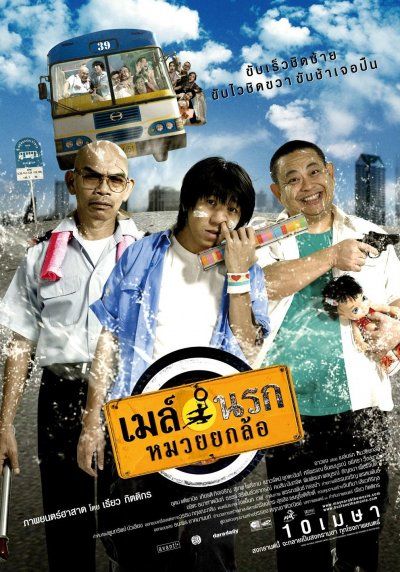
Abb.: Plakat
[Bildquelel: Wikipedia. -- Fair use]
|
"Bus Lane (Thai: เมล์นรก หมวยยกล้อ or May narok muay yok law) is a 2007 Thai action-comedy film directed by Kittikorn Liasirikun (กิตติกร เลียวศิริกุล, 1967 - ). [...] Release and receptionBus Lane opened in Thailand cinemas on April 12, 2007. It was No. 1 at the box office on opening weekend, knocking the Thai canine comedy Ma-Mha (มะหมา 4 ขาครับ) from the top spot, and beating out the Jim Carrey (1962 - ) thriller The Number 23, which opened the same week. [1] It held the No. 1 spot for a second week, before dropping to No. 2 in its third week, No. 3 in its fourth week, and finally No. 10 and No. 16 in the subsequent two weeks." [Quelle: http://en.wikipedia.org/wiki/Bus_Lane_%28film%29. -- Zugriff am 2013-04-20] |
2007-04-13
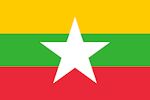
Dr. Cynthia Maung (စင်သီယာမောင်) erhält einen Ehrenpreis von Swedish World of Children für ihren Einsatz für birmanische Flüchtlinge. Dr. Cynthia hat eine Klinik in Mae Sot (แม่สอด) und behandelt seit 1989 kostenlos birmanische Flüchtlinge und Immigranten.
Abb.: Lage von Mae Sot (แม่สอด)
[Bildquelle: OpenStreetMap. -- Creative Commons Lizenz (Namensnennung, share alike)]
Abb.: Dr. Cynthia Maung (စင်သီယာမောင်), 2009
[Bildquelle: Mike Gifford. -- http://www.flickr.com/photos/mgifford/3967605121/ . -- Zugriff am 2012-01-09. -- Creative Commons Lizenz (Namensnennung, share alike)]
"Cynthia Maung (စင်သီယာမောင်, * 6. Dezember 1959 in Mawlamyaing - မော်လမြိုင်မြို့, Myanmar) ist eine promovierte Medizinerin vom Volk der Karen (ကရင်လူမျိုး / กะเหรี่ยง) und Gründerin der Mae Tao-Klinik (မယ်တော်ဆေးခန်း) in Mae Sot (แม่สอด), Thailand. Leben
Cynthia Maung wurde an der Universität Rangun (ရန်ကုန်) ausgebildet und arbeitete danach in mehreren Krankenhäusern in der Gegend der ehemaligen Hauptstadt Myanmars, unter anderem am North Okkalapa (မြောက်ဥက္ကလာပ မြို့နယ်) General Hospital.
Nach den blutigen Unruhen am 8. August 1988 floh sie an die thailändische Grenze. Im Februar 1989 begann der Aufbau einer kleinen Klinik zur Behandlung von Flüchtlingen aus Myanmar in Mae Sot's Vorort Mae Tao am Asian Highway. Heute behandelt die Mae Tao-Klinik bis zu 100.000 Patienten pro Jahr. Aus der Holzhütte der Gründerzeit entstand eine kleine Siedlung. Es arbeiten mehr als hundert Mitarbeiter in der Klinik, die rein aus Spendengeldern finanziert wird.
WirkenDr. Cynthia Maung wird oft als die Mutter Teresa Birmas bezeichnet. Sie wurde für den Friedensnobelpreis vorgeschlagen und erhielt für ihre Arbeit mehrere hohe Auszeichnungen, unter anderem den Ramon Magsaysay Award und den Jonathan Mann Award. 2003 ehrte sie Time Magazine Asien als Heldin des Jahres.
Sie ist in der Ausbildung von medizinischem Personal engagiert. An ihrer Klinik gibt es regelmäßig einjährige medizinische Kurse. Die Auszubildenden kehren oftmals nach ihrer Ausbildung nach Myanmar zurück, helfen weiter an der Klinik, oder arbeiten für das Back Pack Health Worker Team in Mae Sot, einer Hilfsorganisation, die medizinische Hilfe in den myanmarischen Staaten Kayin, Kayah und Mon anbietet, Gebiete, in denen eine staatliche Gesundheitsversorgung schlichtweg nicht existiert.
An eine Rückkehr nach Myanmar kann Cynthia Maung nicht denken. Sie wird vom Militärregime als Sympathisantin der Karen National Union (ကရင် အမျိုးသား အစည်းအရုံး) eingestuft und muss bei einer Rückkehr mit Verfolgung rechnen."
[Quelle: http://de.wikipedia.org/wiki/Cynthia_Maung . -- Zugriff am 2012-01-09]
2007-04-15
Tod des Schriftstellers Suwat Woradilok (สุวัฒน์ วรดิลก, geb. 1923).
Abb.: Suwat Woradilok (สุวัฒน์ วรดิลก)
[Bildquelle: th.Wikipedia. -- Fair use]
"Suwat Woradilok (Thai: สุวัฒน์ วรดิลก, July 14, 1923 in Bangkok – April 15, 2007, Amphoe Si Racha - ศรีราชา, Chonburi Province - ชลบุรี) was a Thai writer. He produced a variety of works, including short stories, novels, plays, scripts for television dramas, radio dramas and screenplays. He had several pen names, including S. Voradilok, Phrai Visanu (ไพร วิษณุ) and Rapheeporn (รพีพร). He was named a Thailand National Artist (ศิลปินแห่งชาติ) for literature in 1991. His well-known books include Rajinee Boad (ราชินีบอด, Blind Queen). He also penned the story for Dark Heaven (สวรรค์มืด), which was made into both a television drama and a 1958 film, directed by Rattana Pestonji (รัตน์ เปสตันยี, 1908 - 1970).
Suwat was married to singer Pensri Poomchoosri(เพ็ญศรี พุ่มชูศรี, 1929 - 2007), also a National Artist. The two married in the 1950s, after they worked together in a theater troupe. After a visit to China in 1957, Suwat and his wife were jailed on charges of being involved in communist activities. The two were jailed for four years, with Pensri spurning offers of early release to remain with her husband.
The couple had no children of their own, but adopted a child, Chatrachai Woradilok.
In his last years, Suwat suffered from heart disease and diabetes and was confined to bed in his home in Si Racha, Chon Buri Province. Less than a month after he died, his wife followed him in death on May 14, 2007."
[Quelle: http://en.wikipedia.org/wiki/Suwat_Woradilok . -- Zugriff am 2012-01-10]
2007-04-18
Es erscheint:
Thailand: Government-Backed Militias Enflame Violence : Abuses and Impunity Fuel Reprisal Attacks in the South / Human Rights Watch. -- Online: https://www.hrw.org/news/2007/04/18/thailand-government-backed-militias-enflame-violence. -- Zugriff am 2016-03-16
"(London) - The Thai government’s growing reliance on abusive militias for security as it fights a growing insurgency in the southern provinces places civilians at increasing risk, Human Rights Watch said today. On April 9, government-backed village defense volunteers in Ban Pakdi village of Yala [ยะลา] province’s Ban Nang Sta [Bannang Sata - บันนังสตา / بنڠ ستار] district fired on a crowd of Muslim funeral goers, killing four students and injuring at least five other people. The incident occurred after Unit 4202 of the Army rangers, an army-trained and equipped paramilitary force, fired on a civilian vehicle in Ban Ta Seh [ตาเซะ] village of Yala’s Muang district on March 9, killing Abukari Kasoh, a 15-year-old student, and seriously wounding his brother-in-law, Afandi Pohma.
Abb.: Lage von Bannang Sata - บันนังสตา / بنڠ ستار
[Bildquelle: OpenStreetMap. -- Creative Commons Lizenz (Namensnennung, share alike)]“These cases of deadly use of force show how dangerous it is for the government to arm and deploy poorly trained militia forces,” said Brad Adams, Asia director for Human Rights Watch. “Villagers in southern Thailand have a right to defend themselves from attacks by insurgents, but we’ve seen examples from around the world of how ill-disciplined volunteer militias use weapons improperly and set off a vicious cycle of reprisal attacks against civilians.”
The government of General Surayud Chulanont, which was installed after the military staged a coup d’état last September, has significantly stepped up its use of paramilitary Army rangers and village defense volunteers to face the growing challenge posed by separatist groups in Thailand’s predominantly Muslim southern provinces.
Over the past month, insurgents have increased their attacks across Yala [ยะลา], Pattani [ปัตตานี] and Narathiwat [นราธิวาส] provinces. They allegedly burned more than 10 government schools and bombed markets and shops owned by Buddhists. They have murdered Buddhists, as well as Muslims working with Thai authorities. The victims in two cases, Patcharaporn Boonsamas (aged 25) from Yala and Thongme Maiman (aged 70) from Narathiwat, were shot and then burned to death.
In response, the government this year has recruited nearly 3,000 local volunteers, some from the families of Buddhists and Muslims killed or injured by insurgents, to join the 30 newly formed Army ranger companies.
The Army has defended the actions of the militias, asserting that the village defense volunteers in Ban Pakdi in April were acting within their right to self-defense against what they saw as angry protesters. The victims of the April 9 incident were mourners returning on pickup trucks from a funeral for a local Muslim politician, Buraheng Puna, who had been killed earlier that day. The shooting occurred after a tense confrontation between angry funeral-goers, who believed that Thai security forces were behind Puna’s murder, and a group of Buddhist village defense volunteers manning the security checkpoint in Ban Pakdi. The village defense volunteers were attacked with sticks and rocks before they opened fire on the crowd with shotguns.
In the March 9 Ban Ta Seh shootings, the Army claimed that the rangers shot at a pickup truck during hot pursuit of insurgents. Before the incident, an outpost of rangers in that area was attacked hit-and-run style by seven gunmen on a pickup truck. According to an Army spokesman, troops from Unit 4202 of the rangers were trying to stop the escaping gunmen. They opened fire with AK-47 [Автомат Калашникова образца 47] rifles when they saw a pickup truck heading towards them from the direction where the first attack took place. However, there has been no independent evidence to show that Abukar and Afandi were involved in the earlier attack on the rangers.
Abb.: Kalschnikow AK-47 [Автомат Калашникова образца 47]
[Bildquelle: Wikimedia. -- Public domain]After the shooting witnesses reported that rangers, some of whom were drunk, broke into Ponoh Ta Seh Islamic boarding school. After teachers and students tried to explain that the two youths shot were not insurgents and had already been sent to the hospital, some rangers started shooting into the male dormitory area. They ordered male students to come out of school buildings, take their shirts off, and sit with their faces to the ground. The rangers verbally abused the students and spat at, kicked and hit some of them in the head.
“Thai authorities have a duty to discipline and, where necessary, prosecute Army rangers and any other irregular forces that commit abuses,” said Adams. “It should start by conducting a credible and transparent investigation into the killings by paramilitary forces in Ban Pakdi and Ban Ta Seh.”
Units from regular Army forces have also been implicated in the use of excessive force. On April 13, soldiers shot dead three unarmed Muslim boys, aged 13 and 14, in Ban Bana [บานา] village of Pattani province’s Muang district [เมืองปัตตานี]. A group of soldiers from Taskforce 2 of the Army in Pattani was chasing insurgents who had burned down mobile phone cell stations in nearby villages. One of the survivors told Human Rights Watch that he and his friends were playing on the roadside when heavily armed soldiers arrived in Humvees in Ban Bana village. He and his friends ran away because they were scared. They tried to hide in the bushes. But the soldiers allegedly shot them without warning with rifles, which the witness identified as US-made M16s. Muslim community leaders have pressed the government to investigate and prosecute those responsible.
Abb.: Lage von Mueang Pattani [เมืองปัตตานี]
[Bildquelle: OpenStreetMap. -- Creative Commons Lizenz (Namensnennung, share alike)]
Abb.: M16
[Bildquelle: Wikimedia. -- Public domain]
“The Thai government must understand that any attempt to cover up the misconduct of its security units or to protect them from criminal responsibility could set off a cycle of killings and reprisals,” Adams said. “The impunity of government forces has become the most common justification used by insurgents to carry out retaliatory attacks on civilians.”
Human Rights Watch urged the government to instruct its forces to comply with the United Nations Basic Principles on the Use of Force and Firearms by Law Enforcement Officials. The Basic Principles state that all law enforcement officials, in carrying out their duty, shall as far as possible apply nonviolent means before resorting to the use of force. Whenever the lawful use of force is unavoidable, law enforcement officials shall use restraint and act in proportion to the seriousness of the offense. The legitimate objective should be achieved with minimal damage and injury, and preservation of human life respected."
[a.a.O. -- Fair use]
2007-04-19
Premiere des Films Me... Myself (ขอให้รักจงเจริญ) von Pongpat Wachirabunjong (พงษ์พัฒน์ วชิรบรรจง, 1961 - )
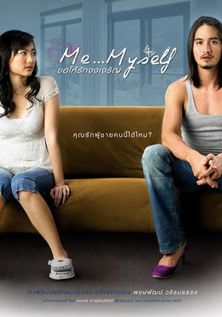
Abb.: Plakat
[Bildquelle. Wikipedia. -- Fair use]
|
"Me... Myself (Thai: ขอให้รักจงเจริญ) or Khaw hai rak jong jaroen) is a 2007 Thai romance drama film directed by Pongpat Wachirabunjong (พงษ์พัฒน์ วชิรบรรจง, 1961 - ). Ananda Everingham (ອນນັດາ ເອເວອຣິ່ງແຮນ / อนันดา เอเวอริงแฮม, 1982 - ) stars as a gay male dancer in a transvestite cabaret who has amnesia after being struck by a car. PlotA man is robbed while making a call in a phone booth. Staggering in the middle of the road from the beating by the thieves, he is then struck by a car driving by a woman named Oom (อุ้ม). Feeling sorry for him, Oom brings the man to her apartment and gives him shelter. The man, it turns out, has developed amnesia. Based the name on a pendant the man is wearing – his only possession – Oom names him Tan (แทน). A doctor's examination reveals that Tan is uninjured except that he can't remember anything about his life prior to being struck by Oom's car. Tan is given a journal and urged to free associate in an effort to recall his past life. Oom is experiencing trouble in her own life. She has recently broken up with her domineering boyfriend, Krit (กริช), whom she still sees at her workplace, where she is a creative director for an advertising agency. Oom is also had motherhood thrust upon her, since she is caring for her nephew, the son of her dead sister. Initially, having Tan around adds stress to the situation, and when Tan reorganizes her stacks of magazines, and interferes in her disciplining of Ohm, she is angry. But Tan proves useful around the apartment. He is looked up to as a father figure by Ohm (โอม). And for Oom, he builds up the self-esteem and confidence she lost in her relationship with Krit. Tan seems to instinctively know things about feminimity, such as what dress Oom should wear and what shade of lipstick is appropriate. As a family unit with Oom and Ohm, Tan goes to an amusement park and defends Oom after he gets in trouble for fighting in school, with the result being Tan getting punched by the other boy's father. While visions of his past nag him, Tan seems perfectly happy with Oom and Ohm, especially after he becomes romantically involved with Oom. "I don't want to remember anymore. I want to be like this with you here, forever," he tells Oom one night as they watch the sunset from a ledge outside her apartment. Eventually the memories of the past catch up with Tan. Taking some numbers he wrote in his journal, he retraces his steps to the scene of the car accident, and eventually finds the numbers are an address to a house. The home belongs to a man whom Tan had a homosexual relationship with, but since the man is married to a woman and has a family, he must keep the relationship secret. Meanwhile, the police call Oom. They have some items recovered from the thieves who attacked Tan on the night he was struck by her car. Among the items is a mobile phone. The police have already called the number, and Tan's friends from Phuket (ภูเก็ต) on their way to Bangkok to claim the phone and find out more about their missing friend. The friends, it turns out, are all katoey (กะเทย) dancers in a transvestite cabaret, where Tan was the star attraction. Cast
Me ... Myself was featured in the Thai Panorama program at the 2007 Bangkok International Film Festival. It was screened at the 38th International Film Festival of India, where Pongpat Wachirabunjong won a Silver Peacock award for "most promising director".[2] [Quelle:http://en.wikipedia.org/wiki/Me_..._Myself. -- Zugriff am 2013-03-26] |
2007-04-19
Die für heute geplante Thailand-Premiere des Films Syndromes and a Century (แสงศตวรรษ) fällt der Zensur zum Opfer. Filmmacher: Apichatpong "Joe" Weerasethakul (อภิชาติพงศ์ วีระเศรษฐกุล, 1970 - )
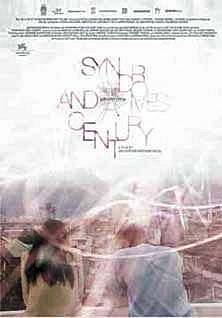
Abb.: Plakat
[Bildquelle: Wikipedia. -- Fair use]
|
"Syndromes and a Century (Thai: แสงศตวรรษ saeng satawǎat, literally Light of the Century[1]) is a 2006 Thai drama film written and directed by Apichatpong Weerasethakul (อภิชาติพงศ์ วีระเศรษฐกุล, 1970 - ). The film was among the works commissioned for Peter Sellars' (1957 - ) New Crowned Hope festival in Vienna to celebrate the 250th anniversary of the birth of Wolfgang Amadeus Mozart (1756 - 1791).[2] It premiered on August 30, 2006 at the 63rd Venice Film Festival. The film is a tribute to the director's parents and is divided into two parts, with the characters and dialogue in the second half essentially the same as the first, but the settings and outcome of the stories are different. The first part is set in a hospital in rural Thailand, while the second half is set in a Bangkok medical center. "The film is about transformation, about how people transform themselves for the better", Apichatpong said in an interview.[3] In Thailand, Syndromes and a Century became controversial after the Board of Censors demanded that four scenes be cut in order for the film to be shown commercially. The director refused to cut the film and withdrew it from domestic release.[4] Since then, the director had agreed to a limited showing in Thailand where the cut scenes were replaced with a black screen to protest and inform the public about the issues of censorship. Cast
"It's a film about heart", the director told the Bangkok Post. "It's not necessarily about love, it's more about memory. It's about feelings that have been forever etched in the heart."[5] It was originally entitled Intimacy and Turbulence and was to be an autobiographical look at his mother and father, who were both physicians working in a hospital in Khon Kaen (ขอนแก่น), Thailand. But the director revised that concept when he cast the actors and began filming. The story still focuses on a male and female doctor, and is dedicated to the director's parents, but is set in two hospitals 40 years apart and explores both the memories and current lives of the protagonists. "I began with my parents' story, but it has sprung to other things", Apitchatpong said in an interview. "When I met the actors, when I found the location, there were other stories combined and added in. I try not to limit it. I allow it to flow whichever way it goes. It is very exciting."[6 [...] Thai reception and censorshipA limited theatrical release in Bangkok was originally slated for April 19, 2007, but was indefinitely delayed after the Board of Censors demanded the removal of four scenes. Apichatpong refused to cut the film and withdrew it from domestic circulation. He explained his reasons for doing so in an article in the Bangkok Post:
Two of the "sensitive" scenes involve doctors engaging in "inappropriate" conduct (kissing and drinking liquor) in a hospital; the others depict a Buddhist monk playing a guitar and two monks playing with a remote-control flying saucer.[4] The censors refused to return the print unless the requested cuts were made.[13] Later in 2007, the film was shown twice in privately arranged screenings at the Alliance française in Bangkok. The censorship of the film came about as a motion picture rating system was being considered by the National Legislative Assembly (รัฐสภา). A replacement for the 1930 film act, the ratings law contained a restrictive ratings structure and retained the government's powers to censor and ban films it deemed would "undermine or disrupt social order and moral decency, or that might impact national security or the pride of the nation".[14] To oppose the draft law, Apichatpong and other directors formed the Free Thai Cinema Movement (เครือข่ายรณรงค์เพื่อเสรีภาพของภาพยนตร์). "We disagree with the right of the state to ban films", Apichatpong was quoted as saying. "There already are other laws that cover potential wrongdoings by filmmakers."[15] Ladda Tangsupachai (ลัดดา ตั้งสุภาชัย), director of the Ministry of Culture's Cultural Surveillance Department, said the ratings law was needed because moviegoers in Thailand are "uneducated". "They're not intellectuals, that's why we need ratings", she was quoted as saying.[16] Despite the protest, the law was passed on December 20, 2007.[14] The film was released for a limited run in April, 2008 at the Paragon Cineplex (พารากอนซีนีเพล็กซ์) in Bangkok, Thailand in its censored form. In protest of the censoring, the director inserted black, scratched film trailer in place of each of the censored scenes, the same length as the scenes that were cut. The result is that the audience experiences no sound and no picture for the same time and in the same spots in the film as the censored scenes." [Quelle: http://en.wikipedia.org/wiki/Syndromes_and_a_Century. -- Zugriff am 2013-03-26] |
2007-04-24
Eine fünfzigjährige Frau wird wegen Sklaverei zu 10½ Jahren Haft verurteilt. Sie hatte seit 2003 ein damals 13jähriges Mädchen als Haussklavin gehalten. Das Mädchen musste täglich zwanzig Stunden arbeiten, bekam keine Bezahlung und wurde geschlagen. Die Frau muss dem Mädchen 200.000 Baht Entschädigung zahlen. Es ist das erste (!) Mal, dass in Thailand das Anti-Sklaverei-Gesetz angewendet wird.
2007-04-24
Tennisprofi Paradorn Srichaphan (ภราดร ศรีชาพันธุ์, 1979 - ) und Miss Universe 2005, Natalie Glebova (Наталья Владимировна Глебова, 1981 - ), geben ihre Verlobung bekannt.
Abb.: Paradorn Srichaphan (ภราดร ศรีชาพันธุ์), 2006
[Bildquelle: itsv. -- http://www.flickr.com/photos/happyclams/234133248/ . -- Zugriff am 2012-01-10. -- Creative Commons Lizenz (Namensnennung, keine kommerzielle Nutzung, keine Bearbeitung)]
Abb.: Natalie Glebova (Наталья Владимировна Глебова), 2007
[Bildquelle: Raya. -- http://www.flickr.com/photos/raya-chibana/361667910/ . -- Zugriff am 2012-01-10. -- Creative Commons Lizenz (Namensnennung, keine kommerzielle Nutzung, keine Bearbeitung)]
2007-04-24
Es erscheint:
Editorial : Military needs dose of its own medicine. -- In: The Nation <Bangkok>. -- 2007-04-24
"Without an overhaul of the armed forces, a peaceful and democratic Thailand will remain elusive
There is no better proof of the military's failure than the fact that Islamic militants/Malay separatists have successfully turned what started out as a sporadic terrorist acts and low-intensity conflict with security forces into a full-scale insurgency in the deep South. Three years on and after more than 2,000 people have been killed, the insurgents have managed to gain an upper hand, throwing the Thai military into disarray and leaving people in the predominantly-Muslim southern provinces of Yala [ยะลา], Pattani [ปัตตานี] and Narathiwat [นราธิวาส] cowering in fear.One would think the armed forces would have learned some valuable lessons and adapted their counter-insurgency tactics and strategies to suppress the rebellion and restore peace in the troubled region. One would expect that after the September 19 coup by the military, and after the National Legislative Assembly gave the green light to the Defence Ministry's proposed 2007 budget of Bt115 billion - an almost 50-per-cent jump over that of the previous fiscal year - the armed forces would begin to shape up. But no such thing has happened.
The injection of huge funds into the Army, Navy and Air Force has not resulted in an improvement in performance commensurate with the additional resources. Worse still, the military has slipped further in its ability to engage the southern insurgents, who continue to inflict huge casualties on security personnel through roadside bombs and ambushes. This explains why the armed forces' effort to win the hearts and minds of people in the deep South is not working as planned. A military that is incapable of protecting its own soldiers does not inspire confidence in local people, who then refuse to cooperate in any way with the authorities for fear of reprisal from ruthless insurgents who kill and maim unarmed civilians with impunity. Without cooperation from the locals, the armed forces can gain no intelligence and the tens of thousands of soldiers deployed to combat insurgents become sitting ducks.
The problem with the armed forces is that they have been and continue to be weighed down by debilitating structural problems, lack of professionalism and corruption. But no one discusses these festering problems, even though it is no longer possible for anyone to ignore the utter failure of the armed forces to achieve the objectives they set out. It is disturbing that the Thai public continues to make allowances for a military that is not doing its job.
In order to make its own failings seem less obvious, the military set up and armed ranger units, made up of volunteers who are given only a few months of training before being deployed to areas heavily infiltrated by insurgents to fight on behalf of standing military units. Military commanders are reluctant to dispatch standing military units into the battle zones, either because their battle-readiness is very much in doubt or because they want to minimise additions to the "official" casualty list. Lowly-paid rangers are not listed as personnel of the armed forces and they are considered dispensable in the sense that the government is not required to include them in the armed forces' official casualty list or to offer substantial compensation to their families if they are killed in action.
It cannot be emphasised enough that in the absence of armed conflict over the past two decades, the armed forces have become bloated. Between them, the Army, Navy and Air Force have hundreds of desk-bound generals, admirals and air marshals who have no real job to do. Such a top-heavy structure explains why the military is spending up to 60-70 per cent of its total budget on salaries, leaving little money to upgrade weapon systems or to maintain a high level of battle-readiness.
Prime Minister Surayud Chulanont, a former Army chief, and Council for National Security chairman General Sonthi Boonyaratglin [สนธิ บุณยรัตกลิน, 1946 - ], the current Army chief, owe it to the Thai people and members of the armed forces to clean up entrenched inefficiency and corruption before the end of their respective tenures. The future of democracy in this country depends on having a professional military that is capable of dealing effectively with national security threats while submitting to civilian rule. Even people who call themselves guardians of the nation and restorers of democracy can benefit from a dose of their own medicine. "
[Quelle: http://www.nationmultimedia.com/2007/04/24/opinion/opinion_30032539.php. -- Zugriff am 2016-03-16. -- Fair use]
2007-04-27
Asia Times online: Interview von Shawn W Crispin mit Sondhi Limthongkul [สนธิ ลิ้มทองกุล, 1947 - ]
Abb.: Zeitschriftentitel mit Sondhi Limthongkul [สนธิ ลิ้มทองกุล]
[Bildquelle: th.Wikipedia. -- Fair use]Auszug:
"Explain the situation behind last year's September 19 coup.
There are two theories. One is that they really wanted to get rid of Thaksin. They saw Thaksin was very detrimental to Thailand, particularly to the monarchy.
Who precisely?
All of them: the military, [Privy Council president] Prem [เปรม ติณสูลานนท์, 1920 - ] ... You have to understand Thai politics. Whether you like it or not, since 1976 you cannot analyze political events without involving the monarchy institution. That's for sure.
The involvement of the king has depended on how severe the situation was. In certain circumstances, the king sends a mild signal and things come to an end. Sometimes the king has to come out - like he did with [coup leader] General Suchinda Kraprayoon [สุจินดา คราประยูร, 1933 - ] to stop the fighting [in 1992] - and send a strong signal. But whatever the case, the request for military intervention or for the king to come out has always had one prerequisite: there must be bloodshed.
That old political theory, that there must be bloodshed for the king to intervene, did not work when its purpose was to get rid of Thaksin. So that more or less upset their planned solution. I remember vividly that when there was [street protest] against Thaksin, I always had people calling me: "Khun Sondhi, could you move things a little bit forward, have a little confrontation, let us see a little blood?"[Quelle: http://www.atimes.com/atimes/Southeast_Asia/ID27Ae01.html. -- Zugriff am 2014-10-26. -- Fair use]
2007-05-03
Ausländische patentgeschützte Medikamente müssen eine Lizenz für die Herstellung in Thailand erhalten. Das US Trade Representative's Office stuft daraufhin Thailand herab zu einem Land mit schlechtem Schutz geistigen Eigentums.
2007-05-04
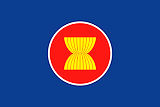
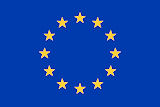
Bei den Gesprächen zwischen den Wirtschaftsministern der ASEAN-Länder und der EU in Brunei (برني دارالسلام) wird die Eröffnung von Verhandlungen über eine Freihandelszone zwischen ASEAN und EU beschlossen.
Abb.: Lage von Brunei (برني دارالسلام)
[Bildquelle: OpenStreetMap. -- Creative Commons Lizenz (Namensnennung, share alike)]
2007-05-11
Es erscheint:
Dismay as Panlop returns to ISOC : Sending Panlop back will worsen violence. -- In: Bangkok Post. -- 2007-05-11. -- Über die Ernennung von Pallop Pinmanee (พัลลภ ปิ่นมณี, 1936) zum Publöic Relations Adviser des ISOC (Internal Security Operations Command - กองอำนวยการรักษาความมั่นคง ภายในราชอาณาจักร)
Abb.: Pallop Pinmanee (พัลลภ ปิ่นมณี) mit Buch über das Massaker in der Krue Sae Moschee (มัสยิดกรือเซะ)
[Bildquelle: http://www.matichon.co.th/online/2012/02/13294636651329463704l.jpg. -- Zugriff am 2016-03-16 . -- Fair use]
"Für Aufruhr sorgte CNS- und ISOC-Chef Sonthi’s Entscheidung, General Panlop als PR-Berater ins ISOC zurückzuholen. Der Hardliner Panlop, früherer stellvertretender Direktor von ISOC, gab u.a. im April 2004 den Befehl, das Feuer auf die Moschee in Kru Se zu eröffnen, wobei 32 mutmaßliche Separatisten getötet wurden. Menschenrechtsaktivisten und andere Gruppierungen kritisierten den Schritt scharf, denn sie befürchten eine Verschärfung der Situation unter Panlop. Der hatte bereits ankündigte, das Problem „auf seine Art“ angehen zu wollen. In Anbetracht Panlops fehlender kultureller Sensibilität und seiner Rolle in der Vergangenheit, ist es nach Meinung vieler Beobachter ein schwerer Fehler, ihn wieder einzusetzen." [Quelle: Löschmann, Heike: Heinrich Böll Stiftung : Politischer Jahresbericht Südostasien 2006/2007. -- Chiang Mai, 2007-06. -- Online: http://www.boell.de/sites/default/files/uploads/2008/05/pol_jb_suedostasien_2006_2007.pdf. -- Zugriff am 2016-03-16. -- Fair use]
"Pallop Pinmanee (Thai: พัลลภ ปิ่นมณี, born 25 May 1936) is a retired Thai Army general who took part in several coups, ordered the massacre of insurgents at Krue Sae Mosque (มัสยิดกรือเซะ) and allegedly played a role in the attempted car-bomb assassination of Prime Minister Thaksin Shinawatra. After a 2006 military coup overthrew Thaksin, the military junta appointed Pallop public relations adviser to the Internal Security Operations Command (กองอำนวยการรักษาความมั่นคง ภายในราชอาณาจักร) of Thailand. Military career
Pallop was a member of Class Seven of the Chulachomklao Royal Military Academy (โรงเรียนนายร้อยพระจุลจอมเกล้า), the "Young Turks", where he befriended classmate Chamlong Srimuang (จำลอง ศรีเมือง, 1935 - ). He began his military career as a commando and self-professed assassin. With his Young Turk classmates, Pallop was involved in successful military coups against the governments of Seni Pramoj (เสนีย์ ปราโมช, 1905 - 1997) and Tanin Kraivixien (ธานินทร์ กรัยวิเชียร, 1927 - ) and an unsuccessful April Fool's Day 1981 coup against the government of Prem Tinsulanonda (เปรม ติณสูลานนท์, 1920 - ). He also admitted masterminding a number of assassination attempts against General Arthit Kamlang-ek (อาทิตย์ กำลังเอก, 1925 - 2015), commander of the Army under Prem.
He participated in guerrilla-warfare missions in Laos in 1966 and 1967 and was appointed chief of the Special Thai Ranger Army, a volunteer unit which carried out clandestine, anti-communist guerrilla operations financed by the US Central Intelligence Agency against the North Vietnamese Army along the Ho Chi Minh Trail in Laos, in 1968. Two years later, he was appointed leader of a secret seven-man unit which carried out extrajudicial killings. "The assignment was to kill the leaders of communist groups all over Thailand", he told a reporter, and claimed to have assassinated many suspected communists.
Pallop was appointed a senator by the military-led government in 1979, and became commander of the 19th Infantry Regiment the following year. He participated in operations along the Thai-Cambodian border in 1986 and 1987.
He was involved in several coups. With other members of the Young Turks, he helped topple the elected government of Seni Pramoj after the massacre of 6 October 1976. Pallop also participated in the 1977 coup against the ultra-conservative government of Tanin Kraivixien. During the Prem government, the Young Turks tried to seize power on 1 April 1981. When it became clear that the royal family continued to support Prem, the coup failed; although Pallop fled to the Lao PDR to escape punishment, he was jailed for two months by the Laotian government. He later admitted masterminding a number of assassination attempts against General Arthit Kamlang-ek, commander of the army in Prem's administration.
Although Pallop was rehabilitated and retired from the Royal Thai Army with the rank of general in 1996, he was appointed deputy director-general of the Internal Security Operations Command. In this position, he ordered military forces to storm the Krue Sae Mosque during a standoff with southern insurgents.
Krue Sae mosque incidentPallop was appointed commander of the Southern Peace Enhancement Center to deal with insurgency in southern Thailand. On 28 April 2004, more than 100 militants carried out attacks against 10 police stations across Pattani (ปัตตานี), Yala (ยะลา) and Songkhla (สงขลา) provinces in southern Thailand. Thirty-two insurgents retreated to the Krue Sae Mosque, the main mosque in Pattani. A seven-hour standoff ended when Pallop, the senior army commander on the scene, ordered an assault on the mosque; all the insurgents were killed. He later said, "I had no choice. I was afraid that as time passed the crowd would become sympathetic to the insurgents, to the point of trying to rescue them."
It was learned that Pallop's order to storm the mosque contravened an order by defense minister Chavalit Yongchaiyudh (ชวลิต ยงใจยุทธ,) to seek a peaceful resolution to the standoff, regardless of how long it took. Pallop was immediately ordered out of the area, and later tendered his resignation as commander of the Southern Peace Enhancement Center. The forward command of the Internal Security Operations Command (ISOC), which Pallop headed, was also dissolved. Although a governmental investigative commission found that security forces had overreacted, the Asian Centre for Human Rights questioned the commission's independence and impartiality. During a 3 May 2004 Senate hearing, Senator Kraisak Choonhavan (ไกรศักดิ์ ชุณหะวัณ, 1947 - ) noted that most of those killed at Krue Se Mosque were shot in the head and had signs that rope had been tied around their wrists. The incident sparked conflict between Pallop and Defense Minister Chavalit (who was also director of the ISOC), and Pallop later demanded that the defense minister end his involvement in managing the southern insurgency.
Opposition to Thaksin ShinawatraPallop is critical of former prime minister Thaksin Shinawatra. During protests against Thaksin in early 2006, Pallop said: "As a real friend and former classmate from military school, I fully support Chamlong (Srimuang) in his move (to oust Thaksin)".[1] He also threatened Thaksin with a military coup if Thaksin did not resign from the premiership.
Assassination plotPallop was dismissed from his ISOC deputy-director position after Thawatchai Klinchana, his driver, was found driving a car containing 4.5 kg of explosives near Thaksin's residence. According to Metropolitan Police Bureau commissioner Wiroj Jantharangsee, the explosives were assembled, equipped with a remote sensor and ready to be detonated. Kamthorn Ooycharoen, head of the police bomb-disposal squad at the scene, confirmed that the bomb was ready for detonation.[12] It was composed of a remote control unit, M-8 military fuses, sticks of TNT, C-4 plastic explosives, and nine plastic containers containing ammonium nitrate fuel oil (ANFO).
Pallop denied any involvement: "If had wanted to do it, I would have done it more subtly. In my career, I have led death squads. If I had wanted to kill him, the prime minister would not have escaped". According to him, "The explosives were being transported; they were not assembled to be detonated."
After the 2006 coupA military coup overthrew the Thaksin government on 19 September 2006, and the junta appointed Pallop public-relations adviser to the ISOC in May 2007. He promised to use "secret tricks" and negotiation, avoiding violent clashes: "Don't see me as a man who favours violence".
During the political crisis which began in October 2013, Pallop told the media in late February 2014 that he had been asked by the caretaker government to join the Centre for Maintaining Peace and Order (CMPO). According to an Australian academic, Pallop was recruited to advise on dealing with "men in black" gunmen at protests; the term originated during the 2010 crackdown on red-shirt supporters, when mysterious armed figures emerged. Military sources have said that the "men in black" may be mercenaries.
Personal lifePallop is married to Khunying Naruedee Pinmanee (นฤดี ปิ่นมณี), and has a son and two daughters."
[Quelle: https://en.wikipedia.org/wiki/Pallop_Pinmanee. -- Zugriff am 2016-03-16]
2007-05-14
Tod der Pop-Sängerin und Schauspielerin Pensri Poomchoosri (เพ็ญศรี พุ่มชูศรี, geb. 1929).
Künstlerlink auf Spotify:
URI: spotify:artist:2eVNorcpQohQil7vOzQJlV
URL: https://open.spotify.com/artist/2eVNorcpQohQil7vOzQJlV
Abb.: Pensri Poomchoosri (เพ็ญศรี พุ่มชูศรี)
[Bildquelle: th.Wikipedia. -- Fair use]
"Pensri Pomchoosri (Thai: เพ็ญศรี พุ่มชูศรี; (RTGS: Phensi Phumchusi); born: June 17, 1929, Changwat Phitsanulok (พิษณุโลก); died: May 14, 2007, Changwat Samut Prakan- สมุทรปราการ) was a Thai pop singer and actress, active for more than five decades from the 1940s. She was named a National Artist of Thailand (ศิลปินแห่งชาติ) in 1991. She was married to writer Suwat Woradilok (สุวัฒน์ วรดิลก, 1921 - 2007), also a National Artist, who died on April 15, 2007. Her nickname was Pee Jow (Thai: พี่โจ๊ว; RTGS: Phi Chow; meaning Sister Jow). Biography Early life and career
Born Pongsri Pomchoosri in Phitsanulok Province, she entered singing contests at the age of eight. She won several trophies including one from the Phu Khao Thong (ภูเขาทอง, Golden Mountain) fair, where a number of artists made their musical debuts. By the age of 12 she had made a record and had changed her name to Pensri. Her first record, Sila Tham Tang Ha (ศิลธรรมทั้งห้า, Five Precepts in Buddhism) was written by the renowned composer Siwa Woranat.
An oft-told legend about Pensri is that in 1941 her family had no money to pay medical bills for her father, who was hospitalized, and Pensri knelt down and sang for the doctor, who was so moved by her singing voice that he waived all the expenses.
As a teenager, Pensri joined a band led by Eua Sunthornsanan (เอื้อ สุนทรสนาน, 1910 - 1981) and Wes Sunthronchamorn, and received vocal training. She attracted national acclaim in 1947 when she performed "Sai Fon" (สายฝน), a song composed by King Bhumibol Adulyadej (ภูมิพลอดุลยเดช), in a live broadcast. She recorded the song in 1948. Other songs she is remembered for include "Sakuntala" (ศกุนตลา), "Man Sai Yoi" (ม่านไทรย้อย) and "Rampan Sawad" (รำพันสวาท).
Marriage, jailIn 1951 and 1952 she joined a theater troupe of Suwat Woradilok. The two artists then married. Pensri was featured in the musical film, Dark Heaven (สวรรค์มืด), released in 1958. Suwat wrote and produced, and it was directed by Rattana Pestonji (รัตน์ เปสตันยี, 1908 - 1970).
The couple became controversial when returned from a trip to China in 1957 and were charged with being engaged in communist activities and jailed. In jail, she remained by her husband's side, and refused early release on parole. She was jailed for four years. After her release, Pensri returned to singing.
Later lifeIn 1991 she was named a National Artist in performing arts (international music), alongside Suwat, who was named a National Artist for literature.
Suwat died on April 15, 2007. Less than a month later, on May 14, Pensri choked while having breakfast and collapsed. She was rushed to a local clinic, and then to Muang Samut Hospital in Samut Prakan, where she collapsed again and died of heart failure.
Funeral rites were held at Wat Makut Kasattriyaram (วัดมกุฏกษัตริยารามราชวรวิหาร) in Bangkok, and her body was to be cremated along with that of her husband."
[Quelle: http://en.wikipedia.org/wiki/Pensri_Poomchoosri . -- Zugriff am 2012-01-10]
2007-05-16

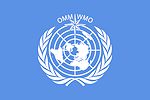

Seine Majestät der König erhält von den United Arab Emirates (الإمارات العربيّة المتّحدة) und der World Meteorological Organization den "UAE Prize for Weather Modification" für den "Königlichen Regen" (ฝนหลวง).
Abb.: Lage der United Arab Emirates (الإمارات العربيّة المتّحدة)
[Bildquelle: OpenStreetMap. -- Creative Commons Lizenz (Namensnennung, share alike)]
Abb.: UAE Prize for Weather Modification, 2007-05-16
2007-05-17


Multinational dental unit from Thailand, Singapore and the U.S. Navy:
Abb.: "BAHNKAI (บ้านค่าย) RAYONG PROVINCE (ระยอง), Thailand (May 17, 2007) - Multinational dental unit from Thailand, Singapore and the U.S. Navy provides dental care to the local people of Bahnkai Rayong Province during Cobra Gold 2007. Cobra Gold 2007 is an annual multinational joint training exercise aimed at developing interoperability, strengthening relationships between services and developing cross-cultural understanding among participating nations."
[Bildquelle: U.S. Air Force photo by Staff Sgt. Elizabeth Concepcion (RELEASED) / Wikimedia. -- Public domain]
Abb.: Lage von Ban Khai (บ้านค่าย)
[Bildquelle: OpenStreetMap. -- Creative Commons Lizenz (Namensnennung, share alike)]
2007-05-21
Tod des Puppenspielers Sakorn Yang-keawsot (สาคร ยังเขียวสด, geb. 1922).
Abb.: Joe Louis Puppet Theatre, 2008
[Bildquelle: Chrissy H. -- http://www.flickr.com/photos/teachingsagittarian/3102738770/ . -- Zugriff am 2012-06-13. -- Creative Commons Lizenz (Namenesnennung, keine kommerzielle Nutzung, share alike)]
"Sakorn Yang-keawsot (Thai: สาคร ยังเขียวสด; 1922 in Nonthaburi Province (นนทบุรี) – May 21, 2007 in Bangkok, Thailand) was a Thai puppeteer. He was a master of the hun lakorn lek (หุ่นละครเล็ก, traditional Thai small puppets). Also known by his English nickname, Joe Louis (โจหลุยส์), in 1985 he founded the Joe Louis Puppet Theatre. He was named a National Artist for performing arts in 1996.[1][2][3] Biography
Sakorn was born in 1922 to parents who were both khon (โขน, masked drama) performers and puppeteers in the troupe of Krae (แกร) Suppavanich. Sakorn performed in a likay (ลิเก, Thai folk opera) troupe as comedian, but also learned puppetry from Krae. He adapted and improved upon Krae's large hun luang (หุ่นหลวง, royal puppets) and revived the art of the hun lakorn lek puppets, which were not as detailed as the larger puppets but allowed for more mobility and life-like movements. As many as three puppeteers would be used to control the moves of one puppet.[1][2][3]
His puppet troupe was popular in the years following the Second World War, and it was during this time he was given the nickname Joe Louis, taking the name from a mispronunciation of his Thai nickname, "Liew", and in honor of the American heavyweight boxing champion.[4] He revived the art of Thai puppetry, which dates back to the 11th century, but struggled to keep the artform relevant as Thailand modernized. In 1985, he formed the Joe Louis Puppet Theatre with his children, performing adaptations of epic Thai literature, such as the Ramakien (รามเกียรติ์), with his puppets constructed from light wood, papier-mâché and fabric. The performances are accompanied by a piphat (ปี่พาทย์, traditional Thai classical music) orchestra.[1]
Joe Louis Puppet TheatreFrom 2001, his Joe Louis Puppet Theatre put on nightly shows in the Suan Lum Night Bazaar in Bangkok. The troupe nearly collapsed in 2004 when it could not afford the rent of its venue, but was saved after a public outcry and funds were raised. At the time of Sakorn's death in 2007, the future of the Suan Lum Night Bazaar was in doubt, and a new troupe formed by some of Sakorn's children was to start giving shows in the 578-seat Aksara Grand Theatre at the King Power Complex on Soi Langnam in Bangkok in September 2007.[2]
Sakorn had nine children. His son, Pisutr Yang-keawsot led the Joe Louis Puppet Theatre, which won the "Best Traditional Performance Award" at the 10th World Festival of Puppet Art in Prague in June 2006.[2]
Sakorn was suffering from lung disease and kidney failure and had been admitted to Kasemrad Rattanathibet Hospital on May 9. He was discharged on May 18 because he wanted to return home, but was re-admitted on May 20 and was being treated in its intensive care unit at the time of his death. Funeral rites were at Wat Bangpai in Bang Bua Thong (บางบัวทอง), Nonthaburi Province (นนทบุรี)."
[Quelle: http://en.wikipedia.org/wiki/Sakorn_Yang-keawsot . -- Zugriff am 2012-06-13]
2007-05-26
Massen von weiblichen Fans stürmen Siam Paragon (สยามพารากอน) Shopping Center, um einen Blick auf den koreanischen Pop-Sänger Rain (เรน = Jung Ji-Hoon - 정지훈, 1982 - ) zu erhaschen. Rain macht Reklame für seine Konzerte in Bangkok am 2. und 3. Juni.
Künstlerlink auf Spotify:
URI: spotify:artist:5L4EafeXwZ0stGuPtGr5Tz
URL: https://open.spotify.com/artist/5L4EafeXwZ0stGuPtGr5Tz
Abb.: Lage des Siam Paragon (สยามพารากอน)
[Bildquelle: OpenStreetMap. -- Creative Commons Lizenz (Namensnennung, share alike)]
Abb.: Thai-Frauen sind verrückt nach ihm: Rain (เรน), Bangkok 2007
[Bildquelle: Sry85 / Wikipedia. -- GNU FDLicense]
"Rain (* 25. Juni 1982 in Seoul (서울), Südkorea; geboren als Jung Ji-hoon - 정지훈) ist ein südkoreanischer Schauspieler, R&B- und K-Pop-Sänger und Model. Sein Bekanntheitsgrad reicht über Ostasien – inklusive Indonesien, Japan, Hong Kong, Südkorea, Taiwan, Volksrepublik China, Philippinen, Malaysia, Singapur, Thailand und Teile von Vietnam. Im April 2006, wurde er im Time Magazine (Amerika) unter die „100 Most Influential People Who Shape Our World“ (100 einflussreichste Personen, die unsere Welt gestalten) gewählt. 2007 wurde Rain wieder von den Lesern gewählt, obwohl er nicht auf der Namensliste verzeichnet ist. 2011 erreichte er Platz 55.
NameJung Ji-hoons Künstlername ist in jeder Sprache unterschiedlich. Im Westen wird er Rain genannt (dt. Regen). In Korea ist sein Name 비 (gesprochen „Bi“, bedeutet „Regen“ auf Koreanisch). In Japan ist er unter dem Namen ピ (Pi) und in China unter 雨 (Yu) bekannt. Alle diese Namen, außer dem japanischen, der sich lautlich vom koreanischen ableitet, heißen übersetzt „Regen“.
LebenRains Interesse für R&B und Hiphop wurde in der 6. Klasse geweckt. Als Jugendlicher war er in einer Band namens Fanclub. Diese Gruppe gab es nur für kurze Zeit. Nach Auflösung der Band verfolgte Rain das Ziel Tänzer zu werden und nahm an verschiedenen Vorsprechen teil. Obwohl er Talent vorzeigte, schenkte man ihm kaum Aufmerksamkeit, da er nicht in das Schema passte. Als letztes nahm Rain an einem Vorsprechen für eine südkoreanische Plattenfirma namens JYP Entertainment teil. Park Jin-Young (koreanischer Sänger und Producer) bekam Interesse an ihm und nahm ihn auf. In den ersten Jahren war Rain als Backgroundtänzer bei Park Ji-Yoon (박지윤) und Park Jin-Young (박진영) tätig.
Jung Ji-Hoon nahm den Künstlernamen Rain an und brachte 2002 sein erstes Album Bad Guy auf den Markt. Der gleichnamige Song wurde in Asien auf anhieb ein großer Hit. Danach zog er sich als Sänger zurück und begann in diversen Dramen zu schauspielern (unter anderem in Sang Doo! Let’s Go To School - 상두야 학교가자!). Nach seinem Erfolg als Sänger und Schauspieler brachte Rain sein zweites Album How To Avoid The Sun heraus, mit großem Erfolg der Single Way To Avoid The Sun (태양을 피하는 방법).
Im Jahr 2004, stand er für das Fernsehdrama Full House (풀하우스) vor der Kamera, welches eine konstante, hohe Einschaltquote von 30 % erhielt. Die Serie war genauso ein großer Erfolg auf den Philippinen, in Indonesien, Singapur, Vietnam, Thailand, China und Japan. Während Full House begann seine Fangemeinde auf ganz Asien anzusteigen. Mit der Rolle in der Serie bekam er den Award Bester Schauspieler bei den KBS Acting Awards.
2006 debütierte er als Filmschauspieler in Park Chan-wooks (박찬욱) I’m a Cyborg, But That’s OK (싸이보그지만 괜찮아,).
Im Jahre 2008 stand Rain erstmals vor der Kamera einer amerikanischen Produktion der Wachowski Brüder, die unter anderem die Matrix-Trilogie gedreht haben. In dem Film Speed-Racer spielt Rain Taejo Togokahn, einen Rennfahrer, verfilmt nach dem Anime Speed Racer. Ende des Jahres 2008 spielte er die Hauptrolle in Ninja Assassin, einer amerikanischen Produktion, gedreht von James McTeigue. Für den Film musste sich Rain Martial Arts Elemente einstudieren, und auch seinen Körper gezielt trainieren. Gefilmt wurde der Film in Berlin, wobei auch hier die Wachowsky Brüder als Produzenten, neben Joel Silver agierten.
Am 18. Mai 2011 gab Rain im Rahmen der Dresdner Musikfestspiele ein komplett ausverkauftes erstes Konzert in Deutschland."
[Quelle: http://de.wikipedia.org/wiki/Rain_%28S%C3%A4nger%29 . -- Zugriff am 2012-01-10]
2007-05-27/28
Bombenanschläge in Hat Yai (หาดใหญ่) und Saba Yoi (สะบ้าย้อย), Provinz Songkhla (สงขลา / Singgora). Vier Tote, 36 Verletzte.
Abb.: Lage von Hat Yai (หาดใหญ่) und Saba Yoi (สะบ้าย้อย)
[Bildquelle: OpenStreetMap. -- Creative Commons Lizenz (Namensnennung, share alike)]
2007-05-28
Es erscheint:
สัมภาษณ์ เกษียร เตชะพีระ : ถึงกัลยาณมิตร "ถ้าไม่มีทางเลือกที่ 3 มันก็เป็นการพ่ายแพ้ของเรา" [Interview with Kasian Tejapira <1957 - >: To a dear friend, "If there is no third alternative, it means we lost"]. -- http://prachatai.com/journal/2007/05/12854. -- Zugriff am 2016-11-10
"Jaran Ditapichai [จรัล ดิษฐาอภิชัย] gave an interview [in which he stated] that if he had to choose between being a servant of Thaksin and of a dictator, he would choose Thaksin. He further said that Thaksin did not do very much wrong. He only wanted too much power. However, Jaran once gave an interview to the Bangkok Post. I still remember the date. During the "War on Drugs," when many people died, he said that Thaksin was creating "a Kingdom of Fear." Jaran was a member of the subcommittee of the National Human Rights Commission investigating the Jana case [Amphoe Chana -- อำเภอจะนะ]. The report, signed by Jaran himself, clearly indicated that there was a violation of many articles of the constitution. How could he say that Thaksin did not do very much wrong? " [Übersetzung: Kanokrat Lertchoosakul [กนกรัตน์ เลิศชูสกุล]: The rise of the Octobrists in contemporary Thailand : power and conflict among former left-wing student activists in Thai politics. -- New Haven : Yale University Southeast asia Studies, 2016. -- 364 S. 23 cm. -- (Yale Southeast Asia studies ; monograph 65). -- ISBN 9780985042943. -- Zugl. The London School of Economics and Political Science, thesis 2012-09. -- S. 260f. -- Fair use]
Abb.: Lage von Amphoe Chana (จะนะ)
[Bildquelle: OpenStreetMap. -- Creative Commons Lizenz (Namensnennung, share alike)]
2007-05-31
Ein vom Militär eingesetztes Gericht löst die Thai Rak Thai Party (พรรคไทยรักไทย) auf und verbietet ihren 111 Führungskräften 5 Jahre lang politische Betätigung. Als Grund wird Wahlbetrug angegeben. Die Democrat Party (พรรคประชาธิปัตย์) wird von der Anklage des Wahlbetrugs freigesprochen.
Abb.: Vom Volk geliebt, vom Militär verboten: "Thais lieben Thais" (ไทยรักไทย) ®Logo
[Bildquelle: th.Wikipedia]
2007-05-31
Premiere des Films Teng Nong khon maha hia (เท่งโหน่ง คนมาหาเฮีย) von Pongsak Pongsuwan (พงศ์ศักดิ์ พงษ์สุวรรณ, 1966 - ) und Choosak Iamsook (ชูศักดิ์ เอี่ยมสุข, 1973 - ).
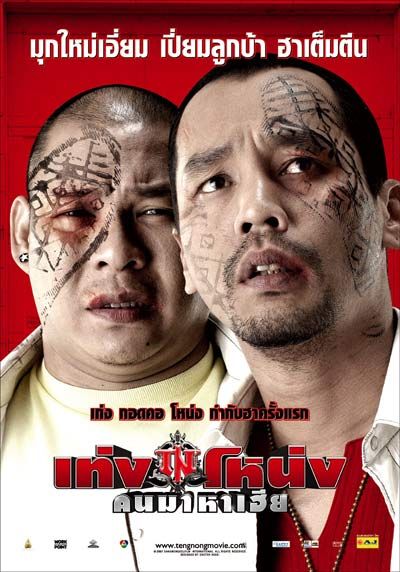
Abb.: Plakat
[Bildquelle: Wikipedia. -- Fair use9
|
Teng Nong khon maha hia (Thai: เท่งโหน่ง คนมาหาเฮีย or Teng and Nong: The Movie) is a 2007 Thai comedy film directed by and starring Thai television comedians Pongsak Pongsuwan (พงศ์ศักดิ์ พงษ์สุวรรณ, 1966 - ) and Choosak Iamsook (ชูศักดิ์ เอี่ยมสุข, 1973 - ). On its release, despite negative reviews by film critics, the film was No. 1 at Thailand cinema box offices, topping such Hollywood films as Shrek the Third (2007), Ocean's Thirteen (2007) and another Thai film, Ploy (พลอย, 2007).[1] PlotBumbling parking valets Nong (โหน่ง) (Choosak Iamsuk) and Teng (เท่ง ) (Pongsak Pongsuwan) are assigned by their gangster boss (Phairoj Jaising - ไพโรจน์ ใจสิงห์, 1943 - ) to deliver a valuable Chinese statuette to another gangster boss Hia See (เฮียสี่) (Andy Khemphimook - แอนดี้ เขมพิมุก, 1978 - ). During the journey, they decide to take a side trip and what should have been a simple job turns into a major fiasco with a police chase led by Lt Namtarn (หมวดน้ำตาล ) (Jirada Yohara - จิรดา โยฮารา). [Quelle: http://en.wikipedia.org/wiki/Teng_Nong_kon_maha_hia. -- Zugriff am 2013-03-26] |
2007-06
Lautsprecheransage während einer spiritistischen Kultsitzung in Tambol Mae Hia (แม่เหียะ). Die zahlreichen Teilnehmer kommen vorwiegend aus Chiang Mai (เชียงใหม่):
Abb.: Lage von Mae Hia (แม่เหียะ)
[Bildquelle: OpenStreetMap. -- Creative Commons Lizenz (Namensnennung, share alike)]
"Science will discover, that these mediums have nanotechnology. Nanotechnology! [This is] something very small, so small that you can’t see, but [something that] will allow you to communicate with other worlds." [Übersetzt und zitiert in: Johnson, Andrew Alan: Ghosts of the new city : spirits, urbanity, and the ruins of progress in Chiang Mai. -- Honolulu : University of Hawaiʻi Press, 2014. -- 190 S. : Ill. ; 23 cm. -- ISBN 978-0-8248-3971-0. -- S. 45]
2007-06-06
Thammasat University (มหาวิทยาลัยธรรมศาสตร์): Gründung der United Front for Democracy Against Dictatorship (UDD, แนวร่วมประชาธิปไตยต่อต้านเผด็จการแห่งชาติ - นปช.) als Dachorganisation von 22 Anti-Sept-2006-Putsch-Organisationen.
Abb.: ®LogoGeführt wird die UDD von einem Rat aus sieben Personen:
- Veera Musikapong (วีระ มุสิกพงศ์, 1948 - ): Politiker. Zwischen 1980 und 1988 in verschiedenen Positionen Kabinettsmitglied, 1986 bis 1987 Generalsekretär der Demokratischen Partei (พรรค ประชาธิปัตย์). Später Abgeordneter für die Thai-Rak-Thai-Partei (พรรคไทยรักไทย).
- Manit Jitjanklab (มานิตย์ จิตต์จันทร์กลับ), ehemals Richter am Obersten Gerichtshof
- Viphutalaeng Pattanaphumthai (วิภูแถลง พัฒนภูมิไทย)
- Dr Weng Tojirakan (เหวง โตจิราการ, 1951): Arzt und Politiker.
- Prateep Ungsongtham Hata (ประทีป อึ้งทรงธรรม ฮาตะ, 1952 - ; aka. Khru Prateep - ครู ประทีป): Sozialaktivistin und ehemalige Senatorin.
- Shinawat Habunphad (ชินวัฒน์ หาบุญพาด, 1953 - ), Präsident der Taxi Drivers Protection Association
- Choopong Teetuan (ชูพงษ์ ถี่ถ้วน), DJ an einer Community-Radio-Station
"Die Nationale Demokratische Allianz gegen Diktatur (thailändisch: แนวร่วมประชาธิปไตยต่อต้านเผด็จการแห่งชาติ RTGS: Naeo Ruam Prachathippatai To Tan Phadet Kan Haeng Chat, Abkürzung นปช., selbstgewählte englische Bezeichnung “United Front for Democracy Against Dictatorship”, abgekürzt UDD) ist die Dachorganisation, zu der sich in Thailand eine Vielzahl von politischen Gruppen zusammengeschlossen haben, die sich der politischen Bewegung der „Rothemden“ (thailändisch: เสื้อแดง RTGS: Suea Daeng) zurechnen. Sie wurde aus Widerstand gegen den Militärputsch am 19. September 2006 und die anschließend vom Militär eingesetzte Regierung gegründet und steht dem bei dem Putsch entmachteten Ministerpräsidenten Thaksin Shinawatra (ทักษิณ ชินวัตร, 1949 - )nahe.[1] Gründung und Entwicklung
Die Gruppe entstand aus Protest gegen den Militärputsch im September 2006, der Thaksin Shinawatra entmachtete, die anschließende Herrschaft der Militärjunta von General Sonthi Boonyaratglin (สนธิ บุณยรัตกลิน, 1946 - ), die sich selbst „Rat für Demokratische Reformen“ nannte und die von ihr eingesetzte Übergangsregierung unter Surayud Chulanont (สุรยุทธ จุลานนท์, 1943 - ). Führende Mitglieder waren Veera Musikapong (วีระ มุสิกพงศ์, 1948 - ) und Nattawut Saikua (ณัฐวุฒิ ใสยเกื้อ, 1975 - ), Politiker von Thaksins Thai-Rak-Thai-Partei (พรรคไทยรักไทย), die von dem nach dem Putsch eingerichteten „Verfassungstribunal“ wegen Wahlrechtsverstößen aufgelöst wurde. Dazu kamen Demokratieaktivisten, auch vormalige Kritiker Thaksins wie Weng Tojirakarn (เหวง โตจิราการ, 1951 - ), die über die Art und Weise von Thaksins Entmachtung und die erneute Militärherrschaft entsetzt waren. Eine Vielzahl verschiedener nach dem Putsch gebildeter Gruppen, die entweder Thaksin unterstützten oder die Militärherrschaft ablehnten, fanden sich im Laufe des Jahres 2007 zur Demokratischen Allianz gegen Diktatur (DAAD) zusammen.[2]
Das erste politische Ziel der DAAD war die Ersetzung der vom Militär eingesetzten Regierung Surayud und die Ablehnung der unter der Ägide des Militärs 2007 ausgearbeiteten Verfassung. Bei der Volksabstimmung im August erreichte die Nein-Kampagne der DAAD zwar 10 Millionen Stimmen, eine Mehrheit sprach sich allerdings für das neue Grundgesetz aus. Seit der Kampagne zu diesem Referendum, in dem die Farbe Rot mit der Ablehnung des Entwurfs assoziiert wurde, ist die DAAD bzw. UDD auch als Bewegung der „Rothemden“ bekannt – in Abgrenzung zu den „Gelbhemden“ (เสื้อเหลือง) der Volksallianz für Demokratie (พันธมิตรประชาชนเพื่อประชาธิปไตย), die zuvor gegen die Regierung Thaksins protestiert und seine Entmachtung durch den Putsch gebilligt, wenn nicht gar befürwortet, hatte. Nach der Kampagne zum Referendum fügte die Organisation ihrem Namen das Wort „National“ und den Slogan „Rot im ganzen Land“ (thailändisch: แดงทั้งแผ่นดิน RTGS: Daeng Thang Phaen Din) hinzu. Damit wollte sie ihre Anziehungskraft auf die Massen der Landbevölkerung ausdehnen.[2]
Die Bewegung erlangte weite Bekanntheit durch die Polit-Talkshow Khwamching Wanni/Truth Today (ความจริงวันนี้,„Wahrheit heute“) der ehemaligen TRT-Politiker Nattawut, Veera und Jatuporn Prompan (จตุพร พรหมพันธุ์, 1965 - ). Sie wurde nach dem Wahlsieg der TRT-Nachfolgerin Partei der Volksmacht (พรรคพลังประชาชน) im Dezember 2007 auf dem von der Regierung kontrollierten Sender NBT TV (สถานีวิทยุโทรทัศน์แห่งประเทศไทย - สทท) ausgestrahlt. Sie kritisierten den fortgesetzten Einfluss des Militärs und den Kronratsvorsitzenden (สภาองคมนตรีไทย) Prem Tinsulanonda (เปรม ติณสูลานนท์, 1920 - ), den sie als Hintermann für den Putsch verantwortlich machten. Die „Rothemden“ intensivierten ihre Aktivitäten, nachdem das Verfassungsgericht (ศาลรัฐธรรมนูญ) im Dezember auch die Partei der Volksmacht, abermals aufgrund des Vorwurfs der Wahlmanipulation, auflöste und Parlamentsabgeordnete das Lager wechselten und den bisherigen Oppositionsführer Abhisit Vejjajiva (อภิสิทธิ์ เวชชาชีวะ, 1964 - ) von der Demokratischen Partei (พรรค ประชาธิปัตย์) zum Ministerpräsidenten wählten. Dafür machten sie den Oberkommandierenden des Heeres, Anupong Paochinda (อนุพงษ์ เผ่าจินดา, 1949 - ) verantwortlich, der die Abgeordneten unter Druck gesetzt haben soll. Für die „Rothemden“ war dies ein weiterer Fall der von ihnen angeprangerten politischen Einmischung des Militärs.[3]
AnhängerschaftIn der thailändischen Öffentlichkeit und internationalen Medienberichten werden die „Rothemden“ oftmals im Kern als Bewegung armer Bauern aus dem ländlichen Norden und Nordosten dargestellt. Politikwissenschaftliche Studien haben ergeben, dass die Mehrheit der UDD-Unterstützer tatsächlich aus der Provinz stammt. Es handelt sich aber zu einem wesentlichen Teil um Vertreter einer sich dort entwickelnden unteren Mittelschicht, die als „urbanisierte Dorfbewohner“ bezeichnet werden können.[4][5]
Viele sind tatsächlich Klein- oder Mittelbauern, gehören aber nicht zu den allerärmsten Landlosen. Einige sind Gründer kleiner Geschäfte oder Unternehmen, beispielsweise Baufirmen. Die meisten sind Profiteure von Thaksins Politik der Kleinkredite für kleine und mittlere Unternehmen und für ländliche Entwicklung sowie des 30-Baht-Programms für allgemeine Gesundheitsversorgung. Eine Mehrheit kommt zwar nicht direkt aus großen Städten, aber aus dem Umland urbaner Zentren. Als Hochburgen der „Rothemden“ gelten die Provinzen Chiang Mai (เชียงใหม่), Udon Thani (อุดรธานี) und Khon Kaen (ขอนแก่น), in deren Zentrum jeweils eine größere Stadt liegt.[6] Viele „Rothemden“-Unterstützer im Großraum Bangkok sind inländische Migranten aus der weniger entwickelten Provinz, die den größten Teil des Jahres beispielsweise als Kleinhändler oder Taxifahrer in der Hauptstadt arbeiten,[7] aber immer noch in ihrer Heimatprovinz gemeldet sind und dort wählen.
Die Mehrheit der Teilnehmer an den „Rothemden“-Demonstranten 2010 hatte zumindest eine weiterführende Schule besucht, knapp ein Viertel hatte sogar einen Hochschulabschluss.[8] Das steht im Widerspruch zu dem Vorwurf von Teilen der städtischen Eliten, die „Rothemden“ seien in der Regel ungebildet, politisch desinformiert und unreif. Jene äußerten häufig den Verdacht, die „Rothemden“ würden gar nicht aus eigenem Antrieb zu den Demonstrationen gehen, sondern würden von Thaksin dafür bezahlt. Sie sprachen abwertend von „Prepaid-Demonstrationen“.[9] Die allermeisten Rothemden-Protestler waren über 40, viele auch über 50 oder sogar schon Rentner. Sie gaben an, ein besseres Thailand für die kommende Generationen zu wollen.[8][9]
Zu diesem Kern der UDD-Unterstützer kommt aber auch ein Teil der städtischen Mittelschicht, Büroangestellte, Studenten, Polizisten und auch ein Teil des Militärs. Der bekannteste Offizier, der die „Rothemden“ unterstützte, war Generalmajor Khattiya Sawasdipol (ขัตติยะ สวัสดิผล - „Seh Daeng“ - เสธ แดง, 1951 - 2010), der während der Zusammenstöße von Protestbewegung und Sicherheitskräften 2010 erschossen wurde.[10]
Der oftmals als Ursache des politischen Konflikts in Thailand und der Bildung der „Rothemden“-Bewegung vermutete Stadt-Land-Konflikt lässt sich also angesichts ihrer gemischten Zusammensetzung aus Dorfbewohnern, Provinz- und Hauptstädtern nicht bestätigen.[11]
Die meisten ländlichen „Rothemden“ haben sich der Bewegung angeschlossen, weil sie Profiteure der Politik Thaksins waren und sich durch den Putsch 2006 ihrer demokratischen Stimme beraubt fühlten. Sie sind oftmals begeisterte Anhänger Thaksins. Unter den städtischen UDD-Unterstützern sind dagegen nicht alle von Thaksin überzeugt. Einige von ihnen sind eher von demokratischen Überzeugungen, Ablehnung der wahrgenommenen Ungerechtigkeit und des Vorgehens von Politik und Justiz gegen die Gegner des Putsches motiviert.[10] Auch eine Reihe von Intellektuellen unterstützt die UDD. Der britisch-thailändische Politikwissenschaftler und bekennende Marxist Giles Ji Ungpakorn (ใจ อึ๊งภากรณ์, 1953 - ) ist beispielsweise ein bekannter Anhänger der „Rothemden“.
Die thailändischen Gewerkschaften stehen der UDD eher fern. Wichtige Teile der organisierten Arbeiterschaft schlossen sich aufgrund ihrer Feindschaft zu Thaksin den „Gelbhemden“ an. Andere unterstützen zwar die Kernforderungen der „Rothemden“ nach mehr Teilhabe und Gleichheit, sind aber nicht mit der Hierarchie und elitären Führungsriege der UDD einverstanden.[12]
Organisation und FührungAuch die Führungsriege der „Rothemden“ ist ein sehr heterogener Zusammenschluss. Ihre Mitglieder kommen aus ganz unterschiedlichen sozialen Hintergründen und politischen Richtungen. Das einstige Links-Rechts-Schema, das noch in den 1970er-Jahren zu heftigen Auseinandersetzungen und Zusammenstößen geführt hat, spielt dabei keine Rolle mehr. Das Spektrum der Anführer reicht von ehemaligen Aktivisten der Kommunistischen Partei Thailands (พรรคคอมมิวนิสต์แห่งประเทศไทย - พคท.) über liberale Bürgerrechtler und pragmatische Berufspolitiker bis zu rechten Hardlinern.[13] Die Bewegung setzt sich aus einer Vielzahl interner Gruppierungen und Netzwerken zusammen. Eine zentrale Rolle nimmt das „Trio“ der drei Berufspolitiker Veera Musikapong, Nattawut Saikua und Jatuporn Prompan ein. Entgegen der verbreiteten Wahrnehmung der „Rothemden“ als eine in Nord- und Nordostthailand verwurzelten Bewegung, kommen ihre drei bekanntesten Anführer aus der Südregion.[14][9]
Daneben sind mindestens acht weitere Zirkel zu unterscheiden, die jeweils auf einen Teil der „Rothemden“-Bewegung Einfluss ausüben. Dazu gehört eine vorwiegend in der Hauptstadt basierte Gruppe von Intellektuellen, Ärzten und Hochschullehrern, die teilweise schon in der Studentenbewegung der 1970er-Jahre aktiv waren. Der prominenteste unter ihnen ist Weng Tojirakarn (เหวง โตจิราการ, 1951 - ). Größere Popularität auf dem Land haben populistische Agitatoren wie der frühere Schlagersänger Arisman Pongruangrong (อริสมันต์ พงศ์เรืองรอง, 1964 - ), der Comedian Yoswarit Chooklom („Jaeng Dokjik“) oder der Abgeordnete Suporn Atthawong (สุพร อัตถาวงศ์, 1964 - ) aus der nordostthailändischen Großstadt Nakhon Ratchasima (นครราชสีมา), der sich selbst „Rambo Isan“ (แรมโบ้อีสาน) nennt. Letztlich ist noch die kompromisslose und militante Gruppe des Generals Khattiya Sawasdipol („Seh Daeng“) zu nennen, der in den 1970er-Jahren als Armeekommandant für die Bekämpfung der Kommunisten verantwortlich war. Er baute zur Gewährleistung der Sicherheit auf den „Rothemden“-Veranstaltungen einen bewaffneten Arm der Bewegung namens „Krieger des Königs Taksin“ auf.[15]
Nach der gewaltsamen Niederschlagung der heftigen „Rothemden“-Proteste im April 2009 richtete die Bewegung sogenannte UDD-Schulen ein, in denen sie demokratische Prinzipien, thailändische Geschichte und ihre eigene Ideologie lehrt.[3]
Im August 2009 ereignete sich eine Spaltung der „Rothemden“. Die Führung der UDD distanzierte sich von der Gruppe um Jakrapob Penkair (จักรภพ เพ็ญแข. 1967 - ) und Surachai Danwattananusorn (สุรชัย ด่านวัฒนานุสรณ์ - aka. Surachai Sae Dan, สุรชัย แซ่ด่าน, 1942 - ), die sich „Red Siam“ (สยามแดง) nennt. Zuvor hatte es Streit um eine Petition für eine Begnadigung Thaksins gegeben. Die UDD-Führung hatte eine Unterschriftenaktion für ein an den König gerichtetes Begnadigungsgesuch für den ehemaligen Ministerpräsidenten veranstaltet. Jakrapobs Gruppe lehnte diese ab, da sie ihrer Ansicht nach den anti-aristokratischen Grundprinzipien der Bewegung widersprach und angesichts der Angriffe der „Rothemden“ auf den Kronratsvorsitzenden (สภาองคมนตรีไทย) Prem Tinsulanonda (เปรม ติณสูลานนท์, 1920 - ) ohnehin aussichtslos wäre. Die UDD-Führungsriege warf „Red Siam“ vor, sich für einen bewaffneten Kampf im Stile der Kommunistischen Partei Thailands (พรรคคอมมิวนิสต์แห่งประเทศไทย - พคท).auszusprechen, der Surachai in der Vergangenheit angehört hatte. Nach der Trennung von Jakrapobs Flügel wurde die UDD unangefochten von dem Trio Veera, Nattawut und Jatuporn geführt.[9]
Die Gruppe ist mit der Ende 2008 gegründeten Pheu-Thai-Partei (พรรคเพื่อไทย) verbunden,[16] der aktuellen Nachfolgepartei der Partei der Volksmacht, die wiederum aus der von Thaksin gegründeten Thai Rak Thai hervorgegangen ist. Bei der Parlamentswahl im Juli 2011 kandidierte eine Reihe von UDD-Aktivisten auf der Liste der siegreichen Pheu-Thai-Partei und wurde ins Parlament gewählt. Im Januar 2012 berief die Ministerpräsidentin Yingluck Shinawatra (ยิ่งลักษณ์ ชินวัตร, 1967 - ) den „Rothemden“-Sprecher Nattawut Saikua in ihre Regierung.
Es gibt eine Reihe von Medien, die den „Rothemden“ nahestehen und deren Sichtweise verbreiten. Dazu gehören die Fernsehsender People’s Television und MV5, lokale Radiosender, die Zeitungen Voice of Thaksin, Truth Today Magazine, Thai Red News und Red Flags.[9]
Zielsetzung und IdeologieNach Darstellung der „Rothemden“ ist Thailand immer noch eine Ständegesellschaft. Eine privilegierte, aristokratische Elite von Staatsfunktionären, die sie nach dem traditionellen Titel für Hofbeamte ammat (อำมาตย์) nennen, herrsche über das einfache Volk und ignoriere dessen demokratischen Willen. Sich selbst identifizieren die Mitglieder der Bewegung als phrai (ไพร่), nach der historischen Bezeichnung für die zu Frondienst verpflichteten Untertanen in der Feudalgesellschaft des alten Siam. Die „Rothemden“ behaupten, dass Thailand keine Demokratie (pracha-thippatai) (ประชาธิปัตย์), sondern eine ammataya-thippatai, (อำมาตยาธิปัตย์) also eine Herrschaft der ungewählten Elite aus Staatsdienern, Justiz und Militär, sei. Das feudale Sakdina-System (ศักดินา), in dem die phrai ihren Herren unbezahlte Arbeit leisten mussten, wurde zwar von König Chulalongkorn (พระบาทสมเด็จ พระจุลจอมเกล้าเจ้าอยู่หัว, 1853 - 1910) Ende des 19. Jahrhunderts abgeschafft, nach Ansicht der UDD bestehen vergleichbere Abhängigkeitsverhältnisse aber auch in der modernen thailändischen Gesellschaft. Durch das Angreifen dieser vermeintlichen Klassenunterschiede und der Selbstidentifizierung als ausgebeutete und rechtlose Unterschicht appelliert die Bewegung an die ärmere Landbevölkerung, unter der das Gefühl, von der städtischen Elite missachtet und benachteiligt zu werden, weit verbreitet ist.[17]
Die „Rothemden“ stellen die gesellschaftliche Machtverteilung, aber überwiegend nicht die kapitalistische Wirtschaftsordnung in Frage. Im Gegenteil: Viele Teilnehmer der Bewegung haben eine positive Einstellung zu Globalisierung, Unternehmertum und Marktwirtschaft. Während Kernmitglieder der „Gelbhemden“ (เสื้อเหลือง) in zivilgesellschaftlichen Organisationen aktiv waren, die für eine vor-materialistische und vom globalen Kapitalismus abgekoppelte Lokalwirtschaft und –kultur eintraten, waren dies für die meisten „Rothemden“ romantische Illusionen. Für sie stehen konkrete Verbesserungen ihrer materiellen Lage im Vordergrund.[18]
Unterstützer der „Rothemden“ sehen überwiegend in mehr Wahlen auf allen Ebenen ein Mittel zur Lösung der Probleme des Landes. Sie schlagen vor, auch Provinzgouverneure und Bezirkshauptleute zu wählen, die bislang vom Innenministerium (กระทรวงมหาดไทย) ernannt werden. Unter Demokratie verstehen sie zumeist das etablierte, repräsentative System. Anders als die „Gelbhemden“, die gewählten Politikern misstrauen, lehnten sie daher den Militärputsch von 2006, Interventionen des Verfassungsgerichts und die Flughafenbesetzungen von 2008 strikt ab. Sie stehen in der Regel hinter ihren gewählten Lokalpolitikern und Wahlkreisabgeordneten (die im Norden und Nordosten überwiegend der mit der UDD verbündeten Pheu-Thai-Partei angehören). Während unter den „Gelbhemden“ die Überzeugung verbreitet ist, dass auch demokratisch gewählte Politiker nur ihren eigenen Nutzen verfolgen, glauben die „Rothemden“ an Politiker, die sich für die Interessen ihrer Wählerschaft einsetzen. Wichtigstes Beispiel eines solchen Politikers ist für sie Thaksin Shinawatra. Politiker mit denen die Wähler unzufrieden sind, könnten sie ja bei nächster Gelegenheit wieder abwählen.[19]
Der amerikanische Thailand-Berichterstatter und Dozent an der Chulalongkorn-Universität (จุฬาลงกรณ์มหาวิทยาลัย) Philip J. Cunningham schätzt ein, dass die UDD trotz ihrer Organisation als unabhängige NGO und Massenbewegung, in erster Linie den Interessen des entmachteten Ministerpräsidenten und Milliardärs Thaksin Shinawatra dient. Cunningham zufolge ist das Eintreten der UDD für Gerechtigkeit und die Interessen der armen Bevölkerung nur vorgetäuscht. Er charakterisiert die UDD als eine teilweise personalistische und militante Organisation, in der fremdenfeindliche und homophobe Positionen vertreten werden.[20] Auch der auf Südostasien spezialisierte Politikwissenschaftler Federico Ferrara konstatiert schwulenfeindliche Tendenzen in der Führungsriege der Rothemden.[21] Tatsächlich attackierte eine Gruppe von „Rothemden“ 2009 die Gay Pride Parade in Chiang Mai.[22] (เชียงใหม่) Unterstützer dieser lokalen Gruppe (Rak Chiang Mai ’51) (รักเชียงใหม่ '51)zeigten in Befragungen außerdem eine feindselige Haltung gegenüber Immigranten aus den ärmeren Nachbarländern, insbesondere aus Myanmar, und vertraten ihnen gegenüber nationalistische Klischees.[23]
ProtestaktionenAb der Regierungsübernahme durch Abhisit Vejjajiva im Dezember 2008 protestierten die „Rothemden“ heftig gegen den Machtwechsel, den sie als undemokratisch betrachteten und die Regierung, die für sie illegitim und eine Marionette der Militärführung war. Die Massenproteste hatten einen ersten Höhepunkt im April 2009. Bis zu 100.000 Menschen versammelten sich vor dem Regierungssitz im Zentrum Bangkoks, um das Ende der Elitenherrschaft, den sofortigen Rücktritt Abhisits und der Kronräte Prem und Surayud zu fordern. Durch ihre Blockade verhinderten sie außerdem die Abhaltung des ASEAN-Gipfeltreffens in Pattaya [พัทยา].[3] Zum Markenzeichen der „Rothemden“-Protestler wurden rote Plastikfüße, die beim Bewegen klappern, eine ironische Übernahme der gelben Klapper-Hände der „Gelbhemden“, mit denen sie ihren Anführern Beifall spenden.[24] Die Proteste wurden vom Militär niedergeschlagen, wobei zahlreiche UDD-Anhänger verletzt und mehrere getötet wurden.[3]
Bereits im September 2009 formierte sich die Protestbewegung erneut und hielt eine Demonstration anlässlich des dritten Jahrestags des Putsches von 2006 ab. Am 10. Dezember 2009, dem Tag der Verfassung, versammelten sich die „Rothemden“ vor dem Demokratiedenkmal (อนุสาวรีย์ประชาธิปไตย) und forderten eine Rückkehr zur Verfassung von 1997, die sie für demokratischer halten als die seit 2007 geltende, die nach dem Putsch ausgearbeitet worden war.[25]
Noch größer und im Ergebnis noch blutiger waren die neuerlichen Protestaktionen der Bewegung von März bis Mai 2010. Hunderttausende von „Rothemden“ besetzten das zentrale Geschäftsviertel Bangkoks um den Ratchadamnoen-Boulevard und die Ratchaprasong-Kreuzung (แยกราชประสงค์). Nach mehreren Aufforderungen, das besetzte Gebiet freizugeben, und der Ausschlagung eines Kompromissangebots durch die UDD-Führung, verhängte die Regierung Ende April den Ausnahmezustand und ließ das Militär den Aufstand ab dem 19. Mai niederschlagen. Dabei starben 92 UDD-Aktivisten, über tausend wurden verletzt. Die Anführer der Bewegung und hunderte weitere Anhänger wurden inhaftiert.[3] Die Organisation wurde vorübergehend aufgelöst. Nach der endgültigen Aufhebung des Notstands im Dezember 2010 konnte sich die UDD erneut organisieren. Da die wichtigsten Anführer zu dem Zeitpunkt immer noch inhaftiert waren, übernahm Thida Thavornseth (ธิดา ถาวรเศรษฐ, 1944 - ), die Frau von Weng Tojirakarn, den Vorsitz.[26]
Im Februar 2011 wurden mehrere der „Rothemden“-Anführer auf Kaution wieder entlassen. Bei der Wahl im Juli 2011 wurden mehrere führende Mitglieder der „Rothemden“ auf der Liste der Pheu-Thai-Partei ins Parlament gewählt. Obwohl ihre Partei die Wahl gewonnen hatte, bedachte die neue Ministerpräsidentin Yingluck Shinawatra (ยิ่งลักษณ์ ชินวัตร, 1967 - ) sie zunächst nicht mit Regierungsposten.[27][28] Erst bei einer Kabinettsumbildung im Januar 2012 wurde Nattawut Saikua zum stellvertretenden Landwirtschaftsminister ernannt. Nach einer erneuten Umbesetzung im Oktober 2012 wechselte er ins Handelsministerium. Im März 2014 löste Jatuporn Prompan Thida als Vorsitzender der UDD ab. Anders als seine Vorgängerin gilt er innerhalb der Organisation eher als Hardliner.[29][30]
Bekannte Aktivisten der UDD
- Arisman Pongruangrong (อริสมันต์ พงศ์เรืองรอง, 1964 - )
- Jatuporn Prompan (จตุพร พรหมพันธุ์, 1965 - )
- Nattawut Saikua (ณัฐวุฒิ ใสยเกื้อ, 1975 - )
- Prateep Ungsongtham Hata (ประทีป อึ้งทรงธรรม ฮาตะ, 1952 - )
- Surachai Danwattananusorn (สุรชัย ด่านวัฒนานุสรณ์, 1942 - )
- Thida Thavornseth (ธิดา ถาวรเศรษฐ, 1944 - )
- Weng Tojirakarn (เหวง โตจิราการ, 1951 - )"
[Quelle: http://de.wikipedia.org/wiki/Nationale_Demokratische_Allianz_gegen_Diktatur. -- Zugriff am 2015-01-19]
2007-06-07
Premiere des Films Ploy (พลอย) von Pen-Ek Ratanaruang (เป็นเอก รัตนเรือง, 1962 - )
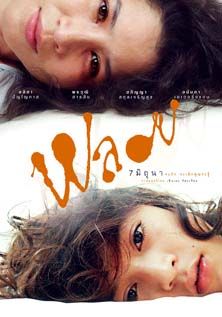
Abb.: Plakat
[Bildquelle: Wikipedia. -- Fair use]
|
"Ploy – Die Unbekannte im Hotel (Thai: พลอย) ist ein thailändischer Spielfilm. Bei dem Filmdrama mit minutiösen Beobachtungen eines emotionslosen Ehelebens führte Pen-Ek Ratanaruang (เป็นเอก รัตนเรือง, 1962 - )Regie. Der Film erschien am 7. Juni 2007 in Thailand. Die deutsche DVD-Erstveröffentlichung – unter dem Titel Ploy – erfolgte am 17. Oktober 2008, die deutsche TV-Erstausstrahlung am 2. Dezember 2009. HandlungDie ehemalige Schauspielerin Dang (แดง) und ihr Gatte Wit (วิทย์), ein Restaurantbesitzer, kehren im siebten Jahr ihrer Beziehung anlässlich einer Beerdigung von den Vereinigten Staaten in ihre thailändische Heimat zurück. Unter dem Jetlag leidend, quartieren sie sich in einem Hotel am Flughafen von Bangkok ein, um vor dem Morgen noch etwas Schlaf zu finden. Wit kommt jedoch nicht zur Ruhe und beschließt, Zigaretten zu kaufen. Derweil versucht Dang, die Koffer auszupacken. In der Jackentasche ihres Mannes entdeckt sie eine verdächtige Notiz – die Telefonnummer einer unbekannten Frau namens Noy. In der Hotelbar lernt Wit unterdessen die fast 19-jährige Ploy (พลอย), ein attraktives Mädchen mit Afro-Look kennen, die auf die Ankunft ihrer aus Stockholm anreisenden Mutter wartet. Die beiden sind sich sofort sympathisch und Wit lädt Ploy spontan in sein Hotelzimmer ein, damit sich die Wartende frischmachen kann. Im Zimmer werden die beiden von Dang empfangen, die die junge Fremde äußerst freundlich aufnimmt, obgleich sie von dem Besuch wenig angetan ist. Kaum ist sie mit ihrem Mann kurz allein, begegnet sie ihm mit Zorn, Unverständnis und Eifersucht. Als Wit sich weigert, die Fremde wegzuschicken, beginnt ein zermürbender Streit über mangelnde Leidenschaften in ihrer festgefahrenen Ehe. In der Folge entwickelt Dang krankhafte Halluzinationen und mörderische Träume gegenüber Ploy, in denen sie das schlafende Mädchen mit einem Kissen erstickt. Frustriert verlässt sie irgendwann die Räumlichkeiten. In einem parallelen Handlungsstrang leben der Barkeeper Nut (นัท) und das Zimmermädchen Tum (ตุ้ม) ihre Sexfantasien aus. Sie vergnügen sich im angrenzenden Hotelzimmer mit erotischen Spielereien. In der Lounge bestellt Dang Kaffee, in den sie heimlich Wodka schüttet. Ein Mann spricht sie auf ihre Vergangenheit als Schauspielerin an. Filmfan Moo (หมู) schmeichelt der angetrunkenen Dame und lädt sie zu sich nach Hause ein, indem er sagt, er kenne Noy – die Frau von Wits Notizzettel. Bei sich zu Hause wird der vermeintliche Bewunderer bald zudringlich. Dang wird mit Drogen gefügig gemacht, schwer misshandelt und vergewaltigt. Als Moo Stunden später sein gepeinigtes Opfer in einer abgelegenen Ruine ermorden und verbrennen will, kommt es zu einem Kampf zwischen ihnen, dessen Ende zunächst offen bleibt. In der Zwischenzeit philosophieren Ploy und Wit, nebeneinander Arm an Arm auf dem Hotelbett liegend, über die Ehe. Schließlich verabschiedet sich Ploy und geht, ohne dass es zu Sex gekommen ist. Wit ruft Dang an, und als sie nicht antwortet, murmelt er „Verlass mich nicht“. Er setzt sich in die Lounge und wartet. Schließlich setzt Dang sich zu ihm – sie konnte ihrem Peiniger entkommen. Wit sagt seiner Frau, dass er sie liebe. Am Ende des Films bezieht Tum das Bett neu, auf dem sie von Nut geliebt wurde, legt sich auf das Bett und singt mit direktem Blick in die Kamera versonnen ein Lied über die Liebe und ihre Leiden. Besetzung
Das Lexikon des Internationalen Films schrieb, der „meditativ angehauchter Erotik-Thriller“ erzeuge durch die „Auseinandersetzung mit der Alltäglichkeit einer Ehekrise“ eine „recht eigenwillige Atmosphäre“. Zudem sorge die „lose Struktur für einige Verwirrung“.[1] [Quelle: http://de.wikipedia.org/wiki/Ploy_%E2%80%93_Die_Unbekannte_im_Hotel. -- Zugriff am 2013-03-26] |
2007-06-10
Computer Crime Act B.E 2550 (2007) (พระราชบัญญัติว่าด้วยการกระทำความผิดเกี่ยวกับ
คอมพิวเตอร์ พ.ศ. ๒๕๕๐)
2007-06-10 - 2007-11-21

52. Biennale Venedig. Thailand ist durch Nipan Oranniwesna (นิพันธ์ โอฬารนิเวศน์, 1962 - ) vertreten
2007-06-11
Die Bankkonten des früheren Ministerpräsidenten Thaksin (ทักษิณ ชินวัตร) werden gesperrt.
2007-06-13
Die Boxerin Siriporn Thaveesuek (ศิริพร ทวีสุข, aka Samson Sor Siriporn -: แซมซั่น ส. ศิริพร, 1983 - ) wird vorzeitig aus dem Gefängnis entlassen. Sie war wegen Drogendelikten zu 10 Jahren Gefängnis verurteilt worden, von denen sie 7 absitzen musste.
Abb.: Siriporn Thaveesuek (ศิริพร ทวีสุข, aka Samson Sor Siriporn -: แซมซั่น ส. ศิริพร)
[Bildquelle: th.Wikipedia. -- Fair use]
"Samson Sor Siriporn (Thai: แซมซั่น ส. ศิริพร, * 26. April 1983 in der Provinz Lopburi) ist eine thailändische Boxerin und aktuelle Damen-Boxweltmeisterin des World Boxing Councils im Leichtfliegengewicht. Siriporn, die mit siebzehn wegen Drogenhandels zu zehn Jahren Haft verurteilt wurde, lernte im Gefängnis zu Selbstverteidigungszwecken boxen und bestritt den Großteil ihrer Kämpfe hinter Gittern.
Am 3. April 2007 besiegte sie die Japanerin Ayaka Miyano beim Weltmeisterschaftskampf um den bis dato vakanten WBC-Titel im Leichtfliegengewicht der Damen nach einstimmiger Entscheidung der Punkterichter. Der Kampf fand im berüchtigten Klong-Prem-Gefängnis (คลองเปรม) in Bangkok statt."
[Quelle: http://de.wikipedia.org/wiki/Samson_Sor_Siriporn . -- Zugriff am 2012-01-10]
2007-06-14
Premiere des Films Sick Nurses (สวยลากไส้) von Piraphan Laoyont (พีระพันธ์ เหล่ายนตร์) und Thodsapol Siriwiwat (ทศพล ศิริวิวัฒน์).
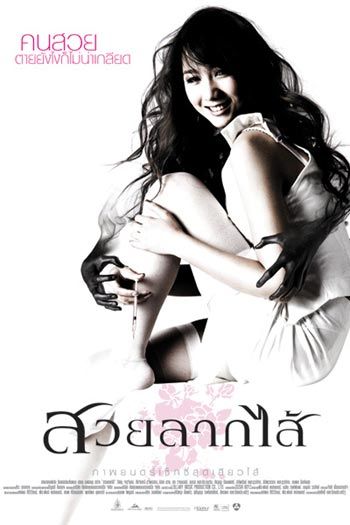
Abb.: Plakat
[Bildquelle: Wikipedia. -- Fair use]
|
"Sick Nurses (Thai: สวยลากไส้ or Suay Laak Sai) is a 2007 Thai horror film, written and directed by Piraphan Laoyont (พีระพันธ์ เหล่ายนตร์) and Thodsapol Siriwiwat (ทศพล ศิริวิวัฒน์). PlotIn a run-down, suburban Bangkok hospital, young Dr. Tar (หมอต้า) (Wichan Jarujinda) and seven nurses have been running a scheme to sell dead bodies on the black market. However, one nurse, Tahwaan (ตาหวาน)(Chol Wachananont), has found out that her boyfriend, Dr. Tar, has been having an affair with her sister, Nook (นุ๊ก) (Chidjun Rujiphan). Growing tired of the body-selling scam and enraged by her sister and boyfriend's betrayal, Tahwaan threatens to call the police. However, before Tahwaan can take action, the doctor and six resident nurses at the hospital strap Tahwaan to an operating table, kill her, and then wrap her in a black plastic garbage bag. They then dump her in the trunk of the doctor’s car, where her corpse will be kept on dry ice until it can be sold. All the women have their own obsessions and weaknesses. The spirit of Tahwaan uses these obsessions to torment and ultimately kill the other six nurses. Scenes shown toward the end of the film indicate that many of these obsessions were in part encouraged by Dr. Tar, or in some cases, used by him to seduce some of the women. For example, Aeh (เอ๊ะ) (Kanya Rattanapetch) seems unhealthily attracted to material possession such as jewelry, dresses, and handbags. One brief scene shows Dr. Tar giving Aeh a handbag that was shown sewn to her head and neck earlier in such a manner that when Nook tries to undo the stitching, Aeh is left decapitated. It is eventually revealed that Tahwaan was actually a homosexual male who had undergone a sex change so that he could marry Dr. Tar. He finally kills his own sister by being literally reborn through her and as he stares at Tar, he mutters "marriage" and the screen goes black. Cast
Sick Nurses was released in Thailand cinemas on June 14, 2007, where critical and box-office response was muted and maybe due to less cinema release of 50 and runs only for 2 weeks. According to Box-officeMojo.com its total gross to date is $335,399 [1] excluding the DVD sales worldwide. [...] In July 2007, at a workshop discussion on censorship in Thailand, producer Prachya Pinkaew revealed that the Board of Censors had in fact called for cuts to be made in the film, asking that a scene in which a medical cross symbol falls off the hospital building and kills a character be altered to eliminate the killing, because the censors believed that was a bad association for the symbol." [Quelle: http://en.wikipedia.org/wiki/Sick_Nurses. -- Zugriff am 2013-03-26] |
2007-06-15 - 2007-04-11

ZKM | Zentrum für Kunst und Medientechnologie Karlsruhe, Museum für neue Kunst: Thermocline of Art. New Asian Waves. 117 Künstler aus 20 Ländern Asiens. Thailand ist vertreten durch:
- Chatchai Puipia (ชาติชาย ปุยเปีย, 1964 - )
- Manit Sriwanichpoom (มานิต ศรีวานิชภูมิ, 1961 - )
2007-06-16 - 2007-09-23

documenta 12 in Kassel (Deutschland). Der thailändische Künstler Sakarin Krue-On (สาครินทร์ เครืออ่อน, 1965 - ) ist mit dem Terraced Rice Fields Art Project (Reisterrassen Kunstprojekt) vertreten.
Abb.: Terraced Rice Fields Art Project, 2007-09
[Bildquelle: dontworry / Wikipedia. -- GNU FDLicense]
"Das Terraced Rice Fields Art Project (Reisterrassen Kunstprojekt) war eine Außenarbeit von Sakarin Krue-On (สาครินทร์ เครืออ่อน, 1965 - ) im Bergpark Wilhelmshöhe. Der thailändische Künstler ließ am östlichen Hang vor dem Schloss Wilhelmshöhe Terrassen für den Nassreisanbau anlegen. In Veröffentlichungen im Vorfeld[29] schrieben die Ausstellungsmacher der documenta 12:
„Sowohl die Terrassenanlage als auch der Reisanbau werden nach traditionellem Vorbild durch Krue-On und sein thailändisches Team, darunter ein erfahrener Reisbauer, Experten aus der Region Kassel sowie documenta-MitarbeiterInnen realisiert. Dabei wird man so weit als möglich auf den Einsatz von Maschinen verzichten, auf überlieferte Methoden setzen und die Arbeiten mit einfachen Geräten wie Spaten, Gabeln und Hacken per Hand ausführen.“
Der Bergpark Wilhelmshöhe mit seiner 300-jährigen Geschichte bietet einen historischen Bezug zu Ostasien: Nur wenige hundert Meter entfernt bilden einige Gebäude die Reste des sogenannten „chinesischen Dorfes“ Mou-lang. Dieses entstand ab 1781 unter dem Landgrafen Friedrich II. und war einerseits eine zeitgenössische Chinoiserie, das Dorf und seine Bewohner dienten jedoch auch landwirtschaftlichen Zwecken. Der unmittelbare Ort der Reisterrassen war ein mit Gras bewachsener Parkhang, mit Sichtbezug sowohl zum unmittelbar dahinterliegenden Schloss, als auch – entlang der kilometerlangen Achse der Wilhelmshöher Allee – zur Stadt. Der Hang dient heute nicht der Landwirtschaft, stattdessen wird er im Winter von der einheimischen Bevölkerung traditionell zum Schlittenfahren genutzt.
Die Ausstellungsmacher sahen „eindeutig auch ein[en] Bezug auf die Kaskaden im Bergpark“ – gemeint waren die des Herkules-Bauwerks aus der Zeit des Barock – und betonten, dass sie in der Arbeit eine symbolische Inszenierung des Aufeinandertreffens von verschiedenen Kulturen sehen:
„Das Schloss Wilhelmshöhe – von Status, Gestalt und Symbolkraft ein architektonisches Monument eindeutig westeuropäischer Provenienz – und das Reisfeld – Zeugnis der Aneignung von Natur und ihrer Nutzung für den Lebensunterhalt sowie Symbol für Wachstum, Entwicklung und Zusammenarbeit. Sind sie gleichwertige Partner oder ist das eine Kulisse des anderen? Sakarin Krue-On will Fragen stellen und hofft, dass die Besucher Antworten finden werden.“
Die Erdarbeiten zur Anlage der Terrassen wurden nicht „nach traditionellem Vorbild“, sondern durch einen örtlichen Gartenbaubetrieb mit Minibaggern durchgeführt. Die Arbeiten begannen erst im Mai 2007, nur wenige Wochen vor der Eröffnung der documenta 12. Erst wenige Tage vor der Ausstellungseröffnung wurde mit der Wasserbefüllung und der Reis-Bepflanzung begonnen. Aufgrund der kurz zurückliegenden Erdbewegungen präsentierten sich die äußeren Hänge der Reisterrassen zum Zeitpunkt der Eröffnung der documenta 12 als kahle braune, weil vegetationsfreie, Flächen. Das für den Nassreisanbau notwendige Wasser wurde dem Lac, einem See am Fuße des Schlosshanges, entnommen. Durch eine motorbetriebene Pumpe wurde es in das oberste Becken der Terrassen gefördert und von dort mittels PVC-Rohren nach unten weiterverteilt. Es stellte sich heraus, dass große Mengen des Wassers im Untergrund versickerten und weiter unten am Hang, quasi als neuentstandene Quelle, wieder an das Tageslicht kamen. Am 20. Juni, vier Tage nach der Eröffnung der Ausstellung, wurde bekannt, dass aus Sorge der Berg könnte abrutschen die maschinelle Bewässerung eingestellt worden war. Spätere Besucher bekamen keine Wasserflächen mehr zu sehen."
[Quelle: http://de.wikipedia.org/wiki/Documenta_12#Terraced_Rice_Fields_Art_Project . -- Zugriff am 2012-06-20]
"Sakarin Krue-On (Thai: สาครินทร์ เครืออ่อน; * 7. Januar 1965 in Mae Hong Son (แม่ฮ่องสอน), Thailand) ist ein thailändischer Künstler. Er ist Professor und Direktor des Thai Art Department an der Silpakorn-Universität (มหาวิทยาลัยศิลปากร) Bangkok. International bekannt wurde er als Teilnehmer an der 50. Biennale di Venezia 2003 mit einem Kunstprogramm unter dem Titel Träume und Konflikte. Bei der documenta 12 in Kassel 2007 nimmt er mit der Kreidezeichnung Nang Fa (นางฟ้า) und dem Terraced Rice Fields Art Project teil, das bereits im Vorfeld der Ausstellung für eine starke Medienpräsenz sorgte. Werk
Sakarins Kunst besteht vor allem aus Installationen, Wandgemälden, Videos und Objekten, die er im Team mit mehreren Künstlern und Technikern entwickelt. Er greift traditionelle Elemente auf und platziert diese in moderne Medien und Darstellungen. 1999 platzierte er in der Kunstaktion Lotus Pod drei rollbare Skulpturen in der Prachtstraße Ratchadamnoen Road (ถนนราชดำเนิน) in Bangkok im Rahmen des Bangkok Art Project, um den Menschen die Möglichkeit zu geben, „ihre Geschichte selbst zu bewegen.“[1]
Im Jahr 2000 hatte Sakarin Krue-On seine erste Einzelausstellung in Bangkok im populären About Café & Studio, die im Wesentlichen aus dem in thailändischer Kreidetechnik gemalten The Temple an der Wand des Cafés bestand. Angelehnt an diese Zeichnung ist auch Nang Fa (นางฟ้า „Engel“) auf der documenta 12 im Treppenhaus der Neuen Galerie in Kassel.
Auf der Biennale di Venezia 2003 stellte er erstmals seine Arbeiten auch dem europäischen Publikum vor. Unter dem Titel Träume und Konflikte entstand vor allem seine Wall of Dreams sowie Mekala and Ramsura. Sakarin Krue-On war einer von sieben Künstlern aus Thailand, die in diesem Jahr erstmals auf der Biennale präsentiert wurden.
Das Terraced Rice Fields Art Project auf der documenta 12 ist eine Außenarbeit von Sakarin Krue-On im Bergpark Wilhelmshöhe, wo er vor dem Schloss Wilhelmshöhe Terrassen für den Nassreisanbau anlegen und nach traditionellem Vorbild bewirtschaften lässt.
Weitere Ausstellungen
- Yellow Simple - ein „Dreidimensionales Gemälde“, von Oktober bis November 2001 im „Open Arts Space“, Bangkok
- Cloud Nine - Dezember 2004 bis Januar 2005 in der „100 Tonson Gallery“, Bangkok
- Charm and Chasm - August 2007, Gemeinschafts-Ausstellung von neun jungen thailändischen Künstlern in der Galerie „Tang Contemporary Art“, Bangkok"
[Quelle: http://de.wikipedia.org/wiki/Sakarin_Krue-On . -- Zugriff am 2012-06-20]
2007-06-19

Dental civil action project (DENCAP) der US Navy:
Abb.: "BAN SAMSAN, Thailand (June 19, 2007) - A Royal Thai Army dentist gives a numbing shot to a local citizen, while Lt. Karen Wiebe, assigned to Operational Health Support Unit Detachment Lima Great Lakes, comforts her. Both dentists were working together during a dental civil action project (DENCAP) in a local village during the exercise Cooperation Afloat Readiness and Training (CARAT) 2007. CARAT is a scheduled series of bilateral military training exercises with several Southeast Asia nations designed to enhance interoperability of the respective sea services."
[Bildquelle: U.S. Navy photo by Mass Communication Specialist 1st Class Thomas J. Brennan (RELEASED) / Wikimedia. -- Public domain]
2007-06-21
Thaksin Shinawatra (ทักษิณ ชินวัตร) kauft den Fußballklub Manchester City (UK) für £81,6 Mio.
Abb.: ®Logo
[Bildquelle: Wikipedia]
Abb.: Lage von Manchester
[Bildquelle: OpenStreetMap. -- Creative Commons Lizenz (Namensnennung, share alike)]
"Manchester City (offiziell: Manchester City Football Club) – auch bekannt als The Citizens – ist ein Fußballverein aus Manchester. Nach der Gründung im Jahr 1880 als West Gorton Saint Marks spielte der Verein ab 1887 unter dem Namen Ardwick A.F.C. und zog anschließend in die Hyde Road um, bevor 1894 der endgültige Name Manchester City F.C. entstand. Der Verein gewann zweimal die englische Meisterschaft, fünf Mal den FA Cup, zweifach den Ligapokal und einmal den Europapokal der Pokalsieger. Sie spielen aktuell in der Premier League und haben den Großteil ihrer Geschichte in dieser obersten Liga verbracht. Die offiziellen Maskottchen des Vereins sind die Außerirdischen „Moonchester“ und „Moonbeam“. Im September 2009 erwarb Scheich Mansour bin Zayed Al Nahyan durch seine Firma ADUG alle Anteile an Manchester City. [...]
Im Jahr 2007 erwarb der umstrittene ehemalige Premierminister Thailands Thaksin Shinawatra (ทักษิณ ชินวัตร) die Hauptanteile am Verein. Im September 2008 verkaufte er seine Anteile allerdings wieder an ein Investmentunternehmen aus dem Scheichtum Abu Dhabi ( أبو ظبي) für ca. 185 Millionen Euro."
[Quelle: http://de.wikipedia.org/wiki/Manchester_City . -- Zugriff am 2012-01-10]
2007-06-25
In Zukunft gilt auch Vergewaltigung von Männern als Straftatbestand.
2007-06-26



Telegramm der US-Generalkonsulin in Chiang Mai (เชียงใหม่), Beatrice (Bea) Camp, an das US-Außenministerium:
"CHIANG MAI 106 - CHIANG MAI EXPANDS AS HUB FOR CHRISTIAN MISSIONARY WORK IN ASIA CLASSIFIED BY: Bea Camp, Consul General, Consulate Chiang Mai, Dept of State.
REASON: 1.4 (d)
1. (C) Summary. Chiang Mai's [เชียงใหม่] large foreign Christian community provides a safe base for religious groups engaged in quiet work elsewhere in the region. While most do not identify their activities to the Consulate, our presence and American citizen services contribute to Chiang Mai's appeal for these organizations. End summary.
2. (U) Northern Thailand, with an American missionary presence dating from 1867, has served as a fall-back zone for religious groups forced out of China, Tibet, and Burma for over half a century. More recently, Chiang Mai has attracted organizations such as the Christian Conference of Asia, which moved from Hong Kong [香港] in 2005 (ref b), as well as those seeking temporary haven, such as Pakistan's Murree [مری] Christian School in 2003.
3. (C) A look at one of these groups, Friends of China (FOC), shows a route by which religiously motivated individuals find their way into China as English teachers and "qualified professionals in various fields". The foundation, which moved its regional office to Chiang Mai in 1997 after a decade in Hong Kong, lists Chengdu [成都] as the main China location, with rep offices in Xining [西宁], Xian [西安] and Urumqi [ئۈرۈمچى شەھىرى]. FOC currently has about 150 "associates" working in 7 provinces and municipalities in China. An estimated 40 percent of these associates are US citizens.
4. (C) The FOC website includes no reference to religion, referring instead to "support for education". In contrast, a brochure available at the Thailand office defines FOC as "a charitable foundation that seeks to place, equip and support Christian professionals serving primarily in western and central China." The Chiang Mai office director, a Norwegian who worked in China for Ericsson as part of the program, says that FOC associates do not hide their religion but are advised on the prevailing cultural boundaries of their various locations.
5. (SBU) A visit to the back-street Chiang Mai office of FOC included a tour by an American teacher who was helping staff the office while on leave from Zhengzhou [郑州] during the last trimester of his wife's pregnancy. Chiang Mai's medical facilities, low cost of living, church community and access to Consular Reports of Birth Abroad contribute to this kind of arrangement.
6. (C) Applications for FOC jobs pass through the Chiang Mai office, where they are cleansed of references to religious affiliation before being sent on to Chengdu for processing. Most associates enter China through Chiang Mai, where they receive a short orientation and apply at the Chinese Consulate for visas. The receiving work units in China arrange longer-term visas for those under their responsibility.
7. (C) In response to questions about visas and other procedures, the head of the Chiang Mai office repeatedly referred to Chinese "flexibility", noting that flexibility increases with distance from Beijing [北京]. He rated Qinghai [青海] as "the most flexible" province, acknowledging that Xinjiang [شىنجاڭ ئۇيغۇر ئاپتونوم رايونى] is particularly sensitive. Although no FOC associates have been expelled from the country in the organization's 20 year history, several have not have their visas renewed, including recently a Swedish couple in Xinjiang.
CAMP"
[Quelle: https://wikileaks.org/plusd/cables/07CHIANGMAI116_a.html. -- Zugriff am 2015-04-05]
2007-06-28
Die Regierung erklärt 13 Schrifttypen zu National fonts (ฟอนต์แห่งชาติ) = SIPA fonts ( ฟอนต์ซิป้า).
|
"National fonts (Thai: ฟอนต์แห่งชาติ[1]; RTGS: [font] haeng chat), or colloquially SIPA fonts (Thai: ฟอนต์ซิป้า[2]), are a group of thirteen Thai-Roman fonts distributed and used by the Government of Thailand as public and official fonts after they won a national competition held in 2007. The fonts and all of their subsequently developed versions are released by the Software Industry Promotion Agency (Public Organisation), or SIPA, together with the Department of Intellectual Property through f0nt.com, and can be downloaded freely on the website.[3] The competition was organised by Abhisit Vejjajiva's Council of Ministers (คณะรัฐมนตรี คณะที่ 59) with a view to replacing all existing fonts the Thai Government has bought from the private sectors, including Microsoft's "Angsana New", "Browallia New", "Cordia New" and "EucrosiaUPC" which were extensively used at that time, with the fonts created by the Thai nationals. The competition was part of a project proposed by the Ministry of Information and Communication Technology (กระทรวงเทคโนโลยีสารสนเทศ และการสื่อสาร), called the "Standard Fonts for Thai Public Sectors" Project (โครงการฟอนต์มาตรฐานราชการไทย). The Ministry was quoted as saying: "...Various fonts are now used among the public agencies, that's why the state papers have never become standard. The fonts are also from the private companies which monopolise the rights over them, so we cannot use them as much as we should...".[4] On September 7, 2010, the Council of Ministers officially announced the thirteen fonts as the public fonts, naming them the "national fonts". The public agencies were ordered to use these fonts, especially "TH Sarabun PSK", in their state papers. They were required to cease to use the private sectors' fonts by December 5, 2010, Bhumibol Adulyadej's 83rd birthday anniversary. The legislative branch and the judicial branch were also asked for cooperation.[5] The font "TH Sarabun PSK" is used in the Government Gazette of Thailand (ราชกิจจานุเบกษา) on and from January, 2011, replacing "Angsana New". The Gazette's first volume using such font is "volume 128, part 1 A, dated January 7, 2011," in which the "Ministerial Regulation Determining the Criteria and Procedure for Acknowledging the Aircraft Type Certificates or Supplementary Type Certificates issues by the State Parties to the Conventions governing the Application for Certificates of Airworthiness or by the States with which Thailand has adopted the similar Agreements, BE 2553 (2010)" ("กฎกระทรวงกำหนดหลักเกณฑ์และวิธีการรับรองใบรับรองแบบอากาศยานหรือใบรับรอง แบบส่วนเพิ่มเติมที่ออกโดยรัฐภาคีแห่งอนุสัญญาหรือประเทศที่ได้ทำความตกลง กับประเทศไทย เพื่อขอใบสำคัญสมควรเดินอากาศ พ.ศ. 2553") was published.[6] The font "TH Sarabun PSK" is also used on the current logo of Thai Wikipedia. This version of the logo was designed by Pratya Singto (ปรัชญา สิงห์โต), a graphic designer who runs f0nt.com, and was adopted by the Community as it won a competition in 2008.[7] The thirteen fonts are:[3]
[Quelle: http://en.wikipedia.org/wiki/National_fonts. -- Zugriff am 2013-04-20] |
ausführlich: http://www.payer.de/thailandchronik/ressourcen.htm
Zu Chronik 2007 / B. E. 2550. -- 3. Juli bis Dezember